Poetry Books
Pre-release: Our Imperfect Bodies by Karen Friedland
If you order this book, it will ship on or about February 10, 2026.
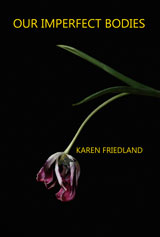 Our Imperfect Bodies by Karen Friedland
Our Imperfect Bodies by Karen Friedland
Červená Barva Press, 2026Once a nonprofit grant writer by trade, Karen had poems published in the Lily Poetry Review, Nixes Mate Review, One Art, and others. She was twice nominated for a Pushcart Prize. Her previous books were Places That Are Gone (Nixes Mate Books) and Tales from the Teacup Palace (Červená Barva Press). Karen lived in the West Roxbury neighborhood of Boston with her husband, two dogs and a cat. She was diagnosed with ovarian cancer in November 2021, and died on April 14, 2024.
"I was diagnosed with ovarian cancer in November 2021, two days before my 58th birthday. I recurred only a month or two after 'frontline,' about a year later, rendering me incurable and inoperable, and have been in continuous chemo treatment ever since. Having terminal cancer has been a daily exercise in searching for and finding meaning, beauty, kindness and even hope amidst the brutality of a deadly diagnosis. Poetry helps me reflect on, process and share this experience."
—Karen Friedland
"With grace and courage and style, Karen Friedland brings us along on her cancer journey; urging us to look at the world as she does, through eyes that see the joyful sparkling of life in every gratitude-wrapped moment. Whether she's walking her beloved dogs, or sitting in bed with pen and paper, she glories in being on this side of the sod. Indeed, these poems about dying are really poems about living. I miss her, but I am happier for having read them."
—Robin Stratton, author of Some Have Gone and Some Remain"Some days, / the warmth- / every sensation- / is so beautiful . . . . I can hear Karen Friedland saying these words. We're driving in my car on a hot July day. The sun is strong and the road glimmers. I can see her, in my rearview mirror, as we chat about our cats and politics. As I read Karen's posthumous collection, Our Imperfect Bodies, I think of the grace and honesty she displayed, allowing us all on her journey, through her constellations of cancers. And though she rendered this to us in her poetry, she also traveled on the knife-edge of hope and terror. Her poems are wild and kind and funny; all words I'd used to describe this amazing poet. I don't want to get cocky / in my aliveness- she writes, and who can't relate to this? I will miss Karen Friedland, and feel so honored to have called her my friend, for my moments with her trapped in amber. I am grateful for Karen's poetry, for her words she left behind, too. / Little brightly colored shards, / breadcrumbs. We can follow her voice, with our imperfect bodies, we can hear her poetry."
—Jennifer Martelli, author of The Queen of QueensCover photo: "A Wilting Flower with a Black Background" by Ksenia Chernaya
$18.00 | ISBN: 978-1-950063-53-6 | 94 Pages
New Release: GODS of UNFINISHED BUSINESS by Nina Kossman
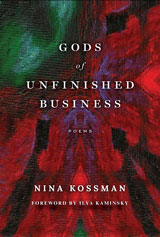 GODS of UNFINISHED BUSINESS
GODS of UNFINISHED BUSINESS
Poems on History Transformed into Myth by Nina Kossman
Červená Barva Press, 2025-
Nina Kossman's ten books include three volumes of poetry, two volumes of short prose in Russian and one in English, an anthology she edited for Oxford University Press, two volumes of translations of Marina Tsvetaeva's poetry, and a novel. Her English-language work has appeared in over ninety magazines and anthologies and has been translated into twelve languages. Her plays have been produced in the US, the UK, and Australia. Her work in her native language, Russian, was published in Russian-language literary magazines. She received grants from the Onassis Foundation, the Foundation for Hellenic Culture, a NEA fellowship, and the UNESCO/PEN Short Story Award. She lives in New York where she edits EastWest Literary Forum, a bilingual literary journal.
"When the mythological and personal meet, something transforms for this reader; perhaps that very "semblance of meaning in a meaningless world" comes to the surface. What is that meaning, you might ask. Perhaps it is awareness of how one isn't alone, after all, and has never been alone on this planet, despite what humanity’s so-called "progress" seems so intent to insist on."
$18.00 | ISBN: 978-1-950063-64-2 | 121 Pages
—Ilya Kaminsky
New Release: CROSSING THE LINE by Andrey Gritsman
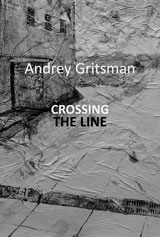 CROSSING THE LINE by Andrey Gritsman
CROSSING THE LINE by Andrey Gritsman
Červená Barva Press, 2025-
Andrey Gritsman, came to the US from Russia in 1981. He is a physician, poet and essayist, writes in two languages. He has been nominated for the Pushcart Prize several times and shortlisted for PSA Poetry Prize. Poems, essays, and short stories have appeared in many journals including New Orleans Review, Notre Dame Review, and Denver Quarterly, anthologized and translated into several European languages. He authored fifteen books of poetry and prose in both languages. He edits international poetry magazine Interpoezia (www.interpoezia.org).
Previous collections from Červená Barva Press: Live Lanscape and Family Chronicles.
www.andreygritsman.com
On CROSSING THE LINE
by Andrey Gritsman"From a certain point onward there is no longer any turning back. That is the point that must be reached."
"A book should serve as the ax for the frozen sea within us."
These are quotes from Franz Kafka, who is the most important poet for the author of this book. In this collection, the author tries to reach that point, to approach the line. Nobody knows where this point is and at what moment there is no turning back. The collection mostly includes poems of the last ten years or so which, in metaphorical forms approach above mentioned point. Some of the texts are prose poems that open new possibilities of language and metaphor."...poetics explores meanings and mysteries of human memory. But here, in Crossing the Line, I also get a sense of clarity, as if one is writing about final things as if the perspective of a foreign language gives one a distance that allows one to see things with precision that is almost eerie. Yes, there isn't just a welcome strangeness here (as is often the case with writers who work in a foreign language), there is also a kind of wisdom which comes from the experience of crossing that line..."
—Ilya KaminskyCover design: Asya Dodina
$18.00 | ISBN: 978-1-950063-87-1 | 86 Pages
The cover features the work by Asya Dodina and Slava Polishchuk Exit XVIII from the Exits and Corners series.
New Release: Blood Moon by Carol Dine
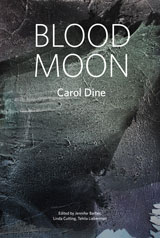 Blood Moon by Carol Dine
Blood Moon by Carol Dine
Edited by Jennifer Barber, Linda Cutting, Tehila Lieberman
Červená Barva Press, 2025-
Carol Dine was a celebrated poet, essayist, and memoirist. Art critic and author John Berger wrote of Dine's Van Gogh in Poems (Bitter Oleander Press, 2009), "Her observation of [Van Gogh's] drawings equals his observation of what he was drawing." Dine read from the book at the Van Gogh Museum, Amsterdam, and the Royal Academy of Arts, London. Her memoir, Places in the Bone (Rutgers University Press, 2005), which combines prose and poetry, deals with the redemptive power of art. Her poems appeared in numerous literary magazines, including Aesthetica Creative Arts Annual (U.K.), Bitter Oleander, Boulevard, Inkwell, Lilith, and Salamander, as well as within the anthologies After Shocks: Poetry of Recovery and Poems Against War: Bending Toward Justice.
Dine received a grant from the Barbara Deming Memorial Fund and the Sword of Hope from the American Cancer Society. She lived in Brookline and she taught writing at Suffolk University and the Massachusetts College of Art & Design.
In addition to Van Gogh in Poems and Places in the Bone, her previous books include Naming the Sky, Trying to Understand the Lunar Eclipse, and Orange Night.
Blood Moon explores twentieth and twenty-first century history through the stories of women who acted heroically under the most extreme circumstances, at great personal danger, during wartime and times of political oppression. It also focuses on the lives of women artists who documented the violence of their times through their art. The author drew on many memoirs in the writing of this collection, and the poems are both powerful and redemptive.
Dine's poems about women in extremis are pressed and compacted like diamonds. Her ability to empathize so completely with brave women who suffered terribly, in wartime, from the never-ending human appetite for cruelty, moved me profoundly. I have read Blood Moon over and over, and in my opinion, there is true greatness here. This volume of poetry surely deserves a place in the canon.
—Michael Sandle, British sculptor and artistCarol Dine's poetry has always engaged. Immersed in her subjects, committed to their individual lives as humans, her language had to pursue, with deep compassion and trust, a full understanding of what it means to suffer and sometimes not survive life's unexpected consequences. We can be thankful for the path she opened up for us and the work she left behind so we, too, could observe the lives portrayed in Blood Moon.
—Paul B. Roth, Editor, The Bitter Oleander PressCover Image: SoHyun Bae, Jasper Lake: Wings, 2011, rice paper and pure pigment on canvas, 200 x 150 cm
$18.00 | ISBN: 978-1-950063-96-3 | 82 Pages
New Release: SOME DISTANT PIN OF LIGHT
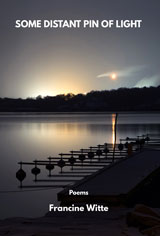 SOME DISTANT PIN OF LIGHT by Francine Witte
SOME DISTANT PIN OF LIGHT by Francine Witte
Červená Barva Press, 2025-
Francine Witte is an award-winning poet, flash fiction writer, and playwright. She is the author of 12 books of poetry and flash fiction and her work has appeared in numerous journals and anthologies. She is a native New Yorker and attends and produces poetry events in the vibrant NYC scene. She is the co-host and co-curator of the online reading, The Prose Garden. She is the flash fiction editor for FLASH BOULEVARD and South Florida Poetry Journal. A former high school English teacher, she now leads writing prompt sessions on zoom. Witte holds an MFA in Creative Writing/Poetry from Vermont College and an MA from SUNY Binghamton. Visit her website at francinewitte.com.
Francine Witte newest poetry collection Some Distant Pin of Light is an exploration of life's fleeting moments, capturing the essence of human emotion with lyrical precision. Her poems delve into themes of love, loss, and the passage of time, blending vivid imagery with evocative language. Each piece is a snapshot of everyday experiences, transformed into profound reflections on the human condition. As with her previous collections, Café Crazy and The Theory of Flesh, these pages are filled with lost lovers, nostalgic family portraits, and her deep concern for the environment. Witte's keen observational skills and masterful use of brevity create a tapestry of interconnected vignettes that resonate deeply with readers.
Gregor Samsa woke up as a huge insect in a bourgeois bed, struggling to make sense of what has happened to him and what he can do about it. Among her many story-telling bursts of brilliance, Francine Witte contemporizes the Kafkaesque shock of being slapped in the existential face, offering up modern perplexities that are familiar as they are strange. A woman finds herself among many middle-aged women in a grocery shop, 'wheeling their girliness around in a shopping carts... (to the) burst of corn pops and leprechauns winking.' A man finds himself trapped in an oceanic human wave, aching to break past his 'beach-locked future' and make connection to the 'distant pin of light' from which he came. There's humor and metaphorical pathos aplenty in this fine collection — from men who can play themselves backwards, to prove that Paul is dead, to a self-declared 'map of me' that would drive you into a lake if you tried to navigate by it. This is smart stuff, New York City smart, memorably smart. Tales told to the tune of the underground thrum which goes beyond the play of good story-telling to a place of reawakening. These are poems to match the beat of a reader's heart — the heart which is 'the acorn inside the tree you have turned into.'
—George Wallace, Walt Whitman BirthplaceThe poems in Some Distant Pin of Light consider how to exist, even thrive, in a world where "the news gets worse/each day." Witte's speakers contemplate the past even as they look forward, look up and consider the sun, the titular "distant pin of light," imagine finally that "billions of miles/away, maybe someone is wishing on it,/wishing for a last desperate chance at love." With her trademark, vivid imagery, Witte captures both the intimate details of everyday life and the cosmic scale of existence, grounding ontological questions in concrete experiences. This is one stellar collection by a writer at the height of her powers.
—Sarah Freligh, author of Sad MathThe book starts out with a Map of Me, "Let’s start by saying this isn’t//A map you'd fold up in a glove box//or pull up on a GPS" guiding the reader into a room of observant wit, which takes center stage... These poems bring the reader wandering through a hushed room of the past: each poem is a relic of art that stands still in time. To observe them in their resting places, a past we cannot change, ends with hope: the last piece, turns our attention to the future in Our Star, where a billion mile lover, which doubles for a wave, "aching to break past his own beach-locked//future, finally able to get whatever he could//wish for on some distant pin of light." This collection of poetry is a true joy to explore.
$18.00 | ISBN: 978-1-950063-90-1 | 71 Pages
—Jennifer Juneau, author of More Than Moon
New Release: The Many Lives of Cathouse Farm: Tales of a Rural Brothel by bg Thurston
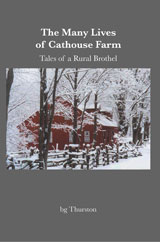 The Many Lives of Cathouse Farm: Tales of a Rural Brothel
The Many Lives of Cathouse Farm: Tales of a Rural Brothel
by bg Thurston
Červená Barva Press, 2025-
bg Thurston lives with her husband on a sheep farm in Warwick, Massachusetts. After a career in computers and finance, she received her MFA in Poetry from Vermont College in 2002. She has taught poetry courses at Lasell Village, online for Vermont College, and conducts poetry workshops. Her first book, Saving the Lamb, by Finishing Line Press was a Massachusetts Book Awards highly recommended reading choice. Her second book, Nightwalking, was released by Haleys in 2011. Her third book, The Many Lives of Cathouse Farm/Tales of a Rural Brothel, is the culmination of a decade of historical research about her 1770's farmhouse.
The Many Lives of Cathouse Farm/Tales of a Rural Brothel is the culmination of a decade of research into the 250-year history about the farm where the author has lived since 2000. The book contains historical facts and poetic musings about many of the inhabitants who have lived on the farm from 1770 to present. The small farmhouse is the original cape dwelling built in 1770 by two Revolutionary War soldiers from the Weeks Family and farmed by four subsequent generations. During the Prohibition era, the farmhouse was maintained as part of a rural brothel that continued to operate until the late 1940's. Presently Cathouse Farm is also home to sheep, chickens, dogs, and of course, many cats.
The Many Lives of Cathouse Farm — Tales of a Rural Brothel, a finely-crafted collection of poems giving voice to a 255-year-old farmhouse and its surprising history—and to the people and animals who have lived there since before the American Revolution. "We search all our days / for a place called home," Thurston observes, charting in meditative and musical tones the universal human need for rootedness and connection. In tracing the loves and losses of those who came before us—and our own part in the great drama—she reminds us that even if our name be recorded at the Registry of Deeds, we are really no more than caretakers, tenants, and that love grows in the soil and souls of those who paint clapboards and trim, plant flowers and water them, wander the pastures and woods of the world.
—David Thoreen, Assumption UniversityThis compelling and singular collection is an expert weaving of history and poetry. The story of Cathouse Farm begins when poet bg Thurston spies "a small red farmhouse nestled behind tall sugar maples" which beckons her with its For Sale sign. Images presented throughout these pages elucidate Thurston's narrative of dwelling and landscape. We listen as the very house itself speaks in "Sister Houses, 1771" and "The Ruined House" and hear occupants, such as Sarah Weeks, who "labored long for all / these years on this forlorn farm, / birthed and buried our babies- / once within the same week." Section 3 links us to Prohibition-era owner George F. Rivers, who "set the property up as a speakeasy and rural brothel" and inspired persona poems that do not look away from these women's struggles. This book is a significant and fascinating accomplishment, full of curiosity, empathy and respect for the ghostly inhabitants of Cathouse Farm.
—Judith Ferrara, A Feast of Losses: Yetta Dine and Her Son, Stanley KunitzThe 1700's house speaks in tongues. Laths, horsehair plaster, hand-forged nails, wide pine boards; it holds hardscrabble lives filled with sounds of sweeping, smells of bread and woodsmoke, cries of children. bg Thurston, in The Many Lives of Cathouse Farm — Tales of a Rural Brothel, listens and gives voice to those who have lived and died in this house, her home. As Winfield Scott Weeks, of the poem "The Lost Boy," knows: "Some souls stay tethered to a place." bg understands that "Loss / is a language all its own." but life continues and, in this life, we are joined with those who have died before us, like Billie, "the last lady." In "Gardening with Billie," Thurston writes: "We are joined by what we plant, hands / dug deep in this soil that grew crops / and cows for two hundred years." Their lives restored through careful research, those who opened the doors to Cathouse Farm welcome us home.
$18.00 | ISBN: 978-1-950063-33-8 | 66 Pages
—Susan Roney O’Brien, Thira and Bone Circle
New Release: WordinEdgeWise by Brad Rose
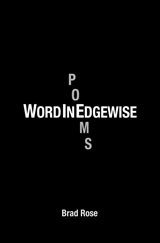 WordinEdgeWise by Brad Rose
WordinEdgeWise by Brad Rose
Červená Barva Press, 2024Brad Rose was born and raised in Los Angeles, and lives in Boston. He is the author of five collections of poetry and flash fiction: Lucky Animals, No. Wait. I Can Explain, Pink X-Ray, de/tonations, and Momentary Turbulence. Seven times nominated for a Pushcart Prize and three times nominated for the Best of the Net Anthology, Brad's poetry and fiction have appeared in Los Angeles Times, The American Journal of Poetry, New York Quarterly, Puerto del Sol, Clockhouse, Folio, Cloudbank, Baltimore Review, 45th Parallel, Best Microfiction 2019, Lunch Ticket, Sequestrum, Unbroken, Right Hand Pointing, and other publications. Brad is also the author of seven poetry chapbooks, among them Democracy of Secrets, Collateral, An Evil Twin is Always in Good Company, and Funny You Should Ask. His website and blog can be found at bradrosepoetry.com.
The poems and microfiction of WordinEdgeWise, are predominately surreal and playful. Many are unified by the quirky voices of hardscrabble speakers who have experienced social and economic turmoil, and a resulting psychic instability. Via interior monologues and uncanny dialogues, speakers take liberties with standard colloquial speech, invent unusual similes, and employ unconventional variants of American idioms. They also offer startling insights and unexpected moments of wisdom. Both in spite of, and because of, speakers' peculiarities, the poems and microfiction of No. Wait. I Can Explain. seek to offer keen, if unsettling, glimpses into the darker—and often darkly humorous—underlying dimensions of contemporary American life.
Brad Rose's WordinEdgewise displays the madcap features that readers have come to relish in his work—fast-talking, unreliable narrators and surreal situations depicted with brittle sympathy and manic humor. When it comes to prose poetry, Brad Rose plays, to borrow his own phrase, "first violin in the orchestra of the absurd."
—Howie Good, author of Famous Long Ago and The Bad News FirstWordinEdgewise, poet Brad Rose's most recent collection, is as high energy as the title advertises. This language-driven tour de force leaves the reader breathless, from line to line and poem to poem, as the speaker explicates on everything from blind dates to mobile homes, from lightning to ghosts. In this world, blind dates are lightning and mobile homes and ghosts, as the author makes expert use of such literary devices as chiasmus and zeugma to bring it all together. Each poem is a glittering tautology, each line disparate in its sameness. The pace of this book is addicting, and you will pick it up over and over again to the delight of your senses.
—Ralph Pennel, author of A World Less Perfect for Dying In, and fiction editor of Midway JournalBrad Rose: master of the synaptic leap. He unearths suppressed premises (hidden in stark sight thanks to our jones for consensus reality), leading us to the inevitable across no matter how many unexpected ceiling tiles. Multiple vectors are at subcutaneous work here, clause by clause. These paragraphs are like incognito erasure poems, extended family trees with insoluble fan charts. "When I was counting backward in dog years, the judge sentenced my jury to another week of hard labor." Yes, ordinary life is exactly like this. We just need reminders.
—David P. Miller, author of Bend in the Stair and Sprawled AsleepCover: Hannah Rose
$19.95 | ISBN: 978-1-950063-69-7 | 108 Pages
New Release: In the Absence of Birds by Ruth C. Chad
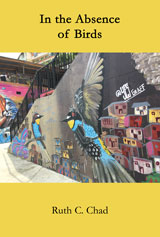 In the Absence of Birds by Ruth C. Chad
In the Absence of Birds by Ruth C. Chad
Červená Barva Press, 2024Ruth C. Chad is a psychologist who lives and works in the Boston area. Her poems have appeared in the Aurorean, Connection, Psychoanalytic Couple and Family Institute of New England, Constellations, Ibbetson Street, Montreal Poems, Muddy River Poetry Review, Lily Poetry Review, Amethyst Poetry Review, Writing in a Woman's Voice, and others. Her chapbook, "The Sound of Angels," was published by Červená Barva Press in 2017. Ruth was nominated for a Pushcart prize in 2021.
The lyrical and powerful poetry in this book addresses the complexity of family life, grief, loneliness and communion. Many of the poems convey the poet’s urgency to notice and appreciate the richness of nature and the sadness of watching its demise. "In the Absence of Birds" brims with personal and universal poetry, offering insight and solace.
Ruth Chad's In The Absence of Birds relates on many levels. It cuts to the chase. She is fragile yet blunt, as she draws us into her world with poetry that exudes emotion and expresses her lamentations. With the keen sensitivity of a psychologist she delves beneath the surface of family life, death and nature. She opens herself to the reader in the manner of other fine women poets: Plath, Oliver and Dove. Ruth Chad is a poet worth careful reading.
—Zvi A. Sesling, Author of War Zones and the Lynching of Leo FrankIn the Absence of Birds is a breakthrough work, imbued with a relevance far beyond the usual audience for 21st century poetry. The poet's commitment to authenticity shines through in her creative approach to grief; her persistent theme of nature-as-solace; and a gentle, dark wit that finds something enviable in wildness. If there is an opposite of "overwrought," that is Ruth Chad's style: her beautiful, clean syntax and simple lines create a welcoming space, inviting the reader to linger, and fill in the spaces with feeling.
—Eric Hyett, Poet and TranslatorRuth Chad chooses her words with great care to create gem-like poems—although gems are cool and hard, her poems are warm and full of heart. They are also full of sensual detail, ranging across life experiences from peeling a ripe plum to watching her mother fade away in a nursing home. Whatever the situation, simple or profound, Ruth draws us right into it with her, generously sharing what she sees, hears, smells, tastes and feels, compelling us to experience it with her. In the Absence of Birds is a feast.
—Lawrence Kessenich, Winner of Ireland's Strokestown International Poetry PrizeCover Image: Ruth Chad
$19.95 | ISBN: 978-1-950063-98-7 | 102 Pages
New Release: WINDOW OF BABEL by Borche Panov
Translated from the Macedonian by Daniela Andonovska-Trajkovska
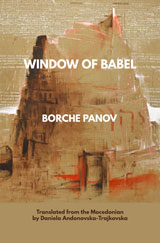 WINDOW OF BABEL by Borche Panov
WINDOW OF BABEL by Borche Panov
Translated from the Macedonian by Daniela Andonovska-Trajkovska
Červená Barva Press, 2024-
Republic of North Macedonia
Borche Panov was born on September 27, 1961 in Radovish, Republic of North Macedonia. He graduated from the "Sts. Cyril and Methodius" University of Skopje, Faculty of Filology in the filed of Macedonian and South Slavic Languages in 1986. Panov has been a member of the Macedonian Writers' Association since 1998. He published 15 poetry books and 8 plays in Macedonian language. He has also published poetry books in other languages: "Hematite particles" (2016 - in Macedonian and Bulgarian and "Photostiheza" 2019, Bulgaria), "Vdah" in Slovenian (2017, Slovenia), "Shaving balloon" in Serbian (2018, Serbia), "Blood that juggles 8000 poetic thoughts" in Croatian (2021, Croatia), "Underground Apple" in Arabic language (United Arab Emirates, 2021), "Underground apple" in English (Netherlands, 2021), "Dandelion Cadence" in English (co-author, India, 2021), "Sculpture of Breathing" in Italian and English (2022, Italy), "The Morning Line" in Romanian (2023, Romania). His poetry has been translated into 40 languages and published all around the world. He received many literary awards such as the following: Premio Mondiale "Tulliola-Renato Filippelli" in Italy for his book "Shaving the Balloon" (2021), "City of Galateo- Antonio De Ferraris" (Italy, Rome, 2021), Premio "Le Occasioni" in Italy, the Sahito World Literary Award in 2021, Predrag Matvejevic in Croatia for his book "Shaving Balloon," Naji Niman Award in 2022. He has edited many poetry books and poetry anthologies and has launched many authors and books published in Macedonia. He also translates poetry from Macedonian into Serbian and Croatian language and vice versa. Panov works as a Counselor for Culture and Education at the Municipality of Radovish, and he is also a president of the program board of the "International Karamanov's Poetry Festival" for more than 20 years.ABOUT THE TRANSLATOR
Daniela Andonovska-Trajkovska (1979, Bitola, Republic of North Macedonia) is a poetess, author, scientist, editor in chief of two literary magazines in North Macedonia, literary critic, doctor of pedagogy, university professor at the University "Kliment Ohridski" Bitola (Faculty of Education), a member of the Macedonian Writers' Association; Macedonian Science Society - Bitola; Slavic Academy for Literature and Art in Varna - Bulgaria, and Bitola Literary Circle. She was president of the Macedonian Science Society Editorial Council and now - a head of the Linguistics and Literature Department at the Macedonian Science Society - Bitola. She has published two books of stories, 9 poetry books, one book for children, a book of literary criticism in Macedonian and 3 academic and scientific books that are part of the curriculum at the university where she works, and over 100 scientific articles. She has also 6 poetry books published in English, Italian, Arabic and Romanian language in India, United Arab Emirates, Italy, and Romania. She has also published her translations from English into Macedonian and vice versa in North Macedonia, Italy and Netherland (7 poetry books and many articles). She has won several important awards for literature: "Krste Chachanski" (2018); "Karamanov' for "Electronic Blood" (2019); Macedonian Literary Avant-garde for "House of Contrasts" (2020); "Abduvali Qutbiddin" (2020, Uzbekistan); Premio Mondiale "Tulliola-Renato Filippelli" in Italy for "Electronic Blood" (2021); Award of excellence "City of Galateo - Antonio De Ferrariis" (Italy); Award for Literary Criticism in 2022, Poetry Award "Dritero Agioli" (Albania, 2023); Poetry Award "Mihai Eminescu," a Golden Medal and a recognition as ambassador of culture in Romania by the Mihai Eminescu Academy (2023) and "Aco Shopov" for poetry (the most important national poetry prize by Macedonian Writers' Association in 2021). Her poetry has been translated and published into more than 40 world languages.Cover Art: "Tower of Babel" by Witold Zakrzewski
$21.95 | ISBN: 978-1-950063-83-3 | 118 Pages
New Release: HOUSE OF CONTRASTS by Daniela Andonovska-Trajkovska
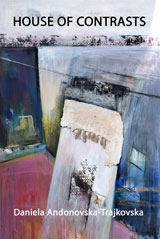 HOUSE OF CONTRASTS by Daniela Andonovska-Trajkovska
HOUSE OF CONTRASTS by Daniela Andonovska-Trajkovska
Červená Barva Press, 2024-
Daniela Andonovska-Trajkovska (1979, Bitola, North Macedonia) holds PhD in Education. She is an awarded poetess, writer, scientist, literary critic, translator, editor, full professor at the University "St. Kliment Ohridski" in Bitola, co-founder of the Center for Literature, Art, Culture, Rhetoric and Language at the Faculty of Education in Bitola, a member of the Macedonian Writers' Association, Slavic Academy for Literature and Art in Varna, and a head of the Literature and Linguistic Department (Macedonian Science Society in Bitola). She has authored 16 books in Macedonian (poetry, prose, literary criticism, scientific books), 6 poetry books in English, Arabic, Italian, and 9 poetry books of renowned world poets in her translation. Her poetry is translated into 40 languages.
DESCRIPTION BY BORCHE PANOV, literary critic, poet, editor:
"In the poetry book "House of Contrasts" by Daniela Andonovska-Trajkovska somewhere at the beginning we can read that "a tear without metaphysics has no aesthetics." This discourse completely determines the poetics of this very well-known and notorious Macedonian poetess. She is awake in each word and in this book, she creates her poetic alphabet by freezing the moment and by claiming that her alphabet was born on the knife with which the umbilical cord was cut. Although, she writes about things that are not so perfect or beautiful, such as the pain and the loss, she is always on the bright side by using the poem as the most subtle defense of life. At the same time, she stands in front of the vertical mirror of love and she confronts us with the naked truth by showing us the finest lines on our faces from which time rises like a wall between us and the world. She makes us to be aware that we live in a room of the autistic time, and even when insomnia speaks loudly, no one can hear the fractures of the day that assembles in us piece by piece like in an X-ray image, and no one can see our nakedness and our vulnerability. We hide behind the image that we show to the world wanting to be accepted and appreciated. In the poetry book "House of Contrasts" we see for a moment the world in which every night, humans made of paper return to the keyhole of their houses cursing the day that does not last long enough so they could find themselves. But that is precisely why the day in this book lasts long enough to see how the poetess Daniela Andonovska-Trajkovska shows us that the paramecium of the meaning develops into a multicellular organism breathing with human lungs in the chest of the readers."DESCRIPTION BY SLAVICA GADZOVA SVIDERSKA, PhD, literary critic, poetess, editor, publisher:
"The poetry of Daniela Andonovska-Trajkovska is powerful and striking example of Écriture feminine, which is essentially atypical and non-classical, because the prism of this author goes beyond the classical framework of the so-called writing from the womb. Searching for the perfect and most appropriate way of expressing her view and thinking about the world, the author playfully moves between the forms and ways of poetic expression: from short elliptical poems reduced to simple but semantically layered poetic images, through lyrical poems that are thought provoking, to poems where the verse hybridizes with the narrative tone. At the beginning, the lyrical subject searches for itself (in the world, through the Other and in the Other, in the rational and the irrational, in the real and the oneiric), and the most appropriate form to express this search is the paradox. Furthermore, the search is an endless attempt to find harmony and balance amidst the noise of a world that is becoming increasingly chaotic, illogical, and sometimes nightmarishly phantasmagoric. At the end the search for the metaphysical vertical takes place, a search for the eternal, for the Absolute, for God. The decadence, the downward movement and the erosion of the values are constantly semantically emphasized: the images are broken, the words are crashed, the breathing is trapped, the woman is a doll with winded up steps, the face is a salt mosaic, ethics is "Cain-ethics," that is, the world is "on red alert." Nevertheless, the lyrical subject knows how to find meaning even in the era of meaninglessness, living its search for itself, for a perfect understanding with the Other, for a home without contrasts and for the Absolute. Andonovska-Trajkovska's poetry brings fresh and original voice that carries the archetypal one, thick semantics, explosions of meanings, feminine wisdom and aesthetics that ennoble the "collapsing world" so that it does not collapse. For that reason, the poetry book "House of Contrasts" deserves a special place in the contemporary world literature."
"Daniela Andonovska-Trajkovska's poetry brings fresh and original voice that carries the archetypal one, thick semantics, explosions of meanings, feminine wisdom and aesthetics that ennoble the "collapsing world" so that it does not collapse. For that reason, the poetry book "House of Contrasts" deserves a special place in the contemporary world literature."
—Slavica Gadzova Sviderska, PhD, literary critic, scholar, poetess, editor, publisher"In "House of Contrasts" by Daniela Andonovska-Trajkovska the silence is not silent, but dramatical and loud. It seems that here is a compromise and an awareness that the antonymies are compatible contradictions like the day and the night, the sky and the earth, the angel and the devil, the cosmos and the chaos. Like ying and yang. Like life."
—Jordan Stojanoski, PhD, literary critic, university professor of literatureCover art: Ljupka Galazkava-silev
$19.95 | ISBN: 978-1-950063-84-0 | 92 Pages
New Release: The Unfinished Family Poems Barbara E. Murphy
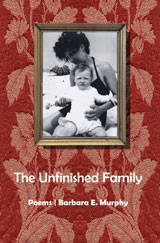 The Unfinished Family Poems Barbara E. Murphy
The Unfinished Family Poems Barbara E. Murphy
Červená Barva Press, 2024-
Barbara E. Murphy's poetry has appeared or is forthcoming in journals including Green Mountains Review, Threepenny Review, Barrow Street, and New England Review. She is a recipient of a Vermont Arts Council Fellowship and twice-nominated for a Pushcart Prize. Murphy served as a faculty member at the New England Young Writers Conference and is a board member of Sundog Poetry. A collection of her poems, Almost Too Much was published by ČervenÁ Barva Press in 2015. Her essays and reviews have been published in several venues including The New York Times, Plume Poetry, Full Grown People, and Green Mountains Review. She lives and writes in Burlington Vermont.
Description:
Barbara E. Murphy's compelling The Unfinished Family comes to terms with the notion that families can ever be "finished.' The poems in this brave and provocative collection explore the impulses of duty and loyalty, love and fear and compulsion for perfection as the speaker comes to embrace the mistakes that are inevitable in every family. These poems are as honest as they are hopeful in their insistence that we return again and again to the messy work of being with our people and starting again.In The Unfinished Family, Barbara Murphy offers a master class on the compressed narrative and the withheld detail. Whether she turns a discerning, critical eye on her birth-family—a troubled father, a mother born into "the wrong era, wrong marriage, wrong life"—or her own made family she brings a wealth of memorable phrases, smart insights, and emotional yearning as well as an empathetic eye and forgiving mind that "lets a little light in too."
—Neil Shepard, author of The Book of FailuresPart of our human beauty is that we live in a state of being unfinished. This is why memory is so powerful. Barbara Murphy's exquisite, beautiful poems are a series of finely etched portraits that enact how our moments accumulate into meaning as they move toward another world we will never know yet help create. Muscular, lyric language and an agile form makes these powerful poems tap us on the shoulder and awaken us from our delirium and into the transcendent. Murphy's poems show us how personal history and time intersect leaving behind a memory that never vanishes. These poems claim life and life claims these poems. This book is a treasure.
—Elizabeth A.I. Powell, author of AtomizerBarbara Murphy's The Unfinished Family is haunted by the archetypal ghost of a perfect family against which the speaker holds memories—brilliantly precise and unequivocally rendered—and finds them wanting. Yet, the honesty, bravery and fidelity with which she acknowledges her disappointments burnish these poems with love, humor and pathos. We should read her.
—Nancy Mitchell, author of The Out of Body ShopPhoto: Karen Pike
$18.00 | ISBN: 978-1-950063-92-5 | 58 Pages
New Release: Lunch in Chinatown poems by Mary Bonina
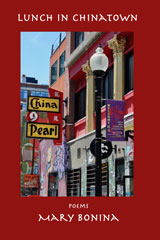 Lunch in Chinatown poems by Mary Bonina
Lunch in Chinatown poems by Mary Bonina
Červená Barva Press, 2024A fellow of the Virginia Center for the Creative Arts, Mary Bonina was finalist for the Goldfarb Fellowship and awarded several residencies, including one at the VCCA retreat, Moulin a Nef, in Auvillar, France. Previous publications include My Father's Eyes: A Memoir and two poetry collections—Living Proof and Clear Eye Tea, all from ČervenÁ Barva Press. Her poems and essays have appeared in The Lowell Review, Hanging Loose, Poets and Writers, Salamander, Mom Egg, Ovunque Siamo, Adelaide, and many other journals, and her work has been included in several anthologies, including Entering The Real World, VCCA Poets on Mt. San Angelo from Wavertree Press. Her completed novel, My Way Home, is on submission to publishers. Her poem "Drift" won Boston Contemporary Authors/Urban Arts prize and is carved in a granite monolith, a permanent public art installation in the City. Bonina has collaborated with composers of arts songs and new music, a sculptor, and her work has been translated into Japanese. She received a full fellowship from the Vermont Studio Center. A voiceover artist, she has recorded fiction, non-fiction, and poetry for blind readers. She offers classes, workshops, conference presentation, and individual coaching for writers. Bonina has been a long-time member of the Writers Room of Boston, where she served on the Board for more than a decade. She earned her M.F.A. in Fiction Writing from the Program for Writers at Warren Wilson College. She lives in Cambridge, Massachusetts. Her website is www.marybonina.com
Description:
New from Mary Bonina—and particularly timely—LUNCH IN CHINATOWN is a poetry collection inspired by the poet's work teaching the English language to immigrants from Haiti, China, Poland and other European countries, Central, Latin American, and African nations, and others. The poems highlight, as Patrick Sylvain, Professor of Global Studies, states in his introduction, "the universal nature of human connection, understanding, and a sense of shared humanity in the face of cultural and linguistic differences" Bonina sees her classes as offering survival skills, and compares her necessarily improvised lessons to the act of writing a poem, "that familiar process of one word, one thought, leading to another, often unanticipated one, recognizing endless possibilities, and finally settling on the right one in a moment of revelation."In this vivid, wonderfully empathetic book of poems, Lunch In Chinatown, Mary Bonina is an inquisitive seeker, not only set to teach English but also to learn about the lives of her immigrant students. There’s the student who worked with the very ill and the job did not allow wearing jewelry “without that ring on her finger/her hand felt too light, made her think/that she wasn’t in the world anymore,” another puzzled over the same abbreviation for Saint and Street, a young man recalled his young love in Port au Prince. In her masterful telling Bonina has given us glimpses of their worlds, both before and after the immigration. These poems celebrate the common human language, of disappointments and loss, aspirations and love, and also how poetry and the resolve of students and their teacher can make all the difference in the world.
—Pui Ying Wong, author of Fanling in OctoberIn Lunch in Chinatown "Mary Bonina's eloquent verses breathe life into the seemingly mundane, turning lunchtime into an exploration of the extraordinary moments hidden within our daily routines."
from the Introduction
Patrick Sylvain, P.H.D., M.F.A
Author, Unfinished Dreams/Rev San Bout (bilingual poetry)Cover photo: Abbi Sauro
$16.00 | ISBN: 978-1-950063-88-8 | 27 Pages
Author photo: Christopher Collyn
New Release: MARBLE DUST Poems by Gary Metras
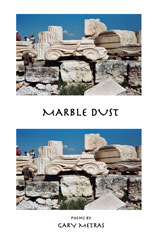 MARBLE DUST Poems by Gary Metras
MARBLE DUST Poems by Gary Metras
Červená Barva Press, 2024-
Gary Metras was appointed the inaugural Poet Laureate of the City of Easthampton in 2018. His essays, reviews, and chiefly poems have appeared in hundreds of journals since the 1970s, including America, American Angler, Boston Review of Books, The Common, Connecticut Poetry Review, Gray's Sporting Journal, Poetry, Poetry East, Salzburg Poetry Review, and Yankee Magazine. He has taught high school English and college writing. A master letterpress printer, he ran Adastra Press for forty years, publishing poets from all over the country.
From Izmir, Turkey to Stonehenge, England, these are poems of adventure, revelation, and enlightenment. The history, mythology, and ruins of ancient Greece and Rome are newly experienced and newly interpreted for the modern reader. The lives and achievements of Francis d'Assisi, Michelangelo, Leonardo, Beethoven, John Keats, and Oscar Wilde are given new meaning, while a belly dancer, a butcher, a taxi driver, and a waiter and a waitress are elevated beyond their typically mundane jobs and lives. Join the author as he walks the Bridge of Sighs in Venice, rides a cable car up an Austrian alp, contemplates the paintings in the Sistine Chapel, a Christmas in Paris, lunches in the café atop the Euromast in Rotterdam, and so much more.
Marble Dust is like a travelogue in four parts. It is a paean of geography, actual, spiritual, historical, mythological as well as a special place in our collective hearts. From Greece to Italy and the rarified air and memories of mountains in Austria, Switzerland and the mysteries of Stonehenge. Marble Dust merges all these into a seamless literary tapestry. It also encompasses themes pertaining to art, artists, poets and architecture. This collection places the enraptured reader in the center of this journey as time bends backwards and forward. All places blend into the external and internal worlds. Poem after poem is replete with breathtaking imagery and proven mastery of the written word. Reading Marble Dust is a memorable, exhilarating and a highly recommended experience.
—Harris Gardner, Poetry Editor, Ibbetson Street, author of No Time for DeathCover photo: "Ionic column capital, 5th-4th century BCE, the Acropolis, Athens. Photo by the author."
$19.95 | ISBN: 978-1-950063-95-6 | 102 Pages
New Release: I REALLY LIKE LOVERS OF POETRY by Grzegorz Wróblewski
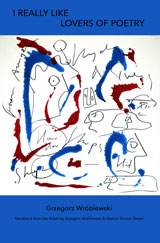 I REALLY LIKE LOVERS OF POETRY by Grzegorz Wróblewski
I REALLY LIKE LOVERS OF POETRY by Grzegorz Wróblewski
Translated from the Polish by Grzegorz Wróblewski & Marcus Silcock Slease
Červená Barva Press, 2024-
Grzegorz Wróblewski was born in 1962 in Gdansk and grew up in Warsaw. Since 1985 he has been living in Copenhagen. English translations of his work are available in Our Flying Objects (trans. Joel Leonard Katz, Rod Mengham, Malcolm Sinclair, Adam Zdrodowski, Equipage, 2007), A Marzipan Factory (trans. Adam Zdrodowski, Otoliths, 2010), Kopenhaga (trans. Piotr Gwiazda, Zephyr Press, 2013), Let's Go Back to the Mainland (trans. Agnieszka Pokojska, Červená Barva Press, 2014), Zero Visibility (trans. Piotr Gwiazda, Phoneme Media, 2017), Dear Beloved Humans (trans. Piotr Gwiazda, Lavender/Dialogos Books, 2023) Asemic writing book Shanty Town (Post-Asemic Press, 2022).
Marcus Silcock Slease is a (mostly) surreal-absurd writer from Portadown, N. Ireland. He is the author of Puppy (Beir Bua Press), Never Mind the Beasts (Dostoyevsky Wannabe), The Green Monk (Boiler House Press), and Play Yr Kardz Right (Dostoyevsky Wannabe), among others. His poetry has been translated into Polish and Danish and has appeared or is forthcoming in various magazines and anthologies, including: Tin House, Poetry, The Lincoln Review, Bath Magg, New World Writing, Tupelo Quarterly, and in the Best British Poetry series. He lives in Sitges, Spain. Find out more at: Never Mind the Beasts (www.nevermindthebeasts.com)
"I REALLY LIKE LOVERS OF POETRY" is the latest book of poetry by Grzegorz Wróblewski. The English versions of the poems are the author's work in collaboration with Marcus Silcock Slease. The author was born in Poland in 1962 and has lived in Copenhagen, Denmark, since 1985. Grzegorz Wróblewski is translated into many languages. The current book raises existential issues concerning the paradoxes of human functioning, loneliness and human isolation. The poetic works in this book are often minimalistic, devoid of the metaphorical structure typical of European lyric poetry. They may sometimes be associated with Zen poetry. The poems from the volume "I REALLY LIKE LOVERS OF POETRY" are also a criticism of the modern world full of consumerism. They try to draw the reader's attention to issues that are lost in a world full of ruthless materialism.
Polish writer and visual artist Grzegorz Wróblewski has written I Really Like Lovers of Poetry directly in English with assistance of his friend and fellow writer Marcus Slease. A translation, a collaboration, certainly an experiment, it is above all a collection of mordant parables about humans — and occasionally nonhumans too. A moralist at heart, like Bertolt Brecht, Wróblewski demystifies and clarifies: "Everyone is looking for the truth. / The only truth is the rumbling / of our stomachs."
—Piotr Gwiazda, translator of Dear Beloved Humans: Selected Poems by Grzegorz WróblewskiIn his latest book of poems, Grzegorz Wróblewski delivers what readers have always loved him for: his take on not just the personal, but the condition of human beings and all creatures (I would like to wake up someday/among people who respect both/wolves and pigs) in the often mysterious planet we live on. Sometimes the take is acerbic, sometimes the take has a dark absurdity to it, sometimes the take is full of genuine wit, sometimes the take has a forbearance of humanity that even surprises the poet, but at all times these poems ring true in their brilliance, even if a bit of hurt must be endured for posing those truths: Listen to the silence of heaven./You won’t understand any of it. But at least you’ll be closer/to the silent clouds./Closer to where you got here/by a mistake. But there's no mistaking Wróblewski's poetic gifts and the lovely rigor of his challenging mind.
—Tim Suermondt, author of A Doughnut And The Great Beauty Of The WorldCover art: "50 x 50 The Boys from Amager II" by Grzegorz Wróblewski
$16.00 | ISBN: 978-1-950063-93-2 | 38 Pages
New Release: The Chronicler of Indifference Poems translated from Arabic by by Hussam Jefee-Bahloul & Samantha Kostmayer-Sulaiman
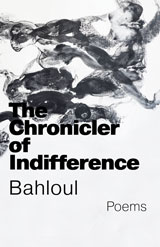 The Chronicler of Indifference Poems translated from Arabic by:
The Chronicler of Indifference Poems translated from Arabic by:
Hussam Jefee-Bahloul & Samantha Kostmayer-Sulaiman
Červená Barva Press, 2024-
Bahloul (A.k.a Hussam Jefee-Bahloul) is a poet, musician and psychiatrist. He was born in Syria in 1983 and currently practices and teaches at the University of Massachusetts Medical School. He writes poems and essays both in Arabic and English. He has two books of poetry published in Arabic, and has published essays in both languages. Bahloul is also a musician and songwriter. His project "Ta'sheeq" aimed at dovetailing the elements of poetry, music and visual arts together. The project toured many cities and performed around the US between 2015-2018. His current musical project Souq El-Jum3a (Friday Market) is a musical collective that aims at making original Arabic music keeping up the spirit of classical songs.
Samantha Kostmayer is a writer, editor, educator, and translator from New York City. She graduated from Columbia University, CUNY, and the American University in Cairo with degrees in history, forced migration, and law; Samantha is currently completing her Ph.D in philosophy. She is writing a volume of short stories and her translations have appeared in various literary journals and anthologies. Her poetry has appeared in English, Swedish, and Croatian.
"...What surprises me is the liberty in which he [Hussam] writes his poems; creating new images, shoving new vocabularies in the ancient dictionary of poetry...Not only a buffoon bird, but also pain, disappointments, sadness, and futureless horizons. Thank you Hussam for this fearlessness and sensitivity."
—Maram Al-Masri, acclaimed Syrian-French poet, author of (A red cherry on a white-tiled floor) (2003)"The opening line of the Arab Surrealist manifesto of 1975 proclaimed: “With disgust we shove aside the dregs of survival and the impoverished rational ideas which stuff the ash-can-heads of intellectuals.” While the author may or may not bear the direct or conscious influence of that movement begun in the 1930s, the tone and imagery of these eminently readable poems, ranging from the flippant to the wistful, with an updated pinch of post-modernist irony and self-referentiality thrown in, fashion poetry, and succeed in finding a universalism, out of the same rejection of the dual illusions of nationalism and rationalism."
—Alex Cigale, poet, editor, translator, lecturer in Russian Literature at CUNY-Queens CollegeCover art and design: Kevork Mourad (The Offering, 2015, ink on paper, 114 x 241 cm) by Khalil Younes
$18.95 | ISBN: 978-1-950063-85-7 | 80 Pages
New Release: POSTMORTEM SAY poems by Amanda Newell
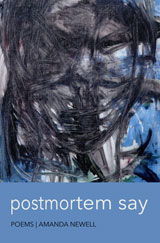 POSTMORTEM SAY poems by Amanda Newell
POSTMORTEM SAY poems by Amanda Newell
Červená Barva Press, 2024-
Amanda Newell is the author of I Will Pass Even to Acheron, a 2021 winner of the Rattle Chapbook Prize, and Fractured Light (Broadkill River Press), winner of the 2010 Dogfish Head Poetry Prize. Her poems have appeared in Bellevue Literary Review, Cimarron Review, Gargoyle, Rattle, Scoundrel Time, and elsewhere. A graduate of The MFA Program for Writers at Warren Wilson College, she has received scholarships from the Bread Loaf Writers' Conference and The Frost Place as well as a fellowship from the Virginia Center for the Creative Arts. She is an associate editor at Plume.
"Love and death, poetry's immortal themes, are interwoven throughout Amanda Newell's Postmortem Say. Death is everywhere—in the fields and forests, on darkened roads, in the delivery room—but there is also love, the kind that defies convention and outlasts death itself. These poems confront, without flinching, hard truths about what it means to be a woman, a mother, a wife, and a lover. Like "the clink of brass bullets as they spill from your pockets in the spin cycle," there are images here that continue to resonate long after the page has been turned."
—Sue Ellen Thompson, Winner of the Maryland Author Award and author of Sea Nettles: New & Selected Poems"Amanda Newell's Postmortem Say is a collection of urgent and truthful self-revelations about marriage, motherhood, the life cycle of a love affair, all written within the maelstrom of our modern American violence. Blood is everywhere: the blood of birth, death, desire. Newell's language throughout is precise, viscerally arresting, yet always in touch with the pulse and breath of the vernacular. The poems whisper in the reader's ear of pain while providing the consolations of insight and compassion. For all the wounds suffered and remembered in Postmortem Say, this is a book that heals."
—Dan O'Brien, author of Our Cancers and Survivor's Notebook"The poems in Amanda Newell's Postmortem Say are distinguished by driving intensity and subtle expertise. Even as this poet comes to terms with violence, loss, and absence, she remains utterly precise in her attention to her subjects, and lionhearted in her refusal of easy answers. These poems are vividly embodied. Amanda Newell is a dynamo of poetry, and nothing can stop her."
—Peter Campion, author of One Summer Evening at the FallsCover art: by Nancy Mitchell
$18.00 | ISBN: 978-1-950063-82-6 | 57 Pages
New Release: I Tell You This Now by Daniel Lawless
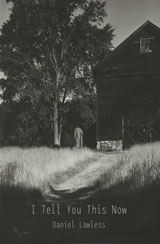 I Tell You This Now by Daniel Lawless
I Tell You This Now by Daniel Lawless
Červená Barva Press, 2024-
Daniel Lawless is the author most recently of The Gun My Sister Killed Herself With. Recent poems appear in FIELD, Barrow Street, Prairie Schooner, Ploughshares, Poetry International, Los Angeles Review, upsteet, SOLSTICE, Manhattan Review, Massachusetts Review, JAMA, and Dreaming Awake: New Prose Poetry from the U.S., Australia, and the U.K., among others. A recipient of a continuing Shifting Foundation grant, he is the founder and editor of Plume: A Journal of Contemporary Poetry, Plume Editions, and the annual Plume Poetry anthologies.
Daniel Lawless' extraordinary new book I Tell You This Now dazzles with poetry's strange power—"negative capability"—the courage to be vulnerable even in the moment of insight, to work at the threshold where the self ends and the street begins, to be the animal that knows it will die. It's an anarchic power that subverts all authority, including the speaker's. Adamant in their modesty, generosity, and ferocity, these poems can critique the absolutes—the giving of names ("Daniel"), the arc of time ("Sleek Green Car"), emptiness itself ("Ullage"). Always these poems speak to the real, the loved, the broken. Always the work is haunted by the injustices we suffer and inflict in a world which is collapsing inwards—"your dead father who is beautiful like Quang Duc setting himself aflame." Lawless' poems are wild, but search for a way to be responsible in a time of chaos. They live on the breath, but they bear the charge of a lifetime. Lawless is a visionary, a craftsman, and a terrific poet.
—D. NurkseWhen I read Daniel Lawless's poetry, I feel as if I am in the presence of an understated visionary. Deeply personal, his poems move on two levels— they are both in the world and looking down at it, as from above. They are poems of the ordinary and of a soul seeking redemption. They are poems of memory and suffering, longing as well as of celebration, insight and blessing. I am in awe of this poet and of this ingenious and luminous collection, I Tell You This Now.
—Nin AndrewsThe poems in Daniel Lawless' I Tell You This Now evoke the photos of Diane Arbus in that they might make you want to turn away, but then only to turn back and go deeper, as he does, to find the humanity in this complex, difficult world. He mines photographs both real and imagined to create fresh, startling insights that sustain us, like the small daily joys of "...lumbering the cha-cha as she boiled the green out of Thursday cabbage." The collection unspools in one long, magnificent section-nothing to slow down or stop the accumulating momentum of these brilliant flashes. They're like old flashbulbs that briefly blind us as they sear into our consciousness. Death and illness hover over this book, as they hover in our lives, even as we hurtle ourselves forward. As Lawless writes, "how the dead live on/These scraps of memory we feed them like dogs./Always hungry, come-calling us by their name." There's a brilliant darkness to these poems that are full of light.
—Jim DanielsCover Art: Barn, Lake George (1936) by Alfred Stieglitz. Original from The Art Institute of Chicago.
$18.00 | ISBN: 978-1-950063-80-2 | 55 Pages
New Release: PILLARS OF MAGYAR POETRY Hungarian poems selected and translated by Paul Sohar
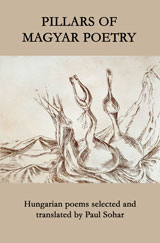 PILLARS OF MAGYAR POETRY Hungarian poems selected and translated by Paul Sohar
PILLARS OF MAGYAR POETRY Hungarian poems selected and translated by Paul Sohar
Červená Barva Press, 2024-
Paul Sohar (born 1936, in Hungary) found his way as a 1956 refugee to the United States where he continued his studies in philosophy and chemistry. The latter subject secured for him a day job in a research lab, but at night he immersed himself in literature. After early retirement on disability, his sporadic publications grew to an avalanche of poetry, prose, and translations. His own poetry has appeared in three books, one of them a prize winner Wayward Orchard (Wordrunner Press, 2011), and the latest being In Sun's Shadow (Ragged Sky Press, 2020). His nineteen volumes of translations have earned him four prizes, most recently the Balassi Literary Translation Grand Prize (2021, Budapest, Hungary). His writings and translations have appeared in hundreds of periodicals such as Agni, Kenyon Review, Rhino, Writers Journal, and others.
This brief anthology covers six centuries and contains some of the most popular Hungarian poems in addition to many of the translator's favorites.
Cover art: Jan Ten Broeke (1930-2019)
$21.95 | ISBN: 978-1-950063-86-4 | 171 Pages
New Release: HERE'S PLENTY poems by David Radavich
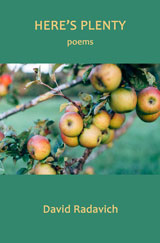 HERE'S PLENTY poems by David Radavich
HERE'S PLENTY poems by David Radavich
Červená Barva Press, 2023David Radavich is the author of two narrative collections, America Bound: An Epic for Our Time (2007) and America Abroad: An Epic of Discovery (2019). Among his lyric volumes are Slain Species (London, 1980), By the Way: Poems over the Years (1998), Greatest Hits (2000), and Canonicals: Love's Hours (2009). Middle-East Mezze (2011) focuses on a troubled yet enchanting part of our world, while The Countries We Live In (2014) explores inner and outer geographies. Unter der Sonne / Under the Sun (2022) features Radavich's German poems with English translations. Here's Plenty celebrates the sometimes searing yet ultimately redemptive richness of our planet and human experience.
Radavich's plays, both serious and comic, have been performed across the U.S., including six Off-Off-Broadway, and in Europe. He has published scholarly and informal essays and presented in such far-flung locations as Canada, Egypt, England, France, Germany, Greece, and Iceland. He has served as president of the Thomas Wolfe Society, Charlotte Writers’ Club, and North Carolina Poetry Society and currently administers the Gilbert-Chappell Distinguished Poet Series.
The poems in David Radavich's Here's Plenty come in seamless variations of splendor. The whole shapes a music lyrical and beautiful as the morning rain.
—Shelby Stephenson, former Poet Laureate of North CarolinaThe title of David Radavich's remarkable collection is apposite. Here’s Plenty characterizes a broad panoply of states of mind and feeling that are in process of change, leaving alterations that may be new problems. Chaos is held in check only by means of will power, a duty to one's own humanity. "Prometheus on the Crag" shows Everyman as a figure whose duty is to suffer. Many poets are strong but few are tough in this necessary way. "Be generous / in your hatred: // You never know / what you’ll become."
—Fred Chappell, former Poet Laureate of North CarolinaSometimes when we pick up a book of poems, we want it to feel like we are calling an old friend on the phone who understands and accepts us; Here's Plenty is that kind of book. From the opening lines of the first poem "Sun Blanched," which turns out to be a poem about the acceptance of loss, Radavich announces: "This is the fertile / garden I never knew." Here is a poet at peace with himself and the life he has made in this garden. There's an honesty about family, aging, history and place that is comforting. Rooted in the South, "A place where old water / draws back / and memory / and pain are blended," Radavich's poems pave "the way / into the bright darkness."
$18.00 | ISBN: 978-1-950063-31-4 | 84 Pages
—Marjory Wentworth, former Poet Laureate of South Carolina
New Release: WORDS UNWHISPERED Ghazals in the Time of the Pandemic, 2021
by Pamela L. Laskin
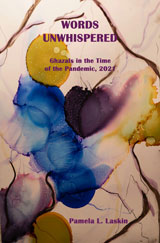 WORDS UNWHISPERED Ghazals in the Time of the Pandemic, 2021
WORDS UNWHISPERED Ghazals in the Time of the Pandemic, 2021
by Pamela L. Laskin
Červená Barva Press, 2023Pamela L. Laskin is a lecturer in the English Department at City College, where she teaches undergraduate and graduate Children’s Writing, and directs the Poetry Outreach Center. Several of her children's and poetry books have been published. Ronit and Jamil, A Palestinian/Israeli Romeo and Juliet in verse was published by Harper Collins in 2017, and was named among the 35 books to have on your radar for 2017. Bea, a picture book, was a finalist for the Katherine Paterson Prize for Children's Fiction in 2018. She is the winner of the 2018 International Fiction Prize from Leapfrog Press, and Why No Bhine, an epistolary novel about the Rohingya Muslims, was published in 2019. The Operating System published a bilingual picture book, Monster Maria, which is about Hurricane Maria, and is being used as a fundraiser for after-school programs in Puerto Rico. Linus Press published My Secret Wish about families seeking asylum, and is also being used as a fundraiser for Immigrant Families Together.
The Lost Language of Crazy, a middle grade-novel, was published in November, 2021 (Atmosphere Press). She is currently at work with Ukrainian author Vasyl Makhno on a YA novel in verse, Wisteria and Weeds, whose focus is on the war in the Ukraine, and what it means for the lives of teens.
Finally, she is this year's (2023) recipient of Judith's Room Freedom Through Literacy Board option prize for her current novel.
Follow her: twitter@RonitandJamil and follow her blog: http://PamelaLaskin.blogspot.com
Pam Laskin's WORDS UNWHISPERED: Ghazals in the Time of the Pandemic, 2021 is a stunning collection that documents the emotions, challenges, and fears that existed during the height of the pandemic. No topic is taboo here; love, death, longing, politics, family and isolation all appear in this haunting collection. There is a subtle melody and musicality underlying this extraordinary collection; a silent force that is a gift to her readers. Laskin herself reminds us of the gift of her poetry "the music melts my heart/in songs of ghazals/so every day I write/the gift of ghazal."
—JP Howard, author of SAY/MIRROR"WORDS UNWHISPERED is a reminder of the importance of the ghazal being an ancient Arabic verse that deals with grief and loss. Laskin's accomplishments in this area of grief and loss reminds the reader of "Remembering the Fireflies," when Laskin concludes the stanza with, "Like a hemorraged rose." I have read the ghazals by John Hollander, Adrienne Rich and Patricia Smith, but Laskin stands among the greats."
—Robert Anthony Gibbons, author of Flight and Close to the TreeCover Art: Elissa Cohen
$16.00 | ISBN: 978-1-950063-97-0 | 60 Pages
New Release: The Last Day by Krikor Der Hohannesian
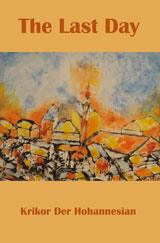 The Last Day by Krikor Der Hohannesian
The Last Day by Krikor Der Hohannesian
Červená Barva Press, 2023Krikor Der Hohannesian’s poems have appeared in over 275 literary journals including The South Carolina Review, Atlanta Review, Louisiana Literature, Connecticut Review, Comstock Review and Natural Bridge. He is a five-time Pushcart Prize nominee and author of three books, "Ghosts and Whispers" (Finishing Line Press, 2010), "Refuge in the Shadows" (Cervená Barva Press, 2013) and "First Generation" (Dos Madres Press, 2020). "Ghosts and Whispers" was a finalist for the Mass Book awards poetry category in 2011. "First Generation" was selected as a "must read" by Mass Book Awards in 2021.
Cover art: "City Landscape" by Garabed Der Hohannesian
$16.00 | ISBN: 978-1-950063-20-8 | 37 Pages
New Release: MEMORY OF THE SPECIES Selected Poems Margara Russotto
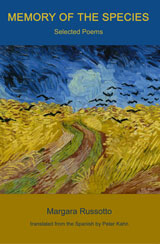 MEMORY OF THE SPECIES Selected Poems Margara Russotto
MEMORY OF THE SPECIES Selected Poems Margara Russotto
translated from the Spanish by Peter Kahn
Červená Barva Press, 2023-
Note on the Author | Margara Russotto
Venezuelan poet, scholar and translator born in Italy. PhD in Comparative Literature, University of São Paulo. Professor of the Universidad Central de Venezuela where she founded the Women's Studies. Translator of poetry and essays by Italian, Venezuelan and Brazilian writers, such as Antonia Palacios, Enrique Bernardo Núñez, Oswald de Andrade, Antonio Candido, Giuseppe Ungaretti, Claudio Magris, among others. She has received award for her poetry and her literary research, including the Poetry Award "José Antonio Ramos Sucre" (Venezuela, 1995), a Fulbright Scholarship (USA, 1998), and the LASA Award (USA, 2007) for editing the volume La ansiedad autorial. In 2010 she was a writer-in-residence at the Chateau de Lavigny International Writer's Residence. Currently, she is a Professor of Latin American Literature at the University of Massachusetts, Amherst, where she also teaches Creative Writing in Spanish. Recent book (selected essays): Cantabile. Celebración de la poesía latinoamericana (Madrid, 2020).Note on the Translator | Peter Kahn
$19.95 | ISBN 978-1-950063-22-2 | 106 Pages
Peter Kahn is a professional translator living in Vermont (USA). He has translated works of fiction and nonfiction by numerous Latin American and Spanish writers, including Tununa Mercado, Elvira Orphée, Esther Cross, Javier Moreno, Hugo Clemente and Gwendolyn Diaz. His fiction and poetry translations have appeared in various publications, including Grand Street, Gastronomia, Santa Barbara Review, Modern Poetry in Translation, The Massachusetts Review, and several anthologies. In 2015, he was awarded the Massachusetts Annual Chametzky Prize for his translation of Margara Russotto's poem "Of Useless Knowledge."
New Release: FRACTURED LENS by Vijaya Sundaram
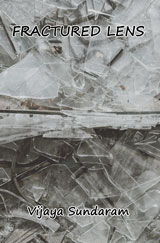 FRACTURED LENS by Vijaya Sundaram
FRACTURED LENS by Vijaya Sundaram
Červená Barva Press, 2023Vijaya Sundaram is the Poet Laureate of Medford, Massachusetts (2023-2025). Originally from India, Vijaya Sundaram is a poet, musician, singer-songwriter, and educator. Her work has appeared in the Rising Phoenix Press, the Stardust Review, and TELL Magazine. This is her first collection of poems in print. She lives in Medford, Massachusetts with her husband, daughter, and Holly, their standard poodle.
$16.00 | ISBN: 978-1-950063-66-6 | 52 Pages
New Release: Natural Tendencies by James B. Nicola
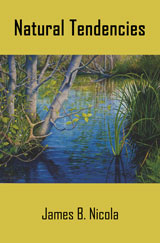 Natural Tendencies by James B. Nicola
Natural Tendencies by James B. Nicola
Červená Barva Press, 2023James B. Nicola's poems have appeared in the Antioch, Southwest and Atlanta Reviews; Rattle; and Barrow Street. His seven full-length collections are Manhattan Plaza, Stage to Page, Wind in the Cave, Out of Nothing: Poems of Art and Artists, Quickening, Fires of Heaven, and Turns & Twists. His nonfiction book Playing the Audience won a Choice award. He has received a Dana Literary Award, two Willow Review awards, Storyteller's People's Choice award, one Best of Net, one Rhysling, and ten Pushcart nominations-for which he feels both stunned and grateful. A graduate of Yale, he hosts the Hell's Kitchen International Writers' Round Table at his library branch in Manhattan: walk-ins are always welcome.
This latest of James Nicola's themed collections celebrates the natural world in all its beauty, power, and complexity, from the smallest grain of sand to the vastness of the heavens. Whether expressing a child's rapturous awe or an adult's sober contemplation-or the other way around-the poems are characterized by precise observation, vivid description, and technical ingenuity. Among them are lyrics of such delicacy and finish, including "The Succulent" and "Ivy," that any true poet would be happy to have written them.
-Michael Palma, author of Begin in GladnessSome very wild jumps herein, from the sacred to the profane and back to the literal earthly mundane. I did like these poems. Rather off beat from the generally incomprehensible poems you see.
-John Hanson Mitchell, author of Following the SunIn James B. Nicola's Natural Tendencies, we "can still taste the wild and green aroma" of his landscapes-both of the interior and the natural world. His robust imaginative intelligence is honed, his touch is lyrical, and his tone is adept. These poems address "This wonderment, / This universe" in an age when green space is vanishing and the climate is warming. In response, there is a solace and a resonance to be found in Natural Tendencies, demonstrated in the poems' adept craft and uniquely adroit voice.
-Wally Swist, author of Taking Residence"Welcome to my world," says Nicola at the portal to this book, and "world" is the right word for rich realm into which we're invited, that of nature, in all its manifestations. The verse is beautifully evocative throughout, the evocation being informed by a mystical, zen-like appreciation that repeatedly crystallizes in aphorism. The book ends with one of the most memorable such moments: "And one lone soul might likewise warm my way / to light and God. It won't be one I've met, / but you, whom I have not imagined yet."
-Dan Brown, author of Taking the OccasionCover art: "Springtime on Grant Creek" by Monte Dolack
$18.00 | ISBN:978-1-950063-61-1 | 101 Pages
AMERICAN QUEERS poems by Jesse Mavro Diamond
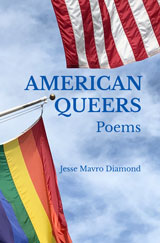 AMERICAN QUEERS by Jesse Mavro Diamond
AMERICAN QUEERS by Jesse Mavro Diamond
Červená Barva Press, 2023Jesse Mavro Diamond has been writing poetry since childhood, when at 7, she was the proud and delighted author of her first published poem, "Summer is Over." Throughout the next six decades, her writing has explored issues of deep interest to her including identity, gender politics and the diverse societal influences that shape our lives. Mavro Diamond's experiences as a Jewish woman, feminist, martial artist, and teacher of English Language Arts at both the secondary and college level has informed every aspect of her writing. She is the author of four plays and six volumes of poetry, including Swimming the Hellespont, whose title poem was chosen to be honored by the Tennessee Williams Literary Festival. Most recently, she developed and taught the first Creative Writing Course in Boston Latin School's 364-year History. Her work has been published and performed within the United States and internationally.
In 2004, when same-sex marriage was legalized in Massachusetts, Mavro Diamond married her partner of 27 years. They reside in the Boston area.
Jesse Mavro Diamond's poetry in AMERICAN QUEERS Impresses with historical vision and authenticity. Poems move seamlessly between contemporary and mythic worlds. Diamond's poetry combines a keen resistance to heteronormative culture with a lyric eroticism that evokes Sappho. The book will hit a nerve for anyone whose personal history is entrenched in the early gay rights movement but will equally resonate for those learning about the period through the nuance of its of its insights.
-Judson Evans, co-author of Chalk Talk and Professor of Liberal Arts at Berklee College of MusicIn AMERICAN QUEERS: Poems Celebrating Mid-Century Gay Activists, Jesse Mavro Diamond imagines a metaphoric kingdom inhabited by four relatively unknown gay and lesbian royal champions. With sharp wit and whole-hearted empathy, the poet extols and elegizes Stormé Delarverie, Richard Leitsch, Pat Parker and Charley Shively. Appending the poems with well researched biographical notes on each activist, diverse readers, students and teachers will discover the work is compelling and informative. AMERICAN QUEERS "impresses with historical vision and authenticity."
$18.00 | ISBN: 978-1-950063-77-2 | 54 Pages
(Judson Evans)
The Tavern of Lost Souls by Alan Britt
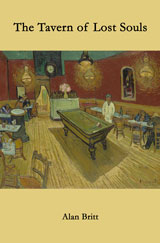 The Tavern of Lost Souls by Alan Britt
The Tavern of Lost Souls by Alan Britt
Červená Barva Press, 2023-
I grew up in southeastern Florida where hot summer days sizzled and summer nights’ humid lips of jasmine pressed against my frosted bedroom jalousies. An aspiring athlete, I wanted to play for the Milwaukee Braves-I thought Hank Aaron was poetry in motion. Well, songwriter for a garage band, later I found myself a college sophomore writing poetry and a founding member of a group of poets and artists known as the Immanentists. Though somewhat eclectic, we were a blend of European Surrealism with a Native American sensibility who believed that through language and paint we could attain spiritual fusion with the natural world. After reading The Immanentist Anthology, the great French poet, Yves Bonnefoy, said that Immanentism was the most exciting poetry he had seen from the US in decades. What a thrill! I remained in contact with Yves until his death in 2016. Eventually, I drove a yellow Ryder truck from West Palm Beach to Baltimore to attend the graduate Writing Seminars at Johns Hopkins University where I made a beeline to the National Gallery in DC to marvel at the wondrous creations by Rembrandt, Vermeer, Monet, Manet, and Odilon Redon. Baltimore became my heaven with snow. Inspired by Andrew Marvell, William Blake, Walt Whitman, Federico García Lorca, Gabriela Mistral, Pablo Neruda, Eunice Odio, Sandor Kanyadi, Kristina Ehin, plus hundreds of others, I now write poems about anything and everything. Along the way I've learned that to write poetry is to love, and to love is to write poetry.
-Alan BrittAlan has published 25 books of poetry.
"When thunder becomes symbolic again, / then and only then we'll discover / the true nature of existence." Not true. We know it right here in this book-this prism-this kaleidoscope of the soul bursting with imagination. And the poet's everyday world is never lost, even while tethered to high-flying multi-imaged phrases and clauses. Alan Britt's literary personality is here, precise in every note. The poetic will of each line, urgency and flair, teaches us the game.
-Grace Cavalieri, Producer/Host of Public Radio's "The Poet and the Poem from the Library of Congress" and Maryland Poet LaureateIn The Tavern of Lost Souls, each poem rises through the reader like wine, filling the mind with the intoxication of life viewed from this unique and humanitarian perspective. Alan Britt combines elements of sensuality and subtle humor with a depth of feeling "thick with the aroma of fresh imagination." About Baudelaire he writes, "Sifting his way through human frailty, / paying attention to things lesser poets buried / beneath the borrowed sentiments of their age . . ./" These words could apply to his own work as well, as reality and fantasy walk through these pages together, creating an addictive book one finds difficult to put down.
$18.95 | ISBN: 978-1-950063-26-0 | 83 Pages
-Patty Dickson Pieczka, Author of the novel Finding the Raven and winner of the 2012 Library of Poetry Book Award from The Bitter Oleander Press for Painting the Egret's Echo
Bathed in Moonlight by Vassiliki Rapti
Translated from the Greek by Peter Bottéas
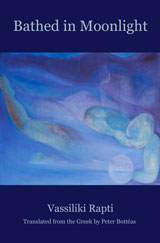 Bathed in Moonlight by Vassiliki Rapti
Bathed in Moonlight by Vassiliki Rapti
Translated from the Greek by Peter Bottéas
Červená Barva Press, 2023-
About the Author
Vassiliki Rapti was born and raised in Greece, and studied Comparative Literature and Media in Greece, France, and the United States. She holds a Ph.D. in Comparative Literature with an Emphasis in Drama from Washington University in St. Louis, and is the author of several books, including Ludics in Surrealist Theatre and Beyond (Ashgate, 2013), the co-edited volume Ludics: Play as Humanistic Inquiry (Palgrave/MacMillan, 2021), and the bilingual poetry collection Transitorium (Somerset Hall Press, 2015). Her translation publications include Greek surrealist author Nanos Valaoritis, and her poetry and translations have been published in various international journals. She received a Parnassos Literary award in Greece in 1998.Her poetry is fueled by surrealist imagery, a pursuit of playfulness in artistic expression, and a desire to capture wonderment in everyday life. She is Chair of the Ludics Seminar of the Mahindra Humanities Center at Harvard University, where she founded the Advanced Training in Greek Poetry Translation and Performance Workshop, and currently teaches World Literature and Digital Culture at Emerson College. She is the founding director Citizen TALES* Commons, an international collective of scholars and artists.
The poetry collection that forms the core of this volume was published in Greek in Athens in 2021. In November 2022, the Voice of Greece, the radio arm of the Hellenic Broadcasting Corporation (EPT), featured Vassiliki as its Poet of the Week, with twice daily readings of her poetry throughout the week.
About the Translator
A native of Toronto, Canada, Peter Bottéas holds a Master's degree in Translation from the Université de Montréal and worked for many years as a translator, revisor, editor, and educator in French Canada. After a twenty-year detour as a psychotherapist in Boston, he recently returned to one of his first loves, literary translation, and is currently the primary translator of Greek Boston-based poet Vassiliki Rapti. The author and translator have done several poetry readings together in New York and Boston, as well as in on-line forums. He is a member of the multidisciplinary think-tank and creative forum Citizen TALES Commons and, along with Vassiliki, is co-host of the podcast series Borders Unbound: Hellenic Poetry of the Diaspora and Beyond. Peter is also an occasional voice-over artist, an infrequent poet, and an aficionado of French and Greek poetry set to music.
Ever since an insomniac, lovelorn Sappho looked up at the moon, Greek lyric poetry has echoed her register of gluko-pikron: the sweet-bitterness of longing. We open our mouths because we desire. Open Bathed in Moonlight to any page and you'll find the language of desire suffused by the tender, intensely focused erotic glow of Vassiliki Rapti's rapturous gift. Yet the moon, and Sappho, are not the only presiding spirits of illumination in this magical collection. Rapti has struck the Sapphic note in a new key by fusing it with the voices of some of the great surrealist Greek poets of the twentieth century. The result is a felicitous mix of mournful eloquence and expressionist imagination, delicate inwardness and evocative power-a testament to the "Perpetual Perseverance" of a disciplined and formidable imagination:
you were cast among myriad
multicolored peacocks
so that you might learn the skill
of perseverance
dragged out, freed after aeons
flung, whirling, whirling
into the embrace of the moon.In the pitch-perfect registers of Peter Bottéas's beautiful translation, Bathed in Moonlight is pristine.
-George Kalogeris, author of Winthropos, Associate Professor of English Literature and Classics at Suffolk University, BostonAs it moves back and forth over time, Bathed in Moonlight explores the ambiguity of what is lost and what is gained in poetry. While Vassiliki Rapti's poems certainly engage with the voices of her native Greek tradition they would also seem to be in dialogue with poetries beyond the borders of the western world. She tends to locate individual experience in the collective. And so, with intense lyricism and transformative, vivid expression, each poem creates its own separate world of emotional strength. These poems are fluent, vibrant, reflective, sensitive, open and brilliantly sensory. They reflect Rapti's wonder at the world, the cyclic nature of life and language. Her voice spins, floats, and whirls from spiral shells, floating lakes, the ever vigilant moon and calls through fragments of memory, the depths of the underground and the unspoken that hides between each line.
-Gonca ÖzmenVassiliki Rapti's luminous, capacious poems are journeys arising from hope and fears; aching and searching, they seek kinship and reconciliation with nature which is the true home for the restless, solitary self. Sensuous yet balanced, sparse yet containing multitudes, Bathed in Moonlight illuminates the life of the mind where remembrance and unbridled thoughts run together, where human yearnings are an enduring life force, where words, written from the innermost place resonate and affirm the power of poetry. This marvelous collection of poems is a balm in our fractured and chaotic time.
$16.00 | ISBN: 978-1-950063-76-5 | 66 Pages
-Pui Ying Wong author of The Feast
Heaven with Others by Barbara Molloy
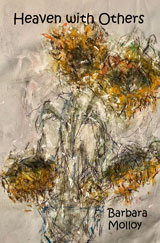 Heaven with Others by Barbara Molloy
Heaven with Others by Barbara Molloy
Červená Barva Press, 2023-
Barbara Molloy is a writer, artist, and jazz vocalist who makes her home in Coupeville, Washington on beautiful Whidbey Island. A previous book of poems, In Favor of Lightning, was published by Wesleyan University Press. Ms. Molloy's work has been nominated for Pushcart prizes and has won awards from The Pen Foundation. Her poems have appeared in a variety of literary journals.
Barbara Molloy's new collection Heaven with Others is a feast for the senses, as well as an elegiac reminder that all we have is the present. These poems study mortality: "As if it was not her at all,/dying,/abut to die,/being dead,/or returned to life..." (“Gift of Sunflowers”). In the hands of this accomplished lyricist even the most sordid past is rendered as fine art and gifted with visceral re-birth in organic images not easily forgotten: "Leaves strewn about the yards-/the exact color of church and rectory bricks..." (Breeze). Molloy's voice brings down the high-brow and lifts up the colloquial. We are the beneficiaries of her vision.
-Judith SkillmanIn this new collection, Barbara Molloy Olund keeps a sharp focus on the chaos of discarded objects and lives while tracking surprising moments of humor. "Who said 'cherish the moments' and/ 'life gives you a lemon; make lemonade?'/ Are they tired yet?..." asks the narrator (Of Ghosts). These poems respect the hard work of living. There's an intention here, almost a promise, to never let go of what matters, no matter how seemingly unimportant an object or detail, how elusive a relationship-what prevails is the intention to continue searching for what's real and what's not. "I will not love the past./ Let it glitter. Let it sit forward..." (Decision). I admire how this work confronts the spiritual labor of care giving, birthing, struggling with addiction, negotiating with ghosts, and parenting. And I'm touched by the ongoing, archetypal process running through these pages-the sorting-out of wisps of beauty from the detritus of life.
-Christianne Balk"Sometimes," Barbara Molloy writes "the most impossible/variables line up." And in her poems, they do. Her poems leave me breathless, off kilter, bewildered (in the archaic sense of being lured into the wilds). In these wilds, grief is a force of gravity. The vision here is uncanny-the familiar is strange, the strange familiar. The seemingly ordinary embodies the unforeseen, what Stanley Plumly called in her first book "a kind of clairvoyance."
-Eric PankeyThe poems in Barbara Molloy's new book, Heaven With Others, don't rest quietly in the realm of the familiar and quotidian. Nor do they keep to the territory of the uncanny and mysterious. Molloy's poems travel in the shifting borderlands between those irreconcilable worlds. That's the rocky, unmapped terrain that her fiercely moving poems lead us through. I'm reminded of Jean Valentine's sudden leaps into unforeseen light, and also of C.K. Williams's earthbound acknowledgement of the grit underfoot. These beautiful, memorable poems are compassionate, honest testaments to what it is to walk here alone and in company, as a mortal body inhabited by spirit and dream.
$18.00 | ISBN: 978-1-950063-54-3 | 56 Pages
-Jennifer Atkinson
New Release: UN-SILENCED poems by Elizabeth Lund
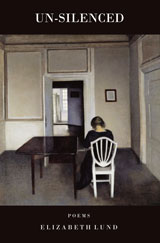 UN-SILENCED poems by Elizabeth Lund
UN-SILENCED poems by Elizabeth Lund
Červená Barva Press, 2023-
Elizabeth Lund is the award-winning host of Poetic Lines, which features in-depth interviews with established and emerging poets. She also covers poetry for major publications, including The Christian Science Monitor, where she edited poetry for ten years. From 2015 through 2019 she wrote a monthly poetry column for The Washington Post. Her own poems have appeared in the US, the UK, and Canada. She has read and appeared at a variety of festivals, most recently the Gaithersburg Book Festival, where she served as the final judge for the 2020 high school poetry contest.
Long before 2020, when the world began grappling with a pervasive pandemic that resulted in widespread personal isolation, another type of malevolence locked many women inside their homes. These poems address the devastating effects of domestic violence and seek to restore one victim’s voice, allowing her to speak to and through another generation of women.
Poetry is one of the few art forms that enables us to approach extremely difficult and complex human experiences without having to turn to didacticism or preaching. Lund’s poems do this exquisitely as they grapple with the intense emotions of a woman trapped in an abusive relationship. Each poem is a compelling piece of a much larger puzzle - one that explores the effects of toxic masculinity and the debilitating fallacy that a woman can free her abuser from his own darkness.
With the concision of Emily Dickinson who taught us to "tell all the truth but tell it slant -," and a stream of consciousness narrative, Lund creates the perfect modality to convey an intense and painful journey that generations of women have experienced.
The result, Un-Silenced, is an absolutely stunning, heart-rattling read that implores us to open our hearts and minds.
-Michael S. Glaser, Poet Laureate of Maryland 2004-2009A gunshot is fired. Police are called. One could say the sky/turns a deaf ear. In this powerful collection, Elizabeth Lund, the omnipresent speaker, honors a beloved aunt and casts light on other women who have suffered domestic abuse. Through poignant narrative and lyric fragments, Un-Silenced takes us deep into a culture that perpetrates violence against women. Lund gives these women the dignity they deserve while finding solace and closure to her own familial pain. This is a major debut of an authentic, compassionate voice! May all who have been harmed or are in harm's way, directly or indirectly, be blessed by this book's presence in the world.
-Dzvinia Orlowsky, author of Bad Harvest and SilvertoneElizabeth Lund has captured the sorrow and malevolence of our times in lyrics that are unsparing, mysterious, and defiantly beautiful. I was captivated from first page to last.
$18.00 | ISBN: 978-1-950063-79-6 | 60 Pages
-Hilary Holladay, author of The Power of Adrienne Rich: A Biography
New Release: GIORNATA by Irina Mashinski
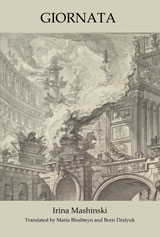 GIORNATA by Irina Mashinski
GIORNATA by Irina Mashinski
Translated by Maria Bloshteyn and Boris Dralyuk
Červená Barva Press, 2022-
Irina Mashinski was born and raised in Moscow. She graduated from Moscow University, where she studied theory of landscape and completed her PhD in paleoclimatology. In 1991, she emigrated to the United States, where she taught high school mathematics as well as literature, history, and meteorology at several universities. Mashinski is the author The Naked World (MadHat Press, 2022) and of eleven books of poetry and essays in Russian. She is co-editor, with Robert Chandler and Boris Dralyuk, of The Penguin Book of Russian Poetry (Penguin Classics, 2015) and of Cardinal Points, the journal of Brown University's Slavic Department. Her work has been translated into several languages and has appeared in numerous journals and anthologies both in the US and internationally. Website: www.irinamashinski.com
Irina Mashinski is a poet who has the rooting feeling for the tag game played between the inapposite and the apposite. Accordingly, nothing is off-limit because there is no limit for a poet who can be microscopic and cosmic, offhand and adjuring, and who, above all, is willing to descend and ascend-again, without limits. The long central poem In Absentia is a tour de force of relentless probing of loss and the innumerable, parti-colored shards that accompany loss, the drear yet enticing yet shattering yet sustaining landscape of memories. The translations bring a wonderfully attentive ear to the page, one that delights in the resonances and the cadences of English. All in all, this book is a book of poems to live with, containing the vastness and fearlessness we all hope to find in poetry.
-Baron Wormser, author of Legends of the Slow ExplosionIf poetry is the language capable of shedding light on the things beyond, the things in between, then Irina Mashinski illuminates them - to the very core of our existence.
-Lothar Quinkenstein, author of Souterrain and translator of Olga TokarczukIrina Mashinski's poems in Giornata inhabit the landscape of elegy and exile, as well as the actual landscape of rural America. She forgets nothing, asking without self-pity, "Who's left?" These translations feel wholly original, rich in music, but mostly rich with the poet's sensibility, the tenderness with which she opens to her losses and offers them to us, like her grandmother's "Moscow teacups" an image so simple and so arresting. Mashinski teaches us to reckon with the past, to know the world as inherently elegiac, and yet to also be tied to the moment, to love the moment, not missing anything, not the clouds blooming outside her window, or the detritus on the forest floor. These are poems to return to and live with.
-Anne Marie Macari, author of Heaven BeneathIrina Mashinski's poetic eye has such range, it seems to move above the earth and see both the changing of landscapes and the shift between eras with equal ease. There is also an underlying cheerful quality about the poems, which could be straight elegies for our terrible centuries and histories but somehow refuse to give in to undiluted sadness. These new translations convey the purity and fineness of Mashinski's work, whilst conveying its formal complexity - a rare feat.
-Alexandra Dugdale, author of Deformations and JoyGiornata. A day's work on a fresco, on a true fresco, buon, where the pigment is permanently fused with the plaster, where the vision, the dream, becomes one with its surface, where the day does not just point to its mystery, it is our mystery. In these poems, Irina Mashinski migrates between Russia and the U.S., between her past and present, between memory and memory. In so doing, she teaches me what cannot ever be left or lost: this moment, our now. Mashinski is a poet's poet. I am in awe. -Rebecca Gayle Howell, author of American Purgatory and Render / An Apocalypse
$18.00 | ISBN: 978-1-950063-60-4 | 94 Pages
New Release: TRUE HERESIES by Michael Daley
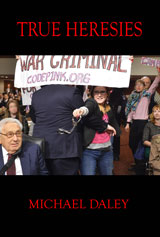 TRUE HERESIES by Michael Daley
TRUE HERESIES by Michael Daley
Červená Barva Press, 2022-
Michael Daley was born and raised in Dorchester, Massachusetts. He holds a B.A. from the University of Massachusetts and an M.F.A. from the University of Washington. His work has been awarded by Seattle Arts Commission, Washington State Arts Commission, Massachusetts Cultural Council, Fessenden Foundation, National Endowment of the Humanities, Fulbright, The Skagit River Poetry Foundation, and The Poets House Trust. A retired teacher, he lives near Deception Pass in Washington.
True Heresies is a cocktail of rage, anti-poems, and dissonant songs; this collection takes a swing or two at several revered institutions and dogmata. Some of the topics addressed here are exhumed from contemporary headlines, historical events often obscured by our collective distractions; at the unconscious fringe of philosophical meddling, some of these poems voice the suppressed terrors of today’s imminent dystopia. True Heresies calls out from necessity that shout in the street that is divine while remaining profoundly human. In an age when taking anything on faith is a challenge, these poems like bells peal forth their questions.
Mouth-filling! Mind-bending! A total trip! The images, references, and connections come so fast and furious, it's hard to catch my breath! These poems have some serious juice-the first one is SO intense-it seems to contain the outlines of all the rest-and from there, the poems slow a bit, and focus more closely, as if through squinted eyes, but never losing momentum.
-Marjorie Rommel, Poet Laureate Emerita, Auburn, WashingtonI have no idea how these poems were conceived, whether in a boil after two weeks in the darkest recesses of a cave, or upon watching disastrous election returns on a continuous loop, or as one poem title suggests, at 35,000 feet while listening to The Odyssey, but they are bursting with classical and backwoods tragedies, passions, and humors (clever and ill), and they are excellent, challenging company.
-Kathleen Flenniken, former Washington State Poet LaureateMichael Daley's poems are waiting for a world to be finished (and that is meant in both senses of the word). They are both powerfully evocative of the nothingness holding the living in its thrall and the dialectical affirmations of its images, whose textures confront that nothingness and insist on overcoming its negations. A book of poems that strengthens the soul.
-Jack Hirschman, Poet Laureate Emeritus, San Francisco, CaliforniaTrue Heresies is an American original, filled to overflowing with a unique voice and an idiosyncratic turn of mind. Daley's words and images can make a reader's head spin for a long time after the book is closed. It will enlarge your perceptions of what poetry can do. He makes conventional poems taste like sour milk. His work can fleece the reader raw.
-Louis Phillips, author of How Wide the Meadow"Great literature," Ezra Pound famously said, "is simply language charged with meaning to the utmost possible degree." Michael Daley's poems most certainly are highly charged. "Language," he writes in one poem, "is tied to every atom." And that charge creates a kind of nuclear fusion that bonds music to meaning. In True Heresies, the music is often furious and symphonic, the meaning often a savage reflection of a fractured age, a time of climate disruption we ourselves have brought on and, as of now, appear to be doing very little to prevent what seems like a chain reaction. Daley's poems are the Greek chorus, the heretics who speak the sometimes-unspeakable truths we wish we could avoid.
-Ed Harkness, author of The Law of the UnforeseenCover photo: © Jay Mallin/ZUMA Press
$18.00 | ISBN: 978-1-950063-63-5 | 96 Pages
New Release: CONFESSIONS poems by Anis Shivani
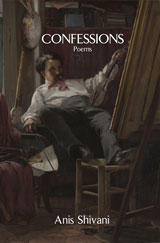 CONFESSIONS poems by Anis Shivani
CONFESSIONS poems by Anis Shivani
Červená Barva Press, 2022-
Anis Shivani is a poet, fiction writer, and literary critic living in Houston, Texas. His critically acclaimed books include Anatolia and Other Stories, The Fifth Lash and Other Stories, Karachi Raj: A Novel, My Tranquil War and Other Poems, Whatever Speaks on Behalf of Hashish: Poems, The Moon Blooms in Occupied Hours: Poems, Soraya: Sonnets, Against the Workshop: Provocations, Polemics, Controversies, and Literary Writing in the Twenty-First Century: Conversations. His work appears widely in such journals as the Yale Review, Georgia Review, Southwest Review, Boston Review, Threepenny Review, Michigan Quarterly Review, Antioch Review, Black Warrior Review, Western Humanities Review, Boulevard, Pleiades, AGNI, Fence, Denver Quarterly, The Journal, Gulf Coast, Third Coast, Volt, Subtropics, New Letters, Times Literary Supplement, London Magazine, Cambridge Quarterly, Meanjin, Fiddlehead, Dalhousie Review, Antigonish Review, and elsewhere. He has also written for many magazines and newspapers including Salon, Daily Beast, AlterNet, CommonDreams, Truthout, Huffington Post, Texas Observer, In These Times, Boston Globe, San Francisco Chronicle, Kansas City Star, Pittsburgh Post-Gazette, St. Petersburg Times, Baltimore Sun, Charlotte Observer, Austin American-Statesman, and elsewhere. He is the winner of a Pushcart Prize, and a graduate of Harvard College.
"Defiant, deft, bound to the imagination and the practice of the poet's craft, Anis Shivani's Confessions has given us much to appreciate. This startling work resists the easy spectacle poetry, and even confessions themselves, often offer the heart. Instead, Shivani's lucid perceptions expose, darkly, and incandescently, too, the aches and auguries of that which is spoken and unspoken through language. These inseparable collisions of ecstatic and ordinary life, the world and the word, intellect and instinct, are visceral in discovery and intimacy. We, too, become fortunate travelers hurtling inside the prowess of Shivani's polyphonic acts. Confessions is the voice of an expansive mind, deeply conscious and deservedly celebratory of its own free textures and countries."
-Rachel Eliza Griffiths, award-winning author of Mule & Pear, Lighting the Shadow, and Seeing the BodyPRAISE FOR ANIS SHIVANI'S POETRY
"Anis Shivani evidently inhabits a world in which every moment of time in the past, present, and a humorously but lethally prophesied future, occurs simultaneously and is animated by a wit sometimes subtle, sometimes savagely indignant. Its two faces join forces and somehow manage to speak in unison of what they actually see and think. I sense everywhere an undercurrent of compassion and identification, a poignant humanity and sense of responsibility underneath his torrential voice."
-Franz Wright"When I first plunged into Anis Shivani's work, I had the impression two of my most admired dead poet friends were one-upping each other in the afterlife-Tom Disch with his straight-faced drop-dead virtuoso satire of literary and political pretension and Aga Shahid Ali with his eloquent, global, polyglot formal legerdemain-both of them knowing more about history and about literature than ninety-nine percent of their readers. But Shivani's poems are no phantoms, they are vibrant, new, knowledgeable, daring, and welcome."
-Marilyn Hacker"Anis Shivani's poetry is remarkable for its continuing preoccupation with literature, culture, and language, and a discourse that incorporates the written word, the oral tradition, and the imagery of art and film. His cerebral poems often border on the obscure, but constantly challenge the reader to unravel deeply embedded references, suggestions, and innuendoes. The innovative use of words and sounds that draw on myriad languages and cultures adds to the rich texture of each poem."
$18.00 | ISBN: 978-1-950063-29-1 | 102 Pages
-Muneeza Shamsie
New Release: Gobbo: A Solitaire's Opera by David Cappella
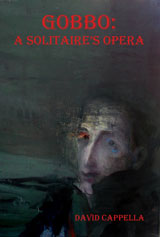 Gobbo: A Solitaire's Opera by David Cappella
Gobbo: A Solitaire's Opera by David Cappella
Červená Barva Press, 2022-
David Cappella, Professor Emeritus of English and the 2017/2018 Poet-in-Residence at Central Connecticut State University, has co-authored two widely used poetry textbooks, Teaching the Art of Poetry: The Moves and A Surge of Language: Teaching Poetry Day to Day. He won the Bright Hill Press Poetry Chapbook Competition in 2006. His poems and essays have appeared in various literary journals and anthologies in the US and Europe. His novel, Kindling, has been called "a powerful and devastating coming-of-age story." Visit his university web site: http://webcapp.ccsu.edu/?fsdMember=249
Note to the Reader
Gobbo: A Solitaire's Opera is a "natural opera." That is, it is the emotional arc of a poet's life rendered in poetry. The sonnet sequence is divided into three acts much like a formal opera, and it is loosely based on the life of the Italian poet, Giacomo Leopardi. His life, fraught with emotional and physical pain, did not stop him from writing some of the most exquisite lyrical poetry of his age, of all time. His view of human nature, of mankind in general was dark, but this was not necessarily because he was physically misshapen, though some think that is the case. Whatever his view of humanity or whatever his emotional and physical pain, Leopardi demonstrated great courage in the face of adversity while his poetry transcended his life.Though the emotional life of Gobbo follows the life of Leopardi, his voice is, most assuredly, not Leopardi's. The voice of Gobbo is the consciousness of a poet living his life. He is the artist navigating the world. Gobbo: A Solitaire's Opera is not an historical or a biographical document.
"David Cappella's Gobbo is truly operatic as it makes us feel the heart and soul of a tortured yet remarkable poet. Through the deft use of form, Cappella maintains a constant window on a changeable man. Each aria-like poem articulates an aspect of Gobbo’s experience while creating, as in opera, a powerful emotional skein. This is a life of a poet in poems. As such, its relevance is timeless."
-Baron Wormser"It is difficult for us who live in an anti-romantic age to grasp the consciousness of the romantic poet without the aura of the decorative, or the merely forlorn, obstructing our appreciation. We may sense a great reduction has come to pass regarding the ways of being available to a poet in today’s world. In these poems, from the first act of David Cappella’s Gobbo: A Solitaire’s Opera, we are given, again, what poets in western societies have lost, the exquisitely articulated desires and claims of the young poet who has “no loves, no friends, nothing, just [his] studies” and yet, through the exercise of an intense imagination, finds comfort and confirmation in nature, books, language itself, and encounters with the beautiful and the infinite. It is high, grand stuff, true art, when a poet can embody the dance that transpires between the imagination and life lived in response to perceptions and circumstances. This is what David Cappella has created with delicacy and balance."
-Gray JacobikCover art: "One / Leopardi" by Britta Winkels
$18.00 | ISBN: 978-1-950063-15-4 | 106 Pages
New Release: Our Best Defense by David O'Connell
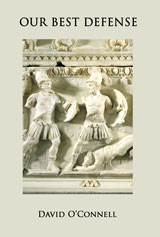 Our Best Defense by David O'Connell
Our Best Defense by David O'Connell
Červená Barva Press, 2022-
David O'Connell's chapbook, A Better Way to Fall, was awarded the Philbrick Poetry Award from the Providence Athenaeum. His poetry has appeared in New Ohio Review, The Cincinnati Review, Poet Lore, Copper Nickel, and North American Review, among other journals. He has received fellowships in poetry from the Rhode Island State Council on the Arts and earned his MFA at Ohio State University. David lives in Providence, Rhode Island with his wife, the poet Julie Danho, and their daughter. More of his work is available at davidoconnellpoet.com.
These wonderful poems combine intellect and feeling, family life and history and are the "best defense" against the sleep of contemporary life in which people live vicariously through the famous, refuse to acknowledge the lessons of history, and persist in denying our finitude. They enact the scrutiny and self-awareness that Robert Lowell called for, that "agonizing reappraisal," and do so with great tenderness and with a wry sense of how our lives are interwoven with myth and history and with work memos and The Weather Channel. Our Best Defense arms us with humor, fearlessness, and wonder.
-Robert CordingDavid O'Connell leads readers through a modern family life with tenderness, skepticism, and wonder. It's a life he knows-though that life is not everyone's. How much is lost when he passes on time with his wife to deliver a promised memo to Legal instead? When his toddler daughter sobs to a Christmas tune? These poems know better than to feel at ease with the timbre of Bing Crosby or the rhyme scheme of Edwin Arlington Robinson. These poems expose the mirage of perfect life outside day spas and inside sheltered schoolrooms. "Why do we learn / what we learn in this order?" is a persistent question-of this book and of the times. "What are you doing with your life?" O'Connell asks. The weather's unseasonably off. And there's no way to ignore the historical record skipping.
-Yona HarveyEvery poem in David O'Connell's fine debut embodies Robert Frost's definition of poetry: "A momentary stay against confusion." Poems celebrating work well done, the blues of Robert Johnson, and the deep nourishment of domesticity keep company with poems lamenting heroism's blindness and the wasteland homo sapiens seem determined to make of our planet. Formally various, the poems share a deceptively calm, patient voice, the sound of a writer who knows how ineffably fragile and sublime existence is. "Marriage," a three-line lyric that arrives late in the book, puts the matter best: "Evening, winter, fresh/from the bath, she leaves a trail./I take off my socks."
$18.00 | ISBN: 978-1-950063-48-2 | 92 Pages
-John Repp
New release: On Earth As It Is by Michael Todd Steffen
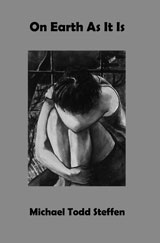 On Earth As It Is by Michael Todd Steffen
On Earth As It Is by Michael Todd Steffen
Červená Barva Press, 2022Of his first book Partner, Orchard, Day Moon published in 2014 David Ferry wrote, Michael Steffen is so alive in his writing, keen with observation, both of what things actually look like, what the wind feels like, how things grow and rot, and also of character, his own, his uncles', anybody's he sees. Steffen is the recipient of a 2021 Massachusetts Cultural Council Literary Fellowship, and his poetry has appeared in journals, including The Boston Globe, The Concord Saunterer, Ibbetson Street, The Lyric and Synchronized Chaos.
From beginning to end, through great and small, the stirrings of a hurricane, the agility of a housefly, the majesty of a Pacific Northwest Sequoia, On Earth As It Is upholds the wonders of life on our lonely blue planet, bringing new inflections to the voice of eco-poetry, while formal and topical surprise from poem to poem defies genre. Steffen's restless curiosity ranges from silent alarm to staggering resignation, formal irony for the popular and political language of "global warming" to out and out observance for the iconic heroes and defenders of the earth and its elements from Rachel Carson to Ansel Adams. Still, barber, dentist, the memory of a dog, a Botticelli Madonna and Infant, Mae West, a tortoise wavering between its natural appearance and its resonance in fable, also appear as subjects in the poems to evoke the human and mythical entanglements at stake in the survival of our world. Shy of the overwhelming challenges we are facing in this realm today, the simple challenge of this selection to the reader is how to stop turning its pages.
It is so present, the speaker in this collection observes, and every poem in some way proves this: Steffen's close observations, intimate portraits, sense of history, surprising wit and the play of dark and light, all bring the reader into the now, a world where the sheer physicality of abstractions (the vice of innocence, immensity I sleep on, a narrow salvation and many more) renews and refreshes their meaning. The pleasures of the poems in On Earth As It Is are many, but foremost among them is the striking combination of the clear-eyed and the complicated, the everyday and the transcendent. This is accomplished and important work.
-Joan Houlihan, author of It Isn't a Ghost if It Lives in Your ChestCover art: Bridget Galway
$16.00 | ISBN: 978-1-950063-17-8 | 53 Pages
New release: NO TIME FOR DEATH by Harris Gardner
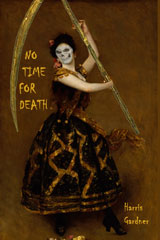 NO TIME FOR DEATH by Harris Gardner
NO TIME FOR DEATH by Harris Gardner
Červená Barva Press, 2022-
Welcome to a world where there is no time for death. It is a place and a state of mind, both for the temporal and the spiritual with space for the mundane and the extraordinary. "No Time for Death' is Harris Gardner's fourth published collection; it is his first in fifteen years. This poetry collection is divided into three sections: An Argument with Time; Contemplating Mortality Instead of My Navel; and Negotiating for An Afterlife. These are serious poems with an undercurrent of humor pervading many of them. The subject matter spans the spectrum of the human condition imbued with faith, hope, and the occasional flicker of regret. It is engaged with the busy-ness of living. "No Time for Death" offers an overarching theme: Take a breath, a revitalizing pause; as for Mortality, slow down; enjoy the most of each day-to-day. What's the rush? Death can wait, can't it?
Harris Gardner has been the Poetry Editor of Ibbetson Street since 2010. He has authored four poetry collections: Chalice of Eros, co-authored with Lainie Senechal (Stone Soup Press) 1998; Lest They Become (Ibbetson Street Press) 2003; Among Us (Cervena Barva Press) 2007; No Time for Death (Cervena Barva Press) 2021. His numerous publication credits include The Harvard Review, A Poet's Siddur, Midstream, Cool Plums, Rosebud, Fulcrum, Chest, The Aurorean, Ibbetson street, Constellations (#6 and #7), Main Street Rag, Vallum (Canada), Levure Litteraire (France), Green Door (Belgium), Muddy River Poetry Review, Wilderness House Literary, Review.com, The Jewish Advocate, The New Renaissance, Endicott Review, Concrete Wolf, I Refused to Die (A Holocaust Anthology of stories of Boston Area Holocaust Survivors and Soldiers Who Liberated the Concentration Camps of World War II), Bagels with the Bards Anthology, Merrimac Mic Anthology, and others.
He co-founded, with Lainie Senechal, Tapestry of Voices, 1999 to the present); Co-founded, with Lainie Senechal, The Boston National Poetry Month Festival, 2001 to the present; Co-founded, with Doug Holder (his brainchild) Breaking Bagels with the Bards, 2005 to the present. Gardner was Poet-in-Residence at Endicott College, 2002-April, 2005. He founded and hosted many poetry venues over the past twenty-two years, a few which ran simultaneously for up to eight years including Boston Borders, Poetry in The Chapel Series (Forest Hills Cemetery), Mad Poets Café (Pawtucket, R.I.); others included The Parker House Hotel, The Laureate Series at Boston City Hall, and, currently, The First and Last Word Poetry Series, Co-founded and co-hosted with Gloria Mindock, 2010 to the present. He has been featured at many venues in New England.
He has been a member of six blue ribbon Poet Laureate selection committees: three for Boston and three for Somerville. His poetry has been nominated for two Pushcart Prizes and he received honorable mention for the New England Poetry Club's Boyle-Farber Prize. In 2015, he received a Life Time Achievement Award From Ibbetson Street Press and a Citation from the Massachusetts House of Representatives. He is currently a member of the Academy of American Poets.
No Time for Death is just the right title for this lovely collection that uses poignant wit and deep feeling to fend off mortality in the only way that poems know how: by keeping time alive in breathing lines. I admire the combination of playful, ebullient imagination and steady, formal restraint in these ranging meditations on transience. There are also some extremely moving poems about Gardner's Jewish heritage. And then there's Gardner's intuitive grasp of the instructive way that language, by its punctuated structure, keeps reminding us of our human predicament, even as it continues beyond the end-stopped lines.
-George Kalogeris, Author of Dialogos (Antilever Press) and Camus: Carnets (Pressed Wafer Press)Harris Gardner's collection, No Time for Death, is sharply aware of mortality. How do we understand the passing of time, and our place in it? How do we come to terms with the certain knowledge that our lives will end? Although these are questions without answers, Gardner, in a poem like "Entreaty to the Trees" finds a way forward through the recognition of the world's healing beauty. The trees exhale "that we may breathe," and they nourish us with their "full blown fruit." They, and we, are sacred parts of the whole.
-Jennifer Barber, Founding Editor, Salamander, author of Works on Paper (Word Works)Harris Gardner's new collection of poems is a contemporary memento mori, a sustained reflection on our mortality. These poems show us many surprising ways the awareness of death insinuates itself into our daily thoughts and most private feelings. With wry and humane wit, Gardner presents us with poetic spells or rituals that do not deny death as much as they put it in its place. Like Dylan Thomas and John Donne before him, Gardner is fully intent on showing us how death shall have in the end no dominion, and that it too will die. When one is committed to life, these poems say, there really is no time for death.
$18.00 | ISBN: 978-1-950063-59-8 | 82 Pages
-Fred Marchant, Author of Said Not Said (Graywolf Press)
New Release: Marsupial Mouth Movements by George Kalamaras
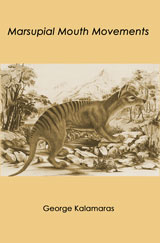 Marsupial Mouth Movements by George Kalamaras
Marsupial Mouth Movements by George Kalamaras
Červená Barva Press, 2021-
George Kalamaras, former Poet Laureate of Indiana (2014-2016), is the author of eleven full-length books of poetry and seven poetry chapbooks. He has received several national prizes for his poetry, and he spent several months in India in 1994 on an Indo-U.S. Advanced Research Fellowship. He is Professor of English at Purdue University Fort Wayne (formerly Indiana University- Purdue University Fort Wayne), where he has taught since 1990. He lives with his wife, writer Mary Ann Cain, and their beagle, Bootsie, in Fort Wayne, Indiana.
In this collection of poetry, Marsupial Mouth Movements, former Indiana Poet Laureate George Kalamaras continues his ongoing series of Bone Sutras, poems that explore the interface of the human and natural world. Following his Surrealist forebears, Kalamaras explores the complexity of language, with startling images and juxtapositions, as a vehicle for visionary poetics. These poems seek to connect biological impulses to the realms of the spiritual and the discursive. In the process, the poems honor the varieties of human and animal life-mammals, marsupials, and the insect world, even probing the intelligence and "vision" that lie at the heart of molecules.
This Kalamaras text delights in the swirl of all-life-power, tasks forth, as if saying to all of us "... sound me toward dissolve." In this life-stream we go through zebra, hippopotamus, marsupial to Chilean poet Nicanor Parra and Van Gogh-all after the thing-in-itself, the as-is, the naked sumptuous flickering. Everything craves, even collectively, pulled toward extinction-in the constant "struggle for freedom." The voice here, an almost-Panda, spotted by "childhurt," goes into "belly-blur"-all is in a "shamanic meltdown." You can taste this volume, its layers and collages of multi-texture, you can read up close and attempt to unlock its codes of juxtaposition, dissonance and multiple bodies, you can also take flight through its various ceremonies and rites of passage, transformed, transfigured and reborn. Or you can sit and inner-eye witness the universe crushing in and out of you. A mega-realized set of teachings, poems, seeing-texts. A rare, one-of-a-kind, genius, collection.
-Juan Felipe Herrera, United States Poet Laureate, 2015–2017George Kalamaras's Marsupial Mouth Movements redefines reincarnation to include myriad transmigrations within a single lifetime. The poet is a traveler who has discovered that "all time happens at once," and his nomadic spirit can inhabit any time, any creature, or any object with wonderful agility. He offers us a surrealist "Mantra Diksha" that initiates us into the Bretonian affinities of everything to everything. Through the example of the fetal marsupial crawling into the mother's pouch to gestate, Kalamaras shows us that birth is not an event but a continuum. The dazzling lyricism of this book, the depth and beauty of its vision, will change the way the reader sees the world.
$18.00 | ISBN: 978-1-950063-30-7 | 79 Pages
-Lawrence R. Smith, author of The Map of Who We Are
New Release: City of Stories by Denise Provost
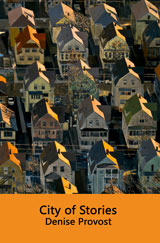 City of Stories by Denise Provost
City of Stories by Denise Provost
Červená Barva Press, 2021-
Denise Provost served for many years in local government and for almost fifteen years in the Massachusetts House of Representatives. She has published in such journals as Ibbetson Street, Muddy River Poetry Review, qarrtsiluni, Quadrille, Poetry Porch's Sonnet Scroll, Sanctuary, Light Quarterly, and in numerous Bagel Bard anthologies. She received the New England Poetry Club's Samuel Washington Allen Award in 2021, and the Best Love Sonnet Award from the Maria C. Faust Sonnet Competition in 2012. Her chapbook Curious Peach was published by Ibbetson Street Press in 2019.
"City of Stories is a full length poetry collection which explores the narratives we construct to shape our world. In three thematic sections, these poems observe the shared experiences of community, reactions to current events, and the imaginative life sparked by interactions with literature. Many of these poems employ formal conventions: Shakespearean and Petrarchan sonnets; quatrains, heroic couplets, the ghazal and the ballade."
Cover art: "Somerville 12" by Steve Imrich
"Both the art and toil of poetry might be summed up as the love of words. In "City of Stories" Denise Provost proves over and over that her romance is fruitful and enduring. The book opens with a series of charming sketches which limn the aura of her hometown city. From there, the "city" metaphor expands, and the reader is guided through realms that are personal, political, historical, literary, mythical, and even all of the above. Among its many surprises, Walt Whitman will declaim his apotheosis of the Internet, Rumi will have his own blog on it, and Maud Gonne will rewrite a famous poem by Yeats. This volume sparkles with bright spirit."
-Tomas O'Leary, author of In the Wellspring of the Ear"Tip O'Neill's famous aphorism can be rightly extended: good poetry, like good politics, is local. Denise Provost's City of Stories sings the neighborhoods, the everyday events, the Honk! festival, Somerville's ArtBeat, Kendall Square, Longfellow Bridge - but reveals these places and events as universal. These poems portray carefully observed daily life around us - people talking on their phones, waiting for buses, listening to street musicians. They suggest a vision of what life everywhere should be: peaceful, leisurely, considerate. Denise Provost's lines weave a scaffold of ordinary scenes; the poetry happens in the spaces between, where it brings us the humane, and the extraordinary."
-Adnan Onart, author of The Passport You Asked For; winner of the 2011 Nazim Hikmet Poetry Award"City of Stories is a book of poems full of awareness and clarity. The verse is strikingly steady and deep-rooted, the subjects oddly near and pertinent, as public as a bridge or tower clock, private as exchanges overheard between parents and children; from the gentrification of endeared neighborhoods, to the maddening rhetoric of our lawmakers. In these poems, Provost demonstrates simply dangerous wit and agility with language. The great surprise the collection offers us is all the fun she manages to have and impart along the way. Here are poems that fairly read themselves to us and then stay with us to remember."
$18.00 | ISBN: 978-1-950063-51-2 | 72 Pages
-Michael T. Steffen, author of Partner, Orchard, Day Moon
New Release: Confini: Poems of Refugees in Sicily by Michelle Reale
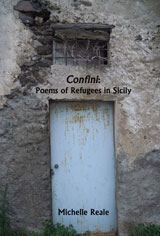 Confini: Poems of Refugees in Sicily by Michelle Reale
Confini: Poems of Refugees in Sicily by Michelle Reale
Červená Barva Press, 2021-
Michelle Reale is a full professor at Arcadia University. She is the author of twelve collections of poetry including Season of Subtraction (Bordighera Press, 2019) and Blood Memory: Prose Poems (Idea Press, 2021). She has twice been nominated for a Pushcart Prize.
Cover art: "Portal" by Michelle Reale
Many Italians see the refugees and migrant workers arriving on Italian shores, mainly in Sicily, as a threat to Italy's economy, culture, demographics, and even its national identity. But who are the actual human beings who often are reduced to a horde of faceless invaders? In Confini: Poems of Refugees in Sicily, Michelle Reale lets us hear their voices by turning the interviews she conducted in Sicily into poetry. In the 27 poems she has created from the refugees' accounts, they tell us of the traumas that forced them to leave their home countries and how they nonetheless yearn for the familiar places (and people) they likely will never see again. They tell of the suffering they endured crossing the Mediterranean in unseaworthy vessels. They speak of the experience of being stateless, homeless, without work. "My cap is the only roof over my head," says "Suleiman." Their voices are anguished, ironic, matter-of-fact, and angry as they recount the quotidian but disorienting realities of adjusting to a new and often hostile society. Reale acknowledges her status as a privileged outsider. In one poem, she bears the brunt of "Ibrahim's" anger at "you white people with your notebooks and microphones." Reale has no illusions that the poems will save "the world or even the people that I wrote them about." But she hopes that they will promote understanding and compassion and ultimately help change inhumane policies.
-George De Stefano, author and journalistA powerful collection, Confini offers a rare and intimate portrait of refugee life in Sicily, showcasing the complex nuances and heart-wrenching realities of lives displaced. Written with raw honesty and startling compassion, these tender, lyrical poems transport readers from the camps of Lampedusa to the streets of Siracusa, portraying the experiences of those navigating the treachery and hardship of life in a new country as they struggle to obtain work and legal status. Driven from their homelands because of severe poverty, economic turmoil, and the brutalities of war, these souls remain preserved in their agency and dignity as they seek to earn a new life free from violence and turmoil. Wrought with hope and compassion, Confini is an essential collection that should be read by anyone who values a deeper understanding of Italy's ongoing refugee crisis.
-Olivia Kate Cerrone, Author of The Hunger SaintHere are cameos of rescued Africans in Sicilian camps. And here is a call to action via her poems. We listen, rapt and dismayed, to the (translated) anguished soliloquies and dialogues of refugees-as they are pulled out of the Sea of Death, barely alive, confronted on the streets with indifference or hostility, in state offices, in the food line, in maternity wards, in work fields-with just enough caritas to permit survival, little more. The ennui and smarrimento that take hold represent the stillness of post-trauma, sometimes alternating with moments of joy and reprieve: dancing to Bob Marley, "patron saint of the struggle." Michelle Reale has insightfully captured all of this baffling human tragedy with poignancy and solidarity, even braving the ireful rebukes of the ethnographic project: "you white people with your notebooks and microphones! [...] you want me to tell a fairy tale or a story of hard luck. Get out!"
$13.00 | ISBN: 978-1950063-25-3 | 35 Pages
-Luisa Del Giudice, Independent Scholar, Los Angeles
New Release: WITH NO SWEAT AT ALL by Alisa Velaj
Translated from the Albanian by Ukë Zenel Buçpapaj
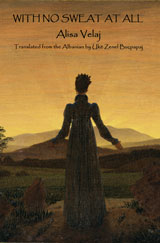 WITH NO SWEAT AT ALL by Alisa Velaj
WITH NO SWEAT AT ALL by Alisa Velaj
Translated from the Albanian by Ukë Zenel Buçpapaj
Červená Barva Press, 2021-
About the Author:
Alisa Velaj was born in Albania, in 1982. She holds a Ph.D. in Albanian Language and Literature, which she has been teaching as subjects at university level, while writing poetry, prose, essays, articles, and research studies. Velaj was shortlisted for the annual international Erbacce-Press Poetry Award in UK in June 2014. Her work has been published in over 100 international online forums, printed magazines and anthologies across many countries (USA, UK, Sweden, Australia, Israel, India). Alisa earned an Artist-in-Residence Scholarship in February 2019 and attended the AIR Litteratur Västra Götaland Program in Villa Martinson, Jonsered, Sweden. In 2020, she won The National Prize in Poetry, awarded by the Albanian Ministry of Culture.About the Translator:
$18.00 | ISBN: 978-1- 950063-46-8 | 77 Pages
Ukë Zenel Buçpapaj is an Albanian writer who has published books of poetry and prose at home and abroad. His translation work has appeared in Denver Quarterly (USA, 1994); Seneca Review (USA, 1995); Modern Poetry in Translation (UK, 1996); Visions International (USA, 1996 and 1997); The Year Book of American Poetry (USA, 1997); Grand Street (USA, 998); Fence (USA, 1999) etc. He had also translated several great poets into Albanian. Among them, worth mentioning, are: Walt Whitman, Emily Dickinson, Robert Frost, Thomas Stearns Eliot, Ezra Pound, William Butler Yeats, Ana Ahmatova, Arthur Rimbaud, Octavio Paz, Seamus Heaney, Allen Ginsberg, Philip Larkin, John Ashbery, Mark Strand, Rita Dove, Lucille Clifton, Sylvia Plath, Wallace Stevens, Gerald Stern, Carolos Williams, E. E. Cummings, Robert Lowell, Yehuda Amichai, Ronny Someck, and Naim Araidi. He holds the following titles: 'International Visitor' ( USA , 1992); 'Honorary Fellow in Creative Writing' (University of Iowa, USA, 1992) and 'Fulbright Scholar' (University of Iowa, USA, 1992). A Professor Doctor, he is currently teaching Comparative Literature, Literary Translation, Contrastive Linguistics and Study Skills at the University.
New Release: In the Arms of the Father Poems by Flavia Cosma
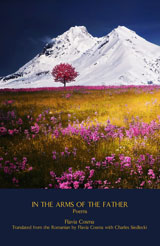 In the Arms of the Father Poems by Flavia Cosma
In the Arms of the Father Poems by Flavia Cosma
Translated from the Romanian by Flavia Cosma with Charles Siedlecki
Červená Barva Press, 2021-
A recipient of the John Dryden Prize for poetry in translation - edition 2007, the poetry collection In the Arms of the Father by Flavia Cosma is a remarkable representation of the high poetic accomplishment of a true "international" author. Flavia Cosma is a Romanian born poet, living in Canada and published widely in numerous countries and languages. Deeply metaphysical, this book gathers between its covers the permanent osmosis of the poet's state of mind and consciousness with the divinity and the wealth of nature. And just under this perspective, wonderful glimpses of the passage of time are coming to life, filtered through Flavia's particular sensitivity. Cosma seems to possess the magic of touching things with words, to caress them, to vivify them. Her inner world finds and receives its necessary living space from a true and real coincidence between man and his surrounding. The influence of multiple poetic traditions, combined with the poet's personality, find in the "Arms of the Father" the dimension absolute that opens up from the concreteness of reality to the mystery of life.
Flavia Cosma is a Romanian-born Canadian writer, poet and translator. She is also a professional photographer and producer, director and screenwriter for television documentary films. Flavia has published poetry, prose, children's literature and travel memoirs. Her books were translated and published in various countries and languages. Flavia has a Master's in Electrical Engineering from the Polytechnic Institute of Bucharest, Romania. Cosma's poetry books Leaves of a Diary, Thus Spoke the Sea and The Latin Quarter were studied at Universities in Canada and USA during the school years 2008, 2014, and 2017. A recipient of several international literary awards Flavia Cosma is the director of The Biannual Writers' and Artists' Festivals at Val-David, Quebec, Canada. www.flaviacosma.com
Charles Siedlecki is an educator, writer, translator and poetry editor living and working in Toronto, Canada. He received a degree in English Literature and Art History from the University of Toronto, and later took a fellowship at AKADEMIA SZTUK PIEKNYCH w WARSZAWIE (The Warsaw Academy of Fine Arts). He received the Third Prize in the 2007 Dryden Translation Competition for co-translating together with Flavia Cosma her poetry book In the Arms of the Father-prize awarded by British Comparative Literature Association/British Centre for Literary Translation. Charles Siedlecki's poetry collection Somewhere in the Universe was published by KCLF-21 Press, Toronto in 2008.
Embraced by lush foliage and endearing forest friends in the real and imagined world, Flavia Cosma's poems are inhabited by all of these in a larger cosmic understanding; lit by a spiritual incandescence that few possess in this worldly world. Her poems are havens of precious moments lingering over metaphors of porcupines and snakes, spiders and dogs, lion-fish, peacocks and crows, the wind and rain, seasons, blue snow and a purple wave that spills onto blank sheets of paper. Her lines “The returning steps of the Poet / On silks filled with grace” is for me Flavia walking her words. While her words have soft contours, they also alert us to the harsh realities of “Air no longer reaching the lungs / Dissolves into fog / And screams,” reminding us of the current pandemic in the world. As a line in her meditative book says "He, who is consumed by fire will never rot," I believe this is true of poet Flavia Cosma who is a gentle flame and her words will live forever.
"All manner of thing shall be well
When the tongues of flames are in-folded
Into the crowned knot of fire
And the fire and the rose are one." T.S. Eliot-Bina Sarkar Ellias, Poet, Art curator, Editor, Designer & Publisher Int. Gallerie, Mumbai, India
Flavia Cosma always delivers. Her latest book, In the Arms of The Father, is a delight. Evident once again is her exemplary language of the senses that is startling and beautiful as it expresses harmony with self and the universe. The spirituality inherent in Cosma’s language is undeniable. Enjoy the lyrical journey that is provided by this fascinating poetry collection.
$18.00 | ISBN: 978-1-950063-05-5 | 102 Pages
-Alan Britt, Dream Highway
Towson University
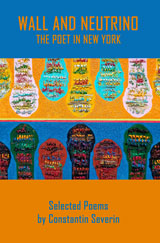 WALL AND NEUTRINO THE POET IN NEW YORK Selected Poems by Constantin Severin
WALL AND NEUTRINO THE POET IN NEW YORK Selected Poems by Constantin Severin
Červená Barva Press, 2021-
Constantin Severin is a Romanian writer and visual artist, founder and proponent of Archetypal Expressionism, a highly regarded global art movement, which he founded in Bukovina, in 2001, as well as co-founder of 3rd Paradigm International Artists Group. A graduate of the International Writing Program at the University of Iowa, he has published ten books of poetry, essays and fiction. One of his poems was included in the 2014 World Literature Today anthology, After the Wall Fell: Dispatches from Central Europe (1989–2014), aimed at popularizing post-Wende Central European literature on the twenty-fifth anniversary of the fall of the Berlin Wall. Severin's conceptual art and artworks have appeared in Artdaily, World Literature Today, It's Liquid, Levure littéraire, Empireuma, Contemporanul, Vatra, Arkitera, Glare Magazine, Cuadernos del Ateneo, Dance, Media Japan, and other international art and literary magazines.
Cover: art by Constantin Severin
Website: http://constantinseverin.ro/
All of Constantin Severin's work which I've seen proceeds from a single steady universal pulse - his poetry and fiction, his editing, his artwork and his organizing. It's as if he'd simply alighted and settled somewhere slightly above and askew from this world, colonized that spot, and begun processing reality and producing art in this sublime frame ever since - like an own industry; like a small steady sun. In its steady universality, grounded in a strong particular European lineage, Constantin has managed to produce a body of work - and chiefly I am speaking of his poetry here, although it may also be true of his painting - which is somehow also unmarked, by which I mean both that it is unsullied, and also without jagged edges on which to snag. It is often the jagged edges by which one becomes acquainted with work of sometimes lesser or flashier poets. Thus, it becomes somehow easy to overlook Constantin's body of work, in our crush of days - to miss its significant achievement. I believe history will be kind to Constantin Severin in this regard. His work is like a beautiful species of animal or plant which exists regardless of our noticing. It is a natural fount of clear coherent poetic output simply flowing, unselfishly and whole. His is a tree of ripened aesthetic fruit, ready to nourish us unstintingly in delight and recognition - if only we happen upon it. Here it is.
$18.00 | ISBN: 978-1-950063-44-4 | 94 Pages
Andrew Singer
Trafika Europe
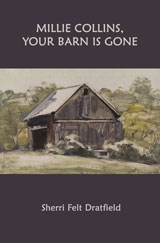 Millie Collins, Your Barn is Gone by Sherri Felt Dratfield
Millie Collins, Your Barn is Gone by Sherri Felt Dratfield
Červená Barva Press, 2021-
Sherri Felt Dratfield graduated from Goucher College and is a member of the Phi Beta Kappa Society. She received an M.F.A. in Acting from the University of Denver and holds a J.D., with election to Order of the Coif, from New York University School of Law. Sherri is the author of two previous collections of poetry, The City (Finishing Line Press, 2013) and Water Vigils (Finishing Line Press, 2014). Both collections were nominated for a Pushcart Prize. Her poems have appeared in various journals and anthologies and have been awarded recognition in the Margaret Reid Contest for Traditional Verse, Jewish Currents' Raines Poetry Competition and the Passager Poetry Contest. Sherri lives in the West Village of Manhattan with her husband, Simon. They visit their shore home in Ventnor City, New Jersey during all seasons.
Sherri Felt Dratfield's new collection Millie Collins, Your Barn Is Gone explores change, loss, healing and renewal. Its sections correspond to Ecclesiastes' "to everything there is a season..." The poems take us from Venice, Italy to the seashore to the cafes of New York City; from learning a vaudeville song with Jimmy Durante to engaging the Madona in a Bellini Triptych to examining the divinity of an egg.
Sherri Felt Dratfield goes from strength to strength in this, her third book of poems. Gazing on minute details, she finds miracles in ordinary life, whether on city streets, on the shore, in her beloved Venice, or in her childhood. She writes joyfully of the woman on a dune, Murano leaves, a remembered song. And yet, devoted as she is to earthly realities, an underlying mysticism pervades this collection. Reading it, we are taken far beyond and under and above the world she captures in words to a place where only silence prevails. This is the remarkable effect of "Two O'Clock Bells," in which she watches the Campanile and hears, "three bells in unison./ I saw sound and felt life echo - /brief, gone."
-Grace Schulman, Winner of the Frost Medal for Distinguished Lifetime Achievement in American Poetry and Member of the American Academy of Arts and LettersThe exquisite poems in Sherri Felt Dratfield's brilliant, luminous Millie Collins, Your Barn Is Gone draw on mythology and geography to explore themes of identity, memory, love, and loss. At once spiritual, intimate and worldly, they weave a rich tapestry of alchemical music. Inhabited by recurring angels, bristling with flurries of animals and a cornucopia of flowers, this collection is a feast for all the senses and a testimony to the redeeming power of beauty. To read Felt Dratfield is to be edified and entranced. She takes us down the rabbit hole in the magical "Arboreal," one of several stunning ekphrastic poems. Her timeless, exacting poetry lavishes us with blessings that "course veinlike through [our] hearts" and like "stronger tides forge fiercer bonds."
$18.00 | ISBN: 978-1-950063-07-9 | 97 Pages
-Hélène Cardona, Independent Press Award and International Book Award Winner
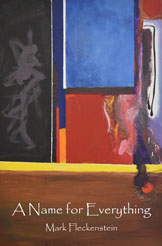 A Name for Everything by Mark Fleckenstein
A Name for Everything by Mark Fleckenstein
Červená Barva Press, 2020-
Mark Fleckenstein was born in Chicago. Six states and dozens of moves later, he settled in Massachusetts. He graduated from University of North Carolina Charlotte with a B.A. in English, and Vermont College of Fine Arts with a MFA in Writing. He's been very involved in the poetry community in and around Boston, for over 30 years. He was an assistant editor for (BLuR), the Boston Literary Review, founder/coordinator of two bi-weekly poetry reading series in Boston and a workshop leader, He is also a painter. He has two amazing daughters and a large, eccentric, long-haired black cat named Ariadne.
A Name For Everything is an impressionistic, densely imaged book of poems that explore memory: the residue, metaphysics, existential condition, the emotional location. The poems require the reader to put aside conventional expectations of contemporary lyric poetry and demand the reader's full attention. Whatever narrative exists, is fragmentary; elliptical and developed imagistically. It's best to surrender to these poems, with your eyes and mind opened wide.
Cover Artist: Mark Fleckenstein
$18.00 | ISBN: 978-1-950063-04-8 | 49 Pages
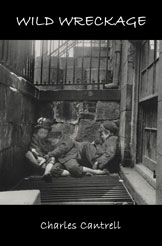 WILD WRECKAGE by Charles Cantrell
WILD WRECKAGE by Charles Cantrell
Červená Barva Press, 2020-
Charles Cantrell's chapbooks are Cicatrix and Greatest Hits. His awards include grants from the Wisconsin Arts Board, a scholarship from the Fine Arts Work Center, residencies from Ragdale, Ucross, the Vermont Studio Center, the Virginia Center for the Creative Arts, and three Pushcart Prize nominations. Mr. Cantrell, an Air Force veteran, received his MFA from Goddard College (now at Warren Wilson). He taught for several years at Madison Area Technical College and lives in Madison, Wisconsin with his wife and son.
"Make some music in the wreckage," fictional poet Paul Chowder advises in Nicholson Baker's Traveling Sprinkler (2013), and real-world poet Charles Cantrell takes up that challenge in poems that thrum with romanticism amid bruise and ruin, amid the clamorous machinery of America. Wild Wreckage offers homage to labor and language, and to the "great / distance between love and silence" that these poems make palpable with clarity and affection.
-Michael WatersIn a world of wild wreckage-a world of piss odors and mop buckets, salt sweat and snake skins, black rot and fodder-an alcoholic father might die drunk on the railroad tracks, a long-suffering mother might be attacked with a kitchen skillet, someone might light a fuse in his sock on a passenger plane or knock a daughter's teeth out, and sadness might ultimately be expected to win out over happiness. But if that world also contains a father who teaches his son to write his name on a fogged-up windowpane, a mother who encourages her son to dance, and a poet who manages, time after time, "to say it right, rhythm/ and tone exact," allowing that although "love and shit get mixed up," "maybe the light holds a story," then the wreckage of Charles Cantrell's title is not only wild, but wonderful and necessary. If Cantrell's is a world of blues and bruises, it also embraces Wittgenstein's "sense of care," and Lorca's "brief, but furious hope," finding ways, like Levertov, "to ease the dread and silence." With a toughness of mind and heart, in richly textured and often luminously lyrical language, Cantrell finds "the perfect knowing" as, shining through the wreckage, "love stands on every corner" of this wild and wonderful book.
$18.00 | ISBN: 978-1-950063-16-1 | 78 Pages
-Ronald Wallace
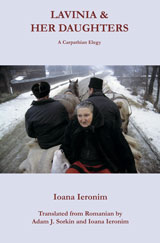 LAVINIA & HER DAUGHTERS A Carpathian Elegy
LAVINIA & HER DAUGHTERS A Carpathian Elegy
by Ioana Ieronim
Translated from Romanian by Adam J. Sorkin and Ioana Ieronim
Červená Barva Press, 2020-
Ioana Ieronim is a distinguished Romanian writer, author of more than ten collections of poetry (three in English) and a volume of drama. Her narrative poetry in Lavinia and Her Daughters as well as The Triumph of the Water Witch (Bloodaxe Books, 2000, translated with Adam J. Sorkin-Shortlisted for Oxford-Weidenfeld Translation Prize, St. Anne's College) was hailed as groundbreaking. Ieronim has participated in numerous international poetry festivals, and her translations include drama from Shakespeare to Tony Kushner. She was cultural attaché of the Romanian Embassy in Washington, DC (1992-96) and thereafter served the Soros Foundation and the Fulbright Commission in Bucharest. She divides her time between Bucharest and Washington.
Adam J. Sorkin, an award winning translator of contemporary Romanian poetry, was introduced to Ioana Ieronim in the summer of 1989 when he was in Bucharest on his second Fulbright grant.
Cover photo: Kathleen Laraia McLaughlin
Photo taken in Romania from the album "The Color of Hay."A recommended book by Small Press Distribution!
$18.00 | ISBN: 978-1-950063-37-6 | 109 Pages
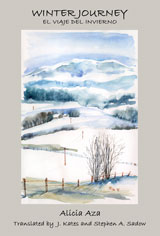 WINTER JOURNEY EL VIAJE DEL INVIERNO by Alicia Aza
WINTER JOURNEY EL VIAJE DEL INVIERNO by Alicia Aza
Translated by J. Kates and Stephen A. Sadow
Červená Barva Press, 2020-
About the Author
Alicia Aza, by profession an attorney specializing in corporate law in Madrid, has published four books of poems. Both El libro de los árboles and Las Huellas fértiles (2014) were nominated as finalists for the Andalusian Premio de la Crítica. El viaje del invierno (2011) won the International Rosalía de Castro Poetry Prize. Arquitectura del silencio (Architecture of Silence) was published by Valparaíso Editions first in the original Spanish only (2017) and then in a bilingual edition in 2018. Aza's literary work has appeared in many international journals and anthologies and been translated into Arabic, Bulgarian, French, Italian, and Serbian, as well as into English. She is a member of the Writers' Association of Spain and vice president of La Asociación Internacional Humanismo Solidario.
About the Translators
J. Kates is a minor poet, an award-winning literary translator of Russian and French poetry and the co-director of Zephyr Press. He has been granted three National Endowment for the Arts Fellowships and an Individual Artist Fellowship from the New Hampshire State Council on the Arts. He has published three chapbooks of his own poems and one full book, The Briar Patch (Hobblebush Books). He is also the translator of a dozen books of Russian and French poetry, has edited two anthologies of translations, and collaborated with Stephen A. Sadow on a half dozen books of Latin American and Peninsular Spanish poetry in translation.
Stephen A. Sadow is Professor Emeritus of Latin American Literature and Jewish Studies at Northeastern University in Boston. He specializes in Latin American Jewish literature and art. Among Sadow's books are King David's Harp: Autobiographical Essays by Jewish Latin American Writers, winner of a National Jewish Book Award and his translations of Mestizo, A Novel by Ricardo Feierstein, Unbroken: From Auschwitz to Buenos Aires, the autobiography of Holocaust survivor Charles Papiernik, and Philosophy and other Fables, short essays by Isaac Goldemberg. With J. Kates, he has co-translated poetry by César Tiempo, Teodoro Ducach, Rosita Kalina, Angelina Muñiz-Huberman, Miryam Gover de Nasatsky, Ricardo Feierstein, José Pivín, Isaac Goldemberg, Susana Grimberg, Daniel Chirom, Sonia Chocrón, and Alicia Aza.
Cover art: Michèle Oliva
$18.00 | ISBN: 978-1-950063-36-9 | 55 Pages
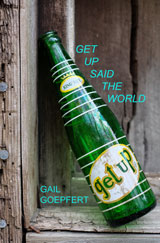 Get Up Said the World by Gail Goepfert
Get Up Said the World by Gail Goepfert
Červená Barva Press, 2020-
Gail Goepfert, an associate editor at RHINO Poetry, is a Midwest poet, photographer, and teacher. She's the author of a chapbook, A Mind on Pain (2015) and Tapping Roots, released by Kelsey Books (2018). She's received five Pushcart Nominations. Her poems rode a PACE bus, were set to music, posted next to a sculpture in a park, and folded into an origami book. Currently, she teaches poetry for National Louis University and writes book reviews for RHINO Reviews. Goepfert's poems have appeared in many journals and anthologies including Sugar House Review, Stone Boat, Postcard Poems and Prose Magazine, Bluestem, Open: Journal of Arts and Letters, The New Verse News, SWWIM, and Beloit Poetry Journal. She lives in Illinois. More at www.gailgoepfert.com
Get Up Said the World is a personal exploration of the profound and universal dualities of life. The book begins by stacking up evidence why someone would want to pull the covers over our heads-each poem illuminating a new reason: loneliness, lack of purpose, lost youth, physical and emotional pain, longing, abuse of power, man's ineptitude and cruelty. The poet amasses a soul-deadening weight that risks paralysis and despair. In the second half, she takes the given world and derives personal meaning from it in a way that shows the ravishing beauty and richness around us. We are led through triumphant images of nature, kindness and courage by the skilled hands of a priestess of the beautiful. These poems often become meditations, meanderings of the poet's mind that lead to a rejuvenation bordering on the spiritual. They depict everyday glories with a simplicity that gets to the heart.
"In Get Up Said the World, Gail Goepfert's stunning full-length poetry collection, every poem is either an elegy or a love poem to the world. Bringing forth her lyrical and narrative gifts, Goepfert pays close attention to both the sorrow and beauty that are the price and prize of being fully human, looking unflinchingly at disconnection, violence, and death, while also turning her gaze to those unexpected moments of human redemption that make it all worthwhile. Like the book's title, these poems are a wake-up call reminding us that "the simplest things last," and that our true heart's home can be found in the consolations of nature, family, and authentic human connection. With a photographer's eye, Goepfert brings us poems that celebrate both light and shadow, but always with a poet's determination to sing despite the noise of the world, refus[ing] to hush the bee box inside me."
-Angela Narciso Torres, author of Blood Orange"In poems both searing and tender, each married to a dictionary definition, Gail Goepfert creates a new lexicon for loss, for remembering, for relishing the ordinary. She offers readers the world with all its flaws, celebrates each observation, reminds us that there is "No way to backspace, delete what's soulless." Get Up Said the World is a collection that will leave readers enraptured with the details of daily living and the words used to define it."
-Donna Vorreyer, author of Every Love Story is an Apocalypse Story"Gail Goepfert's, Get Up Said the World, is a unique meditation on relationships and life. Poignant and playful, these poems stay in our minds and ask through images and definitions: How do we persist in this living? Goepfert's distinct form gives readers an inspiring way to view the present and past while also allowing the poems to reverberate with each additional read. Topography shifts. Swiftly... I want to stay untamed-smart, engaging, and thoughtful in their appreciation of the nuances of language, the beauty of these poems will enhance your imagination and make you grateful for their stories."
-Kelli Russell Agodon, author of Author Hourglass Museum and The Daily PoetCover Art: Rob Vaughn @followrobv
$18.00 | ISBN: 978-1-950063-24-6 | 121 Pages
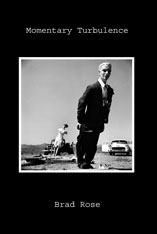 Momentary Turbulence by Brad Rose
Momentary Turbulence by Brad Rose
Červená Barva Press, 2020-
Brad Rose was born and raised in Los Angeles and lives in Boston. In addition to Momentary Turbulence, he is the author of a collection of poetry and flash fiction, Pink X-Ray (Big Table Publishing, 2015, http://pinkx-ray.com and Amazon.com.) Brad has two forthcoming books of poems, WordinEdgeWise, from Cervena Barva Press, and de/tonations from Nixes Mate Books. He is also the author of five chapbooks of poetry and flash fiction. Four times nominated for a Pushcart Prize, and once nominated for Best of the Net Anthology, his poetry and micro fiction have appeared in, The Los Angeles Times, The American Journal of Poetry, Sequestrum, Hunger Mountain, Folio, decomP, Lunch Ticket, The Baltimore Review, and other publications. His story, "Desert Motel," appears in the anthology Best Microfiction, 2019. Brad's website is: www.bradrosepoetry.com
"The paragraphs in Momentary Turbulence are perhaps the closest we will get to that razor edge where prose poem and story balance perfectly. They also highlight the many ways in which the works in verse here recall Pound's dictum that poetry must be as well written as the best prose. If it didn't have such a big Yankee heart, Momentary Turbulence might also be the answer to the question of what a Robert Bolano raised north of the border would look like: blue collar pomo, searing, with a noir eye. But there is a twinkle in that sad smile, a delight in the beauty of a toxic sunset that comes from knowing just how long night will last."
—Ron Silliman, author of The Alphabet. (https://www.poetryfoundation.org/poems-and-poets/poets/detail/ron-silliman)"Momentary Turbulence—a perfect name for this Brad Rose collection of prose poems. They take but a few moments to read and are filled with wondrous turbulence. Rose has an uncanny ability to write a sentence, fling it into space, and have it return in perfect harmony from its journey—matching up to the following sentence. These terrific stories leap from philosophy to stand-up, and add a little mystery and some shtick. But make no mistake about this description—this is the work of a pro who wields language liked a sculpture wields his hammer and chisel—chipping away at every unnecessary word. Bring a copy of this book for a hostess gift—it'll hold so much better than the wine you were considering."
—Paul Beckman, author of Peek"The good folks in Brad Rose's Momentary Turbulence live like we all do, alone alone or alone around other people. They know "the emptiness of one thing is in the emptiness of all things. This is the shock of the world." When one of them splits the skin of a prose poem to stick out his head, look right at me, and say, "I warn you my friend, never turn off your eyes. The trees lie in wait. You never know when you're going to hear shots," I listen. You should, too. We're heading into some rough wind and this book will help us through."
$18.00 | ISBN: 978-1-950063-09-3 | 52 Pages
—Christopher Citro, author of The Maintenance of the Shimmy-Shammy
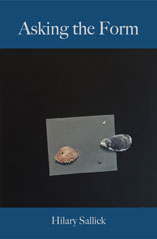 Asking the Form by Hilary Sallick
Asking the Form by Hilary Sallick
Červená Barva Press, 2020-
Poet and educator Hilary Sallick lives and works in Somerville, MA, where she and her husband raised their two children. She teaches reading and writing to adult learners and serves as vice-president of the New England Poetry Club. Her longtime interest in the potential of poetry to build community and to foster deep learning grounds all her work. Her chapbook, Winter Roses, was published in 2017. Asking the Form is her first full-length collection.
About Asking the Form
As its title suggests, the poems in Hilary Sallick's Asking the Form raise questions about and through form: If I place my trust in form, where will it take me and how can its meaning grow? What connections can I discover by asking the form? A milkweed pod, the human body, time itself are all subjects and forms under consideration, and the poems experiment with the sonnet, villanelle, pantoum, and other traditional forms as well. The collection ranges widely in theme, from children and relationships to art and nature; and in setting, from small interiors to large vistas, from New England to Texas. The voice that arises through these poems, at times intimate, at times cool, is distinct.
With a watercolorist's perception of how the eye sees and a musician's feel for the shape of sound, Hilary Sallick pulls the reader in close in Asking the Form. The poems unfold quietly, unerringly, through the accumulation of subtle observation and depth of insight. In "Watercolor at Long Pond," she writes that "The coming and going the here / and not here intertwine," and her ability to capture flux is an essential part of her gift. She trusts the reader to journey with her, to contemplate alongside her, and to explore with her the contours of the inner and outer, the irreplaceable moments of a life.
-Jennifer BarberI very much admire the beauty, depth and intensity of this collection, in which Hilary Sallick takes the materials of daily life and shapes them into profound meditations on life itself. The book's first poems consider the various containers that enclose us; a later group brings us painfully close to the experiences of a dying man. The title poem, a sonnet sequence, reflects on making art in the midst of one’s life, as Sallick continues to work on the sonnet, "this sieve, with water running through," while both grounded and interrupted by her small son's hands, "red with cold, shaped for impatient understanding." Asking the Form's authentic questioning is only equaled by the skill and grace of its poetry.
-Susan Donnelly author of The Path of ThunderHilary Sallick's Asking the Form is a wise and beautiful exploration of the poet's perennial question-where to begin? The poems are like little rooms of meditation where one ponders the pointillist nature of the creative impulse-the gathering, the listing, the organizing, the chronicling that must somehow be shaped into coherence and revelation. However, as I read the poems again, I began to understand that these are also the revelation! These are the paths leading to the poem! This is the wonderful work that Sallick performs in Asking the Form. The well-wrought organicism of these poems puts one in the mind of Aristotle's notion of entelechy: that there is something in an organism that knows what it must become-but at each point of its becoming it is surprised by what it is! And these poems are surprising, for they are of a writer being written-being shaped into being by her own need and urge and breath. The poems in Sallick's Asking the Form, are not just sculpted scripts for the page-they are also made for the ear and the mouth! Sallick's phrasings need to be heard aloud, and are a joy to speak. And so the reader, transformed as listener, finds another form of pleasure: music.
$18.00 | 978-1-950063-18-5 | 81 Pages
-Regie Gibson
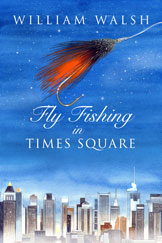 Fly Fishing in Times Square by William Walsh
Fly Fishing in Times Square by William Walsh
Červená Barva Press, 2020William Walsh is the author of four books of poetry, four novels, three film screenplays, a collection of interviews, an anthology of contemporary American poetry, and a collection of essays. He is the director of the Etowah Valley M.F.A. Program at Reinhardt University in Waleska, GA where he teaches graduate and undergraduate creative writing and literature. Among his awards for his writing, he has received the 2018 Cervena Barva Press Editors Book Series Award, Georgia Author of the Year, and has been recognized by the Association of American University Presses as a Selection for Public and Secondary Libraries. He has been a finalist or semi-finalist in many competitions, including, among others, the Glimmer Train Short Story Contest and the William Faulkner "William Wisdom Creative Writing Competition" for his novels The Boomerang Mattress, Haircuts for the Dead, and The Pig Rider. His work has appeared in AWP Chronicle, Cimarron Review, Five Points, Flannery O'Connor Review, The Georgia Review, James Dickey Review, The Kenyon Review, Literary Matters, Michigan Quarterly Review, North American Review, Poetry Daily, Poets & Writers, Rattle, Shenandoah, Slant, and Valparaiso Poetry Review. Known for his literary interviews, he has interviewed some of the most highly respected writers in the world, including A.R. Ammons, Doris Betts, Richard Blanco, David Bottoms, Joseph Brodsky, Pat Conroy, Harry Crews, James Dickey, Ariel Dorfman, Mark Doty, Rita Dove, Stephen Dunn, Eamon Grennan, Mary Hood, Edward Jones, Madison Jones, Donald Justice, Ursula Le Guin, Andrew Lytle, Czeslaw Milosz, George Singleton, Lee Smith, and many others. Originally from Jamestown, NY, he has resided in Atlanta since 1980.
"Memory, nostalgia, a changing America. The magic of the animal world and the fragility of all creatures. An eschewing of what is manmade and crowded and impersonal. Comradeship, sports, and competition. Beautiful unfulfilled mothers, the difficult communication of fathers and sons. William Walsh's Fly Fishing In Times Square is a love letter to Americana, a love letter to America. Each of these exacting, spectacular poems come around the corner like long lost friends to kiss each reader on the cheek."
—Denise Duhamel"William Walsh is a master of the narrative poem. In Fly Fishing in Times Square, he investigates memory, the self, family, and being with sculpted imaginal and aurally textured confidence. His poems elucidate rather than purposefully befuddle; they refresh rather than freight; they revivify rather than siphon a reader's emotional energy. However, Walsh is not afraid to step into the dark and witness existential matters—but it’s in this lack of hesitation to do so-as well as his ability to explore a wide gamut of both macroscopic and microscopic motifs-that makes his poems so beautiful. They are manifestations of "what happens / when imagination confronts the universe." Fly Fishing in Times Square is a book I'll read more than once; it's the sort of collection that teems with ideas and leads others to their own inspirations."
—William Wright"William Walsh's new poems prove, once again, that 'there's no controlling the world's divine mysteries. With amazing vision and linguistic skill Walsh explores the desires and realities of domestic life in America. Reading these fine poems we are drawn into a complex world of family where separation is natural and memory provides the only means of holding on. These powerful poems never fail to lead us to ask the right questions about family and the wilderness, the world and our place in it."
-David Bottoms"With a keen and painterly eye, Bill Walsh masterfully renders the poetic, mysterious landscapes of memory and place, capturing his spiritual and physical self amid his intangible and tangible worlds that embrace us and become ours. I feel completely at home in these poems that question the very idea of home through imagery and language that is wise with longing, powerfully tender, and passionately at peace."
-Richard Blanco, Presidential Inaugural PoetReviews:
$17.00 | ISBN: 978-1-950063-14-7 | 78 Pages
http://dougholder.blogspot.com/2020/06/fly-fishing-in-times-square-by-william.html
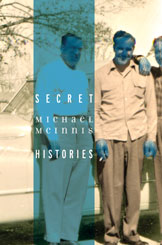 Secret Histories by Michael McInnis
Secret Histories by Michael McInnis
Červená Barva Press, 2019Michael McInnis lives in Boston and served in the Navy chasing white whales and Soviet submarines. His poetry and short fiction has appeared in Chiron Review, Cream City Review, Deadly Writers Patrol, Naugatuck Review, Oxford Magazine, Unlikely Stories and Yellow Chair Review to name a few. He was the founder of the Primal Plunge, Boston's only bookstore dedicated to 'zines, underground culture, and small press literature. His previous two books, Hitchhiking Beatitudes and Smokey of the Migraines were both published by Nixes Mate Books.
More Praise for Secret Histories
Secret Histories, by Michael McInnis, is a journey from sea to sky, where you "see the stars in each swell, as if land exists only at the pleasure of the ocean." Mermaids walk amongst us, and fortune may allow us to trace their tattoos with our tongues. There are secret messages in storms and unquenchable thirsts, and a girl named Lucy, whose skin we can't stop thinking about. McInnis shows us "how we dream up gods in our desert consciousness," knowing that all the while, the sharks feed below.
$17.00 | ISBN: 978-1-950063-10-9 | 122 Pages
-Heather Sullivan, author of Method Acting for the Afterlife
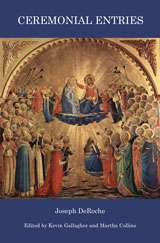 CEREMONIAL ENTRIES by Joseph DeRoche
CEREMONIAL ENTRIES by Joseph DeRoche
Edited by Kevin Gallagher and Martha Collins
Červená Barva Press, 2019-
Joseph DeRoche (1938-2013) taught at Northeastern University for many years. This collection gathers all of his published poems, and many of his unpublished ones.
ABOUT THE EDITORS
KEVIN GALLAGHER is a poet, publisher, and political economist living in Boston, Massachusetts with his wife, Kelly, kids Theo and Estelle, and dog Rexroth. His recent books of poetry are Radio Plays, And Yet it Moves, and Loom. Gallagher edits spoKe, a Boston-area journal of poetry and poetics. He works as a professor of global development policy at Boston University.MARTHA COLLINS is the author of nine books of poetry, most recently Night Unto Night and Admit One: An American Scrapbook. She founded the Creative Writing Program at U.Mass-Boston and served as Pauline Delaney Professor of Creative Writing at Oberlin College for ten years. Her tenth book, Because What Else Could I Do, is forthcoming from the University of Pittsburgh in fall 2019.
With razor-sharp wit and élan, Joseph DeRoche's poems remind us that revelation is never easy-that it often comes at great cost as we "loat to Paradise / In a slaughter / Of small things." DeRoche's poems are as formally taut as they are conversationally playful. His impeccable, architectural eye for detail creates a language that unmakes and reshapes the coercive structures that constrict our speech. In poems that delightfully blur the boundary between body and spirit, the individual human utterance becomes "an ordering / Against the furious weather / Of the world’s silence." Thanks to editors Kevin Gallagher and Martha Collins, a new generation of readers will now have the opportunity to experience the lyric grace and benevolence of DeRoche's brilliant poems.
-Tony Trigilio, author of The Complete Dark Shadows (of My Childhood), Book 1Joe DeRoche's poems are tough and tender minded-and tough and tender hearted. Artfully arranged from early to late, they begin by exploring contraries in conflict: ornamentation and spareness, say, or the starkly observed and the richly imagined. But their sharpest focus throughout is on the spiritual and secular frameworks used to assess the competing claims of body, mind, and soul, and of faith and doubt in divinity, love, and poetry itself. The collection's title says a sense of ritual unites the poems. It does, as their ceremonies lead from struggles between conflicting goods toward acceptance that the world and our experience of it is always sacred and profane: a place where Satan may be a saint and the light in an image of the infant Jesus Christ can seem as earthbound as celestial, where love can redeem and debase, where poetry can transform, disinfect, and merely feint or fail or cheat. DeRoche variously registers that acceptance in warm approval, bemused or startled recognition, or eerily calm alarm. Meanwhile, whether rhymed and metrical or free, his gay devotional verse repeatedly achieves the mysterious interaction between prosodic shape and developing content Robert Hass says is meant by poetic form.
$17.00 | ISBN: 978-1-950063-32-1 | 211 Pages
-Guy Rotella, professor Emeritus, Northeastern University, author of Castings: Monuments and Monumentality in Poems by Elizabeth Bishop, Robert Lowell, James Merrill, Derek Walcott, and Seamus Heaney
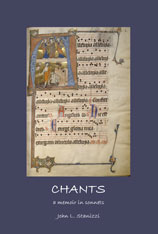 CHANTS a memoir in sonnets by John L. Stanizzi
CHANTS a memoir in sonnets by John L. Stanizzi
Červená Barva Press, 2019-
John L. Stanizzi is author of the collections – Ecstasy Among Ghosts, Sleepwalking, Dance Against the Wall, After the Bell, Hallelujah Time!, High Tide - Ebb Tide, and Chants. His poems have appeared in Prairie Schooner, American Life in Poetry, The New York Quarterly, Paterson Literary Review, The Cortland Review, Rattle, Tar River Poetry, Rust & Moth, Connecticut River Review, Hawk & Handsaw, and many others. His work has been translated into Italian and appeared in El Ghibli, in the Journal of Italian Translations Bonafinni, and Poetarium Silva. His translator is Angela D'Ambra. John has read and venues all over New England, including the Mystic Arts Café, the Sunken Garden Poetry Festival, Hartford Stage, and many others. John is coordinator of the Fresh Voices Poetry Competition for Young Poets at Hill-Stead Museum, Farmington, CT. He is also a teaching artist for the national recitation contest, Poetry Out Loud. A former New England Poet of the Year, John teaches literature at Manchester Community College in Manchester, CT and he lives with his wife, Carol, in Coventry.
This is what history sounds like, a song that takes over us until we join the Chants and become part of history. Thanks to John L. Stanizzi for showing us another path of walking into today.
—Romeo Oriogun, Nigeria's Oriogun is the recipient of the Brunel International African Poetry Prize 2017These loose sonnets with the punning title — "Chants"—push us in various directions: towards the past, towards the present, even towards the immensely problematical future. It's the story of a Catholic boy grown into a compassionate, intelligent man looking at the world as it has configured itself in his lifetime: all the changes. The difference from a newspaper account is that Stanizzi is an observer with music on his mind: "cause / to breathe in cleanly in the thrall of rain." These poems sing—"chants"—about the life he has lived out of all the lives he might have lived: "chance." It is a poetry of witness dealing with death, life, childhood and growth. But it also allows us to experience sudden miracles of flight: I am inspired/to pick him [a goldfinch] up—and he lets me!—his eyes/unsure and trusting in a lightning flash,/and then he flies, my upturned palm in rain.
—Jack Foley, Foley is the author of many books, including Grief Songs, and The TigerThese inspiriting poems amplify and celebrate life. They find the deepest reaches of the human heart with a passion that will cause readers to pause and read again. From the beauty of goldfinches to the horrors of war and the joys and tribulations of family life, John Stanizzi discovers the universal in the personal. He turns words into instruments that pierce the soul.
$17.00 | ISBN:978-1-950063-00-0 | 47 Pages
—David K. Leff, author of The Breach and Poet-in-Residence New England National Scenic Trail, 2016-2017
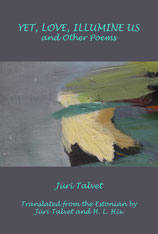 YET, LOVE, ILLUMINE US and Other Poems by Jüri Talvet
YET, LOVE, ILLUMINE US and Other Poems by Jüri Talvet
Červená Barva Press, 2019-
Since the start of the 21st century, Jüri Talvet (born in 1945 in Pärnu) has emerged as one of the internationally best-known Estonian poets and essay writers. Book-length selections of his poetry have appeared in English, Spanish, French, Italian, Russian, Romanian, Serbian and Catalan. Yet, Love, Illumine Us, and Other Poems is Talvet’s third poetry book in English translation, following Estonian Elegy (2008) and Of Snow, of Soul (2010), both published by Guernica (Toronto). Talvet has chaired World / Comparative Literature at the University of Tartu since 1992 and is elected member of Academia Europaea (2016).
ABOUT THE TRANSLATOR
H. L. Hix's recent books include a poetry collection, Rain Inscription (Etruscan Press, 2017), an essay collection, Demonstrategy (Etruscan Press, 2019), and an art/poetry anthology, Ley Lines (Wilfrid Laurier Univ. Press, 2014). His previous collaborations with Jüri Talvet include a selection of poems by the Estonian poet Juhan Liiv, Snow Drifts, I Sing (Guernica Editions, 2013), and anthologies of contemporary Estonian poetry: Vello ceo nórdico. Poesia estonia contemporánea (Universidade de Santiago de Compostela, 2002) and On the Way Home. An Anthology of Contemporary Estonian Poetry (Sarup & Sons, 2006).
From the introduction...
As, according to Aristotle, philosophy begins in wonder, so too do Talvet's poems. But Talvet's is not a youthful, naïve wonder. Instead, it is the wonder that Elias Canetti speaks of in this way: "The real creator gets bolder with age…. [T]he more one has experienced, the more there is to be astonished by. Our capacity for wonder grows with experience, becomes more urgent." The poems in Yet, Love, Illumine Us are bold in proportion to the urgency and maturity of their astonishment, the capaciousness of their wonder.
—H. L. HixCover image by Laura Talvet
$17.00 | ISBN:978-1-950063-01-7 | 103 Pages
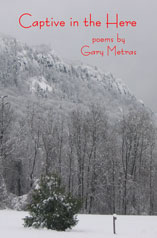 Captive in the Here poems by Gary Metras
Captive in the Here poems by Gary Metras
Červená Barva Press, 2019-
Gary Metras is the author of four previous poetry books along with eleven chapbooks, most recently, Two Bloods: Fly Fishing Poems. His poems, essays, and reviews have appeared in such journals as America, American Angler, The Boston Review of Books, Gray's Sporting Journal, Poetry, Poetry East, Poetry Salzburg Review, along with the recent anthologies Working Words: Punching the Clock and Kicking Out the Jams (Coffee House) and The American Public School Teacher: Past, Present, & Future (Harvard Education Press). He is a past recipient of the Massachusetts Fellowship in Poetry. He is the editor, publisher, and letterpress printer of Adastra Press. He fly fishes the streams and rivers of western Massachusetts as often as possible.
Critical praise for the books and chapbooks of Gary Metras:
"The Moon in the Pool is the work of a seasoned poet, a writer accustomed to having his way with words. But there is more to these poems; they make us what we already are. In other words, they tap into our shared humanity….This small book is a welcomed read. Its aftertaste is long lasting-analogous to the love it expounds, in the midst of all else that life offers."
-The Compulsive ReaderGreatest Hits 1980-2006: "The words are gifts from an accomplished poet, sure of his words and his mission to deliver his words carefully measured and assured… So read this book and see a good writer at work."
-HotmetalpressUntil There Is Nothing Left: "Metras is an unpretentious writer who keeps company with readers...In fact, he's good company. His voice is direct, simple, uncomplaining and democratic."
-Daily Hampshire GazetteSeagull Beach: "The book's feel, heft, and contents are an evocative experience."
-Virginia Quarterly ReviewA Room Full of Walls: "…powerful and successful, so eloquent of strong, controlled emotions….the very considerable achievement your collection represents."
$17.00 | ISBN: 978-0-9981027-3-3 | 66 Pages
-Anthony Hecht
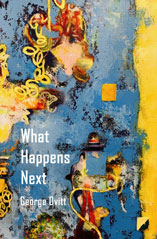 What happens Next by George Ovitt
What happens Next by George Ovitt
Červená Barva Press, 2018-
George Ovitt is the author of Splitting the Difference (poems), The Snowman (stories), and Stillpoint (a novel). Since 2012 he has co-written the popular literary blog Talented Reader. He lives in New Mexico.
The poems in What Happens Next allow us to enter the patience and calm of a poet who expresses himself after long listening, creating a welcome intimacy and a sense of life considered and savored. Natural in their diction, unforced, these poems create clarity even when looking out at a chaotic world.
$17.00 | ISBN: 978-0-692-13790-1 | 69 Pages
-Kim Garcia, author of DRONE and The Brighter House
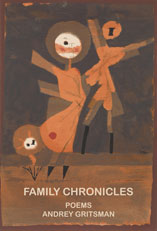 Family Chronicles Poems by Andrey Gritsman
Family Chronicles Poems by Andrey Gritsman
Červená Barva Press, 2018-
Andrey Gritsman is a poet, essayist and writer of short stories from Russia, writes in English and in Russian. His works have appeared in many American, European and Russian magazines and anthologies. Gritsman is the author of ten collections. Andrey runs Intercultural Poetry Series at Cornelia Street Café and edits poetry magazine INTERPOEZIA. He lives in New York City and works as a physician.
This book is a poetic family memoir. It is roughly divided in three parts: "Childhood – Youth," "Parents" and "America." Naturally, there is a significant overlap in terms of themes, moods and approach to the material. For the reader it will be easier to go through this book since it relates metaphorically to biography.
My childhood and youth, the younger years, were spent in Russia, in Moscow where I was born and raised. My family is Muscovites in several generations. I am also a third generation of doctors who graduated from the First Moscow Medical School (Medical Faculty of the Moscow State University).
I came to the U.S. in the spring of 1981 with my family (my wife and two little children). For a year I worked as a research fellow at the National Cancer Institute, then passed my medical exams and walked the usual path of the American physician: Residency, Fellowship at the Cancer Center in Houston and eventually landed in Manhattan at Lenox Hill Hospital, historical place on the map of the United States. Since then my life was closely connected with the City, Hudson River and Hudson River Valley.
Upper East Side was place were my literary career in American poetry started: Master Class with incomparable Amy Clampitt. The best creative years were years at the Vermont College MFA working with such brilliant poets and mentors as Deborah Digges, Jack Myers, and Roger Weingarten. A special influence on me has been my long term friendship with wonderful American poet Baron Wormser.
I am a poet and a writer of short stories and personal essays both in Russian and in English. This part of bilingual writing is important facet of my combined sensibility. The reader might notice this bilingual feature in the content of poems, but also in the usage of language and idioms.
Many of the poems are equipped with a short footnote, explaining some of the peculiarities and specificities of the situation, explaining some of the historical events. But also, specific features of the Russian and Moscow life at certain historical periods. Some of the footnotes are simply the explanations of certain family events and their relation to the historical periods and events in Russia or in the U.S.
$17.00 | ISBN: 978-0-9984253-3-7 | 70 Pages
April 13, 2018:
The Dishonesty of Certain Mirrors by Len Kuntz
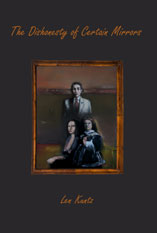 The Dishonesty of Certain Mirrors by Len Kuntz
The Dishonesty of Certain Mirrors by Len Kuntz
Červená Barva Press, 2018-
Len Kuntz is a writer from Washington State and an editor at the online magazine Literary Orphans. He is the author of three books, The Dark Sunshine, I'm Not Supposed To Be Here and Neither Are You, and The Dishonesty of Certain Mirrors. His latest story collection, The Deep End, is forthcoming from Ravenna Press in 2018. You can also find more of Len's writing at: lenkuntz.blogspot.com
Poetry Summary:
$17.00 | ISBN: 978-0-9984253-4-4 | 94 Pages
In this searing collection of personal poems, we encounter a myriad of everyday struggles and loss deftly turned on their head. From dementia to child abuse to the disintegration of relationships, each subject is rendered with raw abandon as well as an empathetic heart. There's lush music in the language of these poems, no matter their length. True to the title's promise, there's also a magical pulling back of the curtain, so that we are not only voyeurs privy to the author’s innermost life and experiences, but our own as well. Stepping inside these pages is like finding a diary replete with secrets, hopes and broken dreams, a diary that could well belong to our closest friend, or perhaps, a diary written by our own hand.
December 8, 2017:
SHADES by Rene Schwiesow
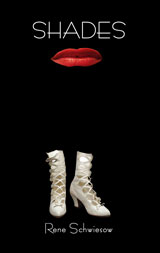 SHADES by Rene Schwiesow
SHADES by Rene Schwiesow
Červená Barva Press, 2017-
Rene Schwiesow came to the Boston Poetry Scene through drumming. In a fortuitous alignment of the planets and stars she met the late, great Mike Amado at a drum circle and the rest is history. She is currently a co-host for the popular South Shore poetry venue, The Art of Words, where she not only reads poetry and introduces features and open mike readers, but also is maker of the meatballs served during intermission (recipe is strictly a secret, unless you ask her nicely). Rene has been published in various publications including Muddy River Poetry Review, City Lights, Ibbettson Street Press, The Aurorean, and Bagel Bard and Tidepool Poet Anthologies. When she is not writing, reading, or watching Doctor Who, she can be found with a Tarot deck, aligning chakras with Reiki, or shopping for boots in support of her obvious shoe fetish.
In this collection of heart echoes, the words reverberate moments strung along the poet's timeline. The poetry is a showcase of laughter, heartache, growth, letting go, recognition, awareness, friendship, and love. Schwiesow has used keyboard as paintbrush to create page after page of moving images. May you find your own echoes whispering in the gap between each word, phrase, and poem that imprints itself upon your mind.
$17.00 | ISBN: 978-0-9984253-0-6 | 77 Pages
September 22, 2017:
Questionable Shapes Poems by David Gullette
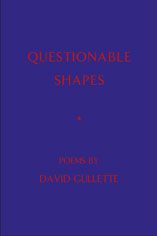 Questionable Shapes Poems by David Gullette
Questionable Shapes Poems by David Gullette
Červená Barva Press, 2017-
David Gullette was one of the first editors of Ploughshares, and has been for many years the Literary Director of the Poets' Theatre. He has published poetry, fiction, memoir and criticism in a wide range of journals, and book-length translations from both Italian and Spanish, with a specialty in Nicaraguan revolutionary poetry. He is Vice President of the Newton/San Juan del Sur (Nicaragua) Sister City Project and Professor Emeritus of English at Simmons College in Boston.
David Gullette describes 'the way we live our only life': the world is kicked awake by our desire;/if not, the loser lies there sunk in sloth./ There is no sunset we do not ignite. A lesser writer would have composed a more "slothful" volume: But the ignition of brilliancies in David Gullette's QUESTIONABLE SHAPES is as dependent on copious learning and the keen sort of intelligence that the Augustans called wit as it is on emotional impulse. The balance and maturity of this book make it a real keeper!
-Sydney Lea, Poet Laureate of VermontQUESTIONABLE SHAPES is a book brimming with long-brewed illuminations. "Orbiter Dicta" gives an unforgettable portrait of a lovable dangerous brilliant father. "Disaffiliation" and "What the Catbird Sang" are terrific poignant instances of the eternal farewell to mother. "Superscriptions" and "Fame" are profound meditations on the unappeasable human longing to leave a lasting trace. Questionable shapes as we all are, we need the soul-encouragement that David Gullette's marvelous book so generously and buoyantly provides.
-Mark Halliday, author of Thresherphobe"What are the strata / of pastness?" a poem in this fine book asks, and David Gullette responds with ghosts, dreams, daydreams, visions-"questionable shapes" that live beneath the surface of richly lived and recorded experience, like "waves breaking deep down under the house." A carefully wrought tension between depth and surface, memory and desire makes this deeply explorative book-with its moments of linguistic whimsy and social commentary-both challenging and engaging.
$17.00 | ISBN: 978-0-9984253-8-2 | 67 Pages | In Stock
-Martha Collins, author of Blue Front
September 22, 2017:
EK: Poems of Ekphrasis by Tree Riesener
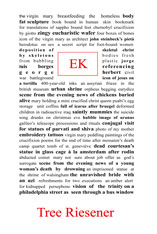 EK: Poems of Ekphrasis by Tree Riesener
EK: Poems of Ekphrasis by Tree Riesener
Červená Barva Press, 2017-
Tree Riesener is the author of Sleepers Awake, a collection of short fiction, winner of the Eludia Award from Hidden River Arts, published by Sowilo Press in 2015. Her collection of poetry inspired by astronomy, The Hubble Cantos, was published in 2016 by Aldrich Press. Her achievements include three first prizes for fiction at the Philadelphia Writers Conference, finalist for Black Lawrence Press's Hudson Prize, finalist in PANK magazine's Fiction Chapbook Contest, the William Van Wert Fiction Award, semi-finalist in the Pablo Neruda Competition, three short stories staged in the Writing Aloud Series of InterAct Theatre, Philadelphia, a Hawthornden Fellowship at Hawthornden Castle, Scotland, and three poetry chapbooks: Liminalog, Inscapes, and Angel Poison.
The poems in Tree Riesener's EK: Poems of Ekphrasis hark back to the original meaning of ekphrasis- "to speak" "out." Driven by a kind of surrealistic urgency, the poems use all the language at their disposal to name what they see so that one bird "might escape the net." Whether focusing on works of art, photos, ultrasound images, relics, a bull fight, Chernobyl, or a shrine for a boy struck while bicycling, Riesener is an "eye witness," combining a longing for an "otherworld" with a sharp awareness of the "dead zones" of our making.
-Rebecca Seiferle, Editor of The Drunken Boat, Tucson Poet Laureate, author of Wild TongueIn the epigraph to EK, Goethe speaks of reproducing the world that surrounds by means of the world within. No argument there as far as it goes - but he may have, in his heart, aimed for more. Tree Riesener applies wit and sometimes ecstatic imagery to form and to literary conceit, clearly aiming for more; beyond reproduction toward provocation; in this case, evoking not just the world but the mystery of encountering it. In EK, such evidence is abundant, first poem to last: "clear bright dense mysterious dusky bluish venous arterial subterranean multi-layered sustaining singing vulnerable scarlet" or "you signed the forms to be present in this room because being here where perpetual light shines upon you is better than being in the prison yard buried under a number"
-Kathryn Rantala, Founder-Editor of Ravenna Press, author of The Finnish Orchestra and other collectionsThe breadth and range of subjects in Tree Riesener's latest collection, EK: Poems of Ekphrasis, stretch the boundaries of the form, demand attention, enthrall, unsettle, and delight the careful reader. In "annunciation of reluctance," she has captured both Mary's terror and her desire for things to be normal with an unpleasant but quite ordinary migraine, a signal of that surreal occurrence. Brilliant! In a group of poems inspired by the Messiaen musical quartet, written in a concentration camp during WWII, the reader joins her in "searching the ruins of the rainbow for the angel who announces the end of time" (after Katrina). The ending dirge, "owed to thanatopsis gardens," is written for the plastinated bodies in an exhibit. The beautiful questioning meditations on the sublime round out these poems of witness truly written on the body and the soul.
-Michele Belluomini, poet and storyteller, former Literature Librarian of the Free Library of Philadelphia, author of Crazy Mary and Others (winner of Plan B Press chapbook contest), Translations from the Dark and signposts for sleepwalkers.In this new collection, Riesener's "poems of witness" move into powerful, unexplored worlds of language. What strikes me the most? The vitality and freshness of her work-the beautiful side by side with the ugly and the sacred with the profane. The author dares you to tell the difference.
$17.00 | ISBN: 978-0-9981027-6-4 | 114 Pages | In Stock
-John Sweet, author of Famine, Human Cathedrals, and Century of Dreaming Monsters, winner of the 2014 Lummox Poetry Prize
December 2, 2016:
Twenty-one Ghazals by Alisher Navoiy
Translated from the Uzbek by Dennis Daly
 Twenty-one Ghazals by Alisher Navoiy
Twenty-one Ghazals by Alisher Navoiy
Translated from the Uzbek by Dennis Daly
Červená Barva Press, 2016-
Dennis Daly lives in Salem, Massachusetts with his wife Joanne. They have four adult children. Daly graduated from Boston College and has an MA in English Literature from Northeastern University. He has published three books of poetry: The Custom House (Ibbetson Street Press, 2012), Sophocles' Ajax, a Modern Translation (Wilderness House Press, 2012) and Night Walking with Nathaniel (Dos Madres Press, 2014). Daly's Sophocles' Ajax was subsequently performed at Skidmore College in a production sponsored by that college's Classics Department. Among other jobs Daly has worked as a Union Leader of a 9000 member industrial local, and as a city department head. He has traveled widely in Central Asia. Visit his blog at dennisfdaly.blogspot.com.
"Tulip fields blaze the face of my soul's fire?." So begins one of the twenty-one ghazals in Dennis Daly's elegant translation of the work of the fifteenth-century poet, Alisher Navoiy. The fire that burns through these poems is complemented by stunning illustrations from the era chosen with care by the translator that set off their own quiet conflagrations. In both illumination and interpretation, Daly's skill as wordsmith and designer is coruscating. We are indebted to him for introducing us to this poet and his passion.
-Tom Daley, author of House You Cannot Reach: Poems in the Voice of My Mother and other PoemsDark-eyed ones come, revealing their inner selves. Alisher Navoiy, or Nizam-al-Din 'Ali-Shir, a fifteenth century poet, mystic and artist, is reawakened in Daly's sublime translations. True to their spirit yet infused with a modern idiom, these ghazals tremble on the tongue, sparkle on the sheaf. A body in flames fires a path through the wilderness, a pinch of skin reminds how close we remain. Here at the source, a cloud hovers. Delectable, delicate, dangerous ... finally, a denouement.
$18.00 | ISBN: 978-0-9966894-6-5 | 62 Pages | In Stock
-Marc Vincenz, author of Becoming the Sound of Bees
December 2, 2016:
Geography of Love and Exile by Susannah Simpson
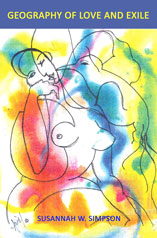 Geography of Love and Exile by Susannah Simpson
Geography of Love and Exile by Susannah Simpson
Červená Barva Press, 2016-
Susannah spent much of her childhood in Kabul, Afghanistan and spoke Farsi as a child. She has been a waitress, a founding member of the Ad Hoc Players, learned to wield a grease gun at at an auto repair garage, worked on locked psychiatric wards and as a Hospice nurse held the hands of the dying. She is the Expressive Writing Specialist at a residential treatment center in West Palm Beach,FL.
In Geography of Love and Exile, Susannah Simpson explores the deepest of human desires: to belong to this world. Through language translucent with longing, she introduces us to her many worlds. We walk with her through the bazaars of Kabul, experience the sensual pleasure of s'mores over a campfire in upstate New York, witness the red-shouldered hawk's shadow "looping across canal water" in Florida. All the while, Simpson's inner landscape-of loss, loneliness, love-accompanies us along the way. To read this remarkable collection is to explore how the places in our lives shape who we are-and sometimes, if we are fortunate, help us to feel a little less alone.
-Mary Reynolds Thompson, author of Embrace Your Inner Wild and Reclaiming the Wild SoulI couldn't read Geography of Love and Exile without thinking of Zora Neale Hurston's line-"Ships at a distance have every man's wish aboard." Or, I would add, even ships at anchorage, ships moored to the quay, temporarily in port, poised to continue a voyage, contain our yearning, our restlessness, our hunger for both memory and renewal, for unchartered distance and unrelenting intimacy. This, then, is the spirit and the soul of Susannah Simpson's powerful work, each poem a vessel of a journey taken, lost, interrupted, unfinished, redeemed.
$17.00 | ISBN: 978-0-9981027-2-6 | 67 Pages | In Stock
-Bob Shaccochis, author of Swimming in the Volcano; The Immaculate Invasion; The Next New World; Domesticity, and The Woman Who Lost Her Soul
October 12, 2016:
Melancolía Poems by Roberto Carlos Garcia
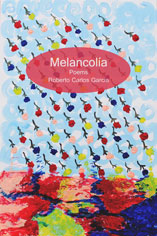 Melancolía Poems by Roberto Carlos Garcia
Melancolía Poems by Roberto Carlos Garcia
Červená Barva Press, 2016-
Roberto Carlos Garcia's chapbook amores gitano (gypsy loves) was published by Červená Barva Press in 2013. His poems and prose have appeared or are forthcoming in Public Pool, Stillwater Review, Gawker, Barrelhouse, Tuesday; An Art Project, The Acentos Review, Lunch Ticket, Bold As Love Magazine, Entropy, PLUCK!: The Journal of Affrilachian Arts & Culture, The Rumpus, 5 AM, Wilderness House, Connotation Press-An Online Artifact, Poets/Artists, Levure Litteraire, and others. Roberto also works with The Dodge Poetry Foundation's poetry in the classroom program. He is the founder of Get Fresh Books LLC: a cooperative press. Melancolía is his first book.
A native New Yorker, Roberto holds an MFA in Poetry and Poetry in Translation from Drew University, and is an Instructor of English at Union County College. His website is www.robertocarlosgarcia.tumblr.com.
Agitations both tender and muscular simmer inside these poems. A sadness that's palpable and physical haunts this poet; so does rage at the power-mongers' forces that keep children hungry, that fester poverty in terrifying mutations. Poet of engagement, Garcia speaks to the moon, to his sister, to the seasons and the garden, to his body a vessel: "these hands like a chunk of asteroid—full of taking & giving." This book offers us a photo-real blueprint of one man's life-space, an elegant blues-print of one man's heart, with direct utterance and lavish music.
-Judith Vollmer, Vollmer is the author of five full-length books of poetry, including The Apollonia Poems, forthcoming in 2017 as winner of the University of Wisconsin Press Four Lakes Poetry Prize.Roberto Carlos Garcia is, it seems to me, poet-kin of both Lorca and Neruda, but also things like rain, wind, the color yellow and the color green. In Melancolía we have a collection of gorgeously quiet poems rendered by intellect and the dream where lyricism is born out of the dusky space between mystery and the everyday. Here is a breathtaking archive of an imagination at work, a body made up of effort and world. See: "My friends I am not above you // I can hear the song of reckoning in the rose thorns" and "In my mouth melancolía is an orchard, /a yellowing day & bluing night, // In my ribcage Melancolía is an ecstatic lilt /made of pearls, my heart—wet sand, /pungent as dogwoods."
-Aracelis Girmay is the author of three collections of poetry: The Black Maria (BOA Editions, 2016); Kingdom Animalia (BOA Editions, 2011), and Teeth (Curbstone Press, 2007). She is a Cave Canem fellow and teaches at Hampshire College and in the Drew University MFA program.In these sensuous poems everything is up for inspection and interrogation, including the speaker himself. Here are echoes of Lorca and Neruda, their depth and power, but in a voice entirely the poet's own. Roberto Carlos Garcia's poems take beauty as a gift, and also as a sometimes foil against capitalism and the numbness of the suburban life we are supposed to desire. "& what is poetry if not what we need?" We need poems like these, with their living language and their vision of where we are and where poetry, ecstatic and elegiac, can take us.
-Anne Marie Macari, author of Red Deer, (Persea, 2015)These poems ache and plead and yearn, and never forget song. Never forget song.
$17.00 | ISBN: 978-0-9981027-1-9 | 51 Pages | In Stock
-Ross Gay is the author of the National Book Award finalist Catalog of Unabashed Gratitude (University of Pittsburgh Press, 2015), Bringing The Shovel Down (University of Pittsburgh Press, 2011), Against Which (Cavan Kerry Press, 2006). He is an Associate Professor at Indiana University and a Cave Canem Fellow.
September 21, 2016:
A Peaceful Color From The Silence by Gulnar Ali Balata
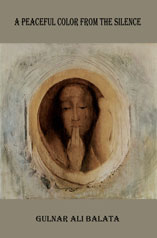 A Peaceful Color From The Silence by Gulnar Ali Balata
A Peaceful Color From The Silence by Gulnar Ali Balata
Červená Barva Press, 2016-
Gulnar Ali Balata is a Kurdish American poet, novelist, short-story writer, teacher, and translator. She was born in Kurdistan in 1974. Gulnar is the author of six books, three books of poems in the Kurdish language, Luna and Twelve Months (2006), Song of the Sad Ruins (2008), and A Breath from Letters of Borders Dream (2012) published in Duhok, Kurdistan. My Soul Still a Virgin is a collection of translated poems from Kurdish and Arabic to English by the author in 2010. My Poems Weep to the Seagulls (2014), is a book of poems published in Arabic, in Kurdistan. Kurdonya, a novel written in the Arabic language (2015), was published in Syria.
Gulnar has been published in numerous literary journals, websites and anthologies in Kurdish and Arabic languages, which are her first and second languages. Her work has been translated into many languages, and has been published in newspapers and magazines, in Kurdish and extensively on the internet.
She was a teacher in Kurdistan and taught English for three years before she left home in 1996. Gulnar received an Associate's degree in Art from Bunker Hill Community College in 2009.
She has participated in several poetry festivals within the Kurdish Region, and also abroad, in Turkey and Europe. From her outstanding cooperation, and successful writing, she has received awards from her work, and has been listed as one of the top Kurdish Women Voices in modern Kurdish poetry.
Gulnar Ali Balata's fourth volume of poetry, A Peaceful Color From The Silence, is an intimate gift by a mature poet infused with love for her tattered homeland of Iraqi Kurdistan. Her pen ripples with sparkling rivers and her expectant heart wrings with sadness as she infuses her poems in shooting stars and sweet dew, as "tears braid Fate's threads... shoulder/ the coffin of [her] childhood." The poet is "a weaned child," an "immigrant girl," a "lover," and "the melody for the executed." When "in exile... beyond the ocean... the coffins write [her] lines." This poet insists on the possibility of a "new page from a new sorrow/with a happy heart/ Make your name in my peace/symbol of a gorgeous love's spring." We take this journey with Balata and arrive strangely hopeful, crying tears of love for the resilience of the human spirit.
$17.00 | ISBN: 978-0-9966894-5-8 | 73 Pages | In Stock
-Molly Lynn Watt, On Wings of Song and Shadow People
July 21, 2016:
No More Happy Endings by Milan Djurasovic
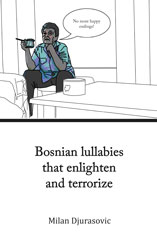 No More Happy Endings by Milan Djurasovic
No More Happy Endings by Milan Djurasovic
Červená Barva Press, 2016Milan Djurasovic is a Bosnian Serb from Mostar, the descendant of delightful peasants and modest working-class stock. He lives in northern California, where he works as a paraeducator. No More Happy Endings is his first collection of poems and short stories.
"The bedtime stories of my grandmother, Baba Jela, changed after the Bosnian civil war. Before the shooting began, her stories were ordinary, positive, life-affirming, with a clever hero or good-natured idiot overcoming challenges and a greedy foe soon reduced to a pitiful scrub. At the end, the world would turn out rosy and just, and taking part in it made sense. But after a war of nearly 100,000 deaths, millions of displaced bodies and souls, and decay peering out of every crevice, such propriety seemed unnatural. So Baba Jela decided to get rid of it. While other elderly men and woman decided to end their own lives after realizing that nothing would ever again be the way it was before the war, Baba turned her stories and lullabies dark and horrifying, her own way of refusing to play along with uncontrollable circumstances."
Cover Design: Aleksandra Djurasovic
$12.00 | ISBN: 978-0-9966894-8-9 | 30 Pages | In Stock
June 16, 2016:
Secret Letter by Erika Burkart, translated by Marc Vincenz
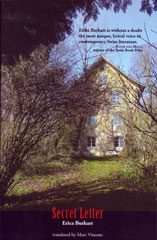 Secret Letter by Erika Burkart, translated by Marc Vincenz
Secret Letter by Erika Burkart, translated by Marc Vincenz
Červená Barva Press, 2016-
Swiss poet Erika Burkart (1922-2010) has been compared to the likes of Ingeborg Bachmann, Friedericke Mayröcker, and Rainer Maria Rilke. During the latter half of her lifetime, the Swiss literary establishment perceived her not only as the grande dame of German- Swiss poetry, but also as an elusive, metaphysical, at times eccentric enigma of contemporary German-language literature. Born in Aarau, Switzerland, Burkart published over 24 collections of poetry and nine prose works, writing for the most part in the house of her childhood (the former summer house of the Prince-Abbot of Muri), Haus Kapf in Althäusern, Aargau, which was run as a tavern by Erika's parents.
Burkart received numerous literary prizes during her lifetime, including the Johann-Peter-Hebel-Preis (1978), the Wolfgang-Amadeus-Mozart- Preis (1990), the Joseph-Breitbach-Preis (2002), and the Gottfried-Keller-Preis (1992). To date, she is the only woman ever to have been awarded Switzerland's highest literary prize, the Grosser Schiller-Preis (2005).
Born in Hong Kong, Marc Vincenz is the author of nine collections of original poetry; his latest are This Wasted Land, and Its Chymical Illuminations (Lavender Ink, 2015), Becoming the Sound of Bees (Ampersand Books, 2015) and Sibylline, a book-length poem (Ampersand Books, 2016). The Washington Independent Review of Books recently called Vincenz "[a] peripatetic linguist... [he] prospers through travel like a psychoactive medicine man. Each poem is an open environment where anything can happen-a ceremony of advanced thinking-where a pilgrim of great altitudes accepts life's vagaries." Vincenz is also the translator of many German-language poets, including the Herman Hesse Prize winner, Klaus Merz, Werner Lutz, Erika Burkart, Alexander Xaver Gwerder, Robert Walser and Jürg Amman, and has published ten collections of translations-the latest is A Late Recognition of the Signs by Erika Burkart. His translation of Klaus Merz's collection Unexpected Development, was a finalist for the 2015 Cliff Becker Book Translation Prize and will be published by White Pine Press in 2018. He has received several grants from the Swiss Arts Council and a fellowship from the Literarisches Colloquium Berlin. His own work has been translated into German, Russian, Romanian, French, Icelandic and Chinese; Bucharest's Tractus Arte Press released a Romanian translation of his collection The Propaganda Factory, at the 2015 Bucharest Book Fair. He is International Editor of Plume, Executive Editor of MadHat Press, and Plume Editions, Co-Editor of Fulcrum, and lives and writes in Western Massachusetts. Recent and forthcoming publications include The Nation, Ploughshares, Guernica, Washington Square Review, The Common and World Literature Today.
"Erika Burkart often evokes darkness, all the while "recu[ing] / fragments of images / from the dark chambers"-and these bits and pieces of the world, which she gathers with such care, gleam with a lasting, even healing light in her work. A precise and loving observer of nature, this major Swiss poet is especially sensitive to the question of how perceptions can be written down to "find [her]self / [...]-a language / no one knows anymore." For her, words raise no insurmountable barriers between the self and outside reality, but rather encourage her, as it were, to examine how one might more fully live."
"With Secret Letter, Marc Vincenz has gracefully and accurately rendered one of the last and most important books written by this philosophically minded poet. Hats off to him, for these full-fledged English poems express all the discreet music, subtle emotions, and thought-provoking qualities of the originals."
-John Taylor, poet, translator of Philippe Jaccottet, Jacques Dupin, and Jose-Flore Tappy"Secret Letter by Erika Burkart offers lyrics so pristine and resonant in English that it's hard to fathom that these are translations. Marc Vincenz has done a great service for English-speaking, opening our shutters, our vistas onto the light- rich work of this amazing poet. Each poem mirrors creation and the birth of poetical language, without affectation or even extra syllables. The ensemble remins us of why we turned to poetry in the first place, for its spare, lyrical power, its shock of beauty, emotion, and insight."
-Marilyn Kallet, poet, translator of Paul Eluard, Benjamin Peret, and Chantal Bizzini"Burkart's poems leave behind much more than a fleeting trace in the snow. Her delicate poetic footsteps have long since inscribed themselves in the memory of nature and her readers."
-Deutschlandfunk"Erika Burkart possessed something like a second sight. She saw people, nature, the world, with both an inner and outer vision."
$15.00 | ISBN: 978-0-9966894-3-4 | 83 Pages | In Stock
-Bieler Tagblatt
March 2, 2016:
Fire Tongue by Zvi A. Sesling
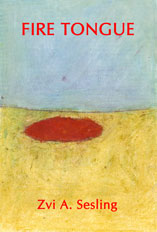 Fire Tongue by Zvi A. Sesling
Fire Tongue by Zvi A. Sesling
Červená Barva Press, 2016-
Zvi A. Sesling has published poetry in numerous magazines both in print and online in the United States, Great Britain, Ireland France, New Zealand, India, Canada, Australia and Israel. Among the publications are: Midstream, Voices Israel, Saranac Review, New Delta Review, Plainsong, Asphodel, Ibbetson St., Blue Lyre, Door Is Ajar, Scapegoat, The Chaffin Journal, Ship of Fools, Levure Litteraire, The Moth, First Literary Review—East, and Main Street Rag. He was awarded First Prize (2007) in the Reuben Rose International Poetry Competition. In 2008 he was selected to read his poetry at New England/Pen “Discovery” by Boston Poet Laureate Sam Cornish. He was a featured reader in the Jewish Poetry Festival in Brookline, MA. He is a regular reviewer for the Boston Small Press and Poetry Scene and is Editor of the Muddy River Poetry Review and publisher of Muddy River Books. Sesling has been a featured reader in various venues in the Boston area, San Diego, the Massachusetts Poetry Festival and the Boston Poetry Festival. Sesling has also read on local radio and cable television programs. He is author of King of the Jungle, (Ibbetson St., 2010), and a chapbook Across Stones of Bad Dreams (Červená Barva Press, 2011). He has taught at Suffolk University, Emerson College and Boston University. He lives in Chestnut Hill, MA with his wife Susan J. Dechter.
In Fire Tongue, the poems are precise and unsparing as they probe old questions of how and why the unspeakable enters our lives. In terse, suspenseful language and lines that are as light as their subjects they carry are heavy, indeed ominous, Sesling looks for hope, for what can redeem us. The poet finds the answer in our ability to listen, to feel, to own a conscience, and to value life.
-Afaa Michael WeaverPoet Zvi Sesling is at a point in life where there is much more in his past than in his future. In "Fire Tongue" there is delicate balance of the past, present and speculation of what is to come. Sesling fearlessly faces what we all feel deep in our marrow - our own mortality. As a highly skilled poet with a gimlet eye, Sesling pulls this off with a mixture of humor and pathos. No word is wasted... life is too short for that... Sesling ,my friends, is well acquainted with the night.
-Doug Holder, Ibbetson Street Press, Adjunct Professor of Creative Writing/Endicott CollegeFire Tongue takes us on a journey down Zvi Sesling's "road of sorrows." Here is madness, pain, cities of the dead, remnants of the lost, vast fields of suffering, outcroppings of cruelty, deserts of war and violence. With a dream-like clarity and precision reminiscent of Hieronymus Bosch, Sesling shows us what we cannot deny about our nature, our history, our times. This is poetry as ritual incantation, a fiery tongue in its own right, teaching us how to navigate and thus perhaps begin to understand our harsh and bloody terrain.
$17.00 | ISBN: 978-0-9966894-4-1 | 87 Pages | In Stock
-Fred Marchant, Author of The Looking House (Graywolf Press)
September 22, 2015:
Becoming an Ancestor Poems by Lucille Lang Day
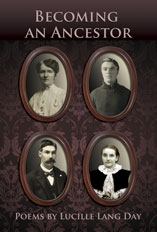 Becoming an Ancestor Poems by Lucille Lang Day
Becoming an Ancestor Poems by Lucille Lang Day
Červená Barva Press, 2015-
Lucille Lang Day is the author of nine previous poetry collections and chapbooks, including The Curvature of Blue, The Book of Answers, and Infinities. Her first poetry collection, Self-Portrait with Hand Microscope, received the Joseph Henry Jackson Award in Literature; her most recent chapbook, Dreaming of Sunflowers: Museum Poems, won the Blue Light Poetry Award. She has also published a children’s book, Chain Letter, and a memoir, Married at Fourteen: A True Story, which received a PEN Oakland Josephine Miles Literary Award and was a finalist for the Northern California Book Award in Creative Nonfiction. Day earned her M.F.A. in creative writing at San Francisco State University and her Ph.D. in science/mathematics education at the University of California at Berkeley. The founder and director of a small press, Scarlet Tanager Books, she also served for seventeen years as the director of the Hall of Health, an interactive museum in Berkeley. She lives in Oakland, California, with her husband, writer Richard Michael Levine. Her website is http://www.lucillelangday.com.
"The poems in Becoming an Ancestor begin in autobiography, move into history, and branch backward and forward through genealogy, offering instruction on the natural world along the way. Lucille Lang Day recreates her ancestors with scrupulous detail and often stunning images until her poems read like the history of anyone "born of the myths of Europe/and North America." These myths propel Day to tell us of migrations, mutations, secrets, heartbreak, disappointments, defiance, death, and resilience—in other words, of life in all its complexity as she shows us all "which way is home" in our shared fate of becoming ancestors."
-Lynne Knight, author of Again"Soulfully thrilling, the poems in Becoming an Ancestor constitute—historically, geographically, emotionally, caringly—a mindful poet's family picture album. Following centuries of fateful migrations, Lucille Lang Day becomes the California teller of tales that wow us with her own intimate versions of how need, time and again, restores our lives to living streams of love."
-Al Young, California Poet Laureate Emeritus"At the poetic heart of Lucille Lang Day's Becoming an Ancestor is a series of vivid historical poems starting in the early 1600s when 13-year-old Elizabeth sails to Plymouth on the Mayflower. Rowland is in the Gold Rush, Nathan in the Union Army. Old maid Angenette has an out-of-wedlock baby with a Wampanoag Indian. The ancestors tell Day, "Welcome home. The elders have been waiting for you./Listen to their drums, the beat/of your own heart." As the poet comes closer to becoming an ancestor herself, she details her losses and her fears, and she worries whether she is creating a masterpiece or an old pot. Read this old pot, and you will find the hand of a master."
-Penelope Scambly Schott, author of Lillie Was a Goddess, Lillie Was a Whore"Becoming an Ancestor carries us from the very beginning of this great clock-universe through human migrations to the bitter end, where however a horned lark is singing beside a field of silver hairgrass in winter. When this confluence produces Lucille Lang Day, who sings the world as both a family member and a scientist, and her daughters and grandchildren, they appear in the life-lines of her poems both as the homecoming of historical pilgrimages and as intertwining swirls of DNA. Here too the endings can be bitter as family members slip away. But the music of her poetry remains."
-Emily Grosholz, Advisory Editor, The Hudson ReviewReviews:
Kirkus Reviews: https://www.kirkusreviews.com/book-reviews/lucille-lang-day/becoming-ancestor/
$17.00 | ISBN: 978-0-9861111-6-7 | 118 Pages | In Stock
September, 2015:
Belly by Steven Schreiner
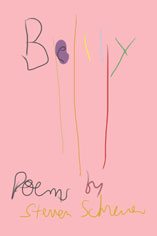 Belly by Steven Schreiner
Belly by Steven Schreiner
Červená Barva Press, 2015-
STEVEN SCHREINER is the author of the collection Too Soon to Leave and the chapbook Imposing Presence, and co-author with Allison Cundiff of In Short, a Memory of the Other on a Good Day. His poems have appeared in many magazines, including Poetry, Image, Colorado Review, River Styx and December, and numerous anthologies. He is the recipient of fellowships from the VCCA, Tall Rock Retreat, and The National Writer's Voice of the YMCA. He teaches in the MFA Program at the University of Missouri-St. Louis and is the founding editor of Natural Bridge, a journal of contemporary literature.
Cover art: Ethan Shaltout and Steven Schreiner
Belly is a sequence of confessions. It is a quiet yet intense journey into the deepest wells of a maturing heart. Schreiner writes movingly about the painful transience of love and loss, the forces of memory and childhood, delineated by the revision of seasons and the symbolism of flowers as death, as remembrance. Belly reconciles the permanence of family in all its anguish and grief with the consciousness and inevitability of what supremely makes us human: forgiveness.
—Rewa ZeinatiSteven Schreiner reaches his summit in this remarkably vivid, darkly truthful, and often heartbreaking book of memories, losses and longings, the work of experience.
$17.00 | ISBN: 978-0-9861111-8-1 | 80 Pages | In Stock
—Edward Hirsch
Release date August 12, 2015:
To Part Is to Die a Little by Claudia Serea
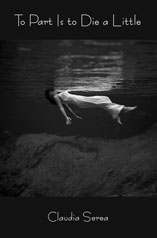 To Part Is to Die a Little by Claudia Serea
To Part Is to Die a Little by Claudia Serea
Červená Barva Press, 2015-
Claudia Serea is a Romanian-born poet who immigrated to the U.S. in 1995. Her poems and translations have appeared in Field, New Letters, 5 a.m., Meridian, Word Riot, Apple Valley Review, The Red Wheelbarrow, and many others. A four-time Pushcart Prize and Best of the Net nominee, she is the author of three other full-length collections: Angels & Beasts (Phoenicia Publishing, Canada, 2012), A Dirt Road Hangs From the Sky (8th House Publishing, Canada, 2013), and Nothing Important Happened Today (Broadstone Books, forthcoming, 2016). Her poem My Father’s Quiet Friends in Prison, 1958-1962 received the New Letters Readers Award in 2013. Serea co-hosts The Williams Readings poetry series in Rutherford, NJ, and she is the founding editor of the National Translation Month. More at cserea.tumblr.com.
Serea's poems instantiate with startling clarity and empathy what it means to be at once deeply rooted in the world and permanently dislocated, a cultural curator and translator, a juggler of conflicting desires. Her pendulum-like sway between her homeland, Romania, and the adopted/adoptive one, America, creates a fluid space of in-betweenness that allows her transnational speakers to choose not to choose, and to articulate, instead, what it means to live attuned to the distinct textures of these two worlds' beauty and grit, to their flute songs and "half-lit solitude[s]." Her incisive eye gives us the "Plexiglass politeness" of America alongside the de-humanizing deprivations of life in (post-) communist Romania, the guarded emotions of New World suburbia alongside the odyssean waiting that has become her parents' life in the village house with a "wasps' nest in its bosom" and chickens ready "to scratch the road for coins and worms."
To Part Is to Die a Little is a spare yet rapturous chant about an unending emigration and the continuous return to the soul of one culture in the language of another.
—Mihaela Moscaliuc, author of Father Dirt (Alice James Books, 2010)Readers of To Part Is to Die a Little should prepare for an emotional journey, as they witness dramatic changes in the speaker's character and her surroundings. Deeply moving poems chronicle poignant milestones spanning from the speaker’s decision to leave her country of birth to settling into her country of choice, adopting her new life and seemingly making peace with an inherent duality voiced as "Let me be the pendulum/between my two lives." We meet and sympathize with poignant and vivid characters such as a Thai busboy, a Russian grocery bagger, Danny-the-butcher and other "Stars of the Underground." Congratulations to Claudia Serea for a well-crafted and brilliantly structured book!
$17.00 | ISBN: 978-0-9861111-5-0 | 96 Pages | In Stock
—Katerina Stoykova-Klemer, author of The Porcupine of Mind
Release date June 4, 2015: Span of Thread by David Giannini
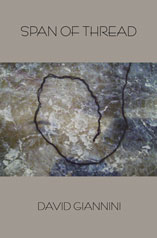 Span of Thread by David Giannini
Span of Thread by David Giannini
Červená Barva Press, 2015-
David Giannini's most recently published collections of poetry include AZ TWO (Adastra Press), a "Featured Book" in the 2009 Massachusetts Poetry Festival; RIM/WAVE in 2012;, and 10 chapbooks in 2013-15 including INVERSE MIRROR, a collaboration with artist, Judith Koppel;. His work appears in national and international literary magazines and anthologies. Awards include: Massachusetts Artists Fellowship Awards; The Osa and Lee Mays Award For Poetry; an award for prosepoetry from the University of Florida; and a 2009 Finalist Award from the Naugatuck Review. He has been a gravedigger; beekeeper; taught at Williams College, The University of Massachusetts, and Berkshire Community College, as well as preschoolers and high school students, among others. Giannini was the Lead Rehabilitation Counselor for Compass Center, which he co-founded as the first rehabilitation clubhouse for severely and chronically mentally ill adults in the northwest corner of Connecticut. He lives among trees in Becket, Massachusetts with his wife, Pam.
On OTHERS' LINES
…I don’t see how any close reader won't come away learning a great deal about the potential in quotation, the distinctness of first lines & the possibilities of form. That's a lot for a project of this scope to accomplish.
—Ron SillimanYes, it’s very deftly done, and there is much that is both attractive and amusing: Paul Pines, Charles Olson, and Howard Nemerov as bedfellows is a bit difficult to imagine, but your result is convincing. What comes through to me is the likenesses between all human beings, no matter how differently they may perceive things. It certainly must have been a colossal undertaking.
—Theodore EnslinI think you have really triumphed. These are poems that succeed most of the time as poetry and carry a real spiritual impact. And your way of using the whole page, if necessary, to get the space/time equivalents you need may transform all of our writing.
—Robin MagowanOn RIM/WAVE
Many of these poems, though short, resonate deeply, and few poets get so much from so few words. These two books complement each other through Giannini's great skill with language and his ability to join the concrete and the abstract. It's poetry grounded in the earth.
$17.00 | ISBN: 978-0-9861111-2-9 | 138 Pages | In Stock
—Mark Farrington, Assistant Director and Fiction Advisor in the Johns Hopkins M.A. in Writing Program in Baltimore and Washington, D.C.
Release date June 1, 2015: A World Less Perfect for Dying In by Ralph Pennel
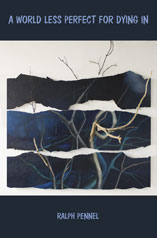 A World Less Perfect for Dying In
A World Less Perfect for Dying In
by Ralph Pennel
Červená Barva Press, 2015-
Ralph Pennel is the author of A World Less Perfect for Dying In, (by Cervena Barva Press, 2015). His writing has appeared in The Cape Rock, Ropes, Open to Interpretation, Ibbetson Street, The Smoking Poet, Unbound Press, Monologues From the Road and various other journals in the U.S. and abroad. Ralph teaches poetry at Bentley University and literature at Bunker Hill Community College. He has been a guest lecturer at Emerson College and served as the judge for the 2013 WLP Dean's Prize for Emerson. Ralph also teaches workshops at the Cambridge Center for Adult Education and for Student Day of Poetry run by MassPoetry.org. He is a founding editor and the fiction editor for the online literary magazine, Midway Journal (www.midwayjournal.com), published out of St. Paul, Minnesota. Ralph Pennel lives and writes in Somerville, Massachusetts, and was a finalist for the Poet Laureate of Somerville in 2014.
Cover art: "Rising Tide" by Resa Blatman
In the opening poem of Ralph Pennel's debut collection, the speaker lists things he looks for in a poem: "Clear blue light / A single voice, cold, in need of fire" and "Everything I have ever buried," making a concise introduction to A WORLD LESS PERFECT FOR DYING IN—a world which is, after all, the imperfect but beautiful place where we live and die. "But I believe that we all, at the very least, should have some. Beauty, that is." That persistent belief in beauty and the simple kindnesses that one human being can offer another suffuses these poems—often filled with pain and loss—with something like light.
—Joyce Sutphen, Poet Laureate of MN, author of Naming the Stars"I’m writing all this down," Ralph Pennel says at the end of his frightening and beautiful poem "Just Off The Hennepin Bridge": and he is writing it all down, a world haunted by both beauty and despair. Again and again Pennel returns to the theme that echoes throughout the book, "the great immeasurable hole /that only love lost can make." What a wonderful task to set yourself as a poet, to take the measure of the immeasurable as best you can and to call this impossible task—this ache you feel for the world—by its true name: love.
—Jim Moore, author of Invisible StringsRalph Pennel's poems situate us front and center in the speaker's intimate company. In a few humble, trust-earning gestures, Pennel can take us great, often dark, distances. "Confiding in the Prison Guard", written in the voice of John the Baptist on the eve of his execution, risks the one harrowing image after another in service to empathy far transcending them; the poem closes with a devastatingly vernacular plea. Whether he is slipping in and out of personae with the ease of a shape shifter, or serving his subjects as a caring spy, Ralph Pennel has reminded this reader that the single, irrefutable craft of poetry is graceful connection.
—Frannie Lindsay, author of Our Vanishing
Reviews:
Tinder Box Editions: http://tinderboxeditions.blogspot.com/2015/08/book-interview-world-less-perfect-for.html
Doug Holder Blogspot: http://dougholder.blogspot.com/
$17.00 | ISBN: 978-0-9861111-7-4 | 76 Pages | In Stock
New Release April 21, 2015:
Almost Too Much by Barbara E. Murphy
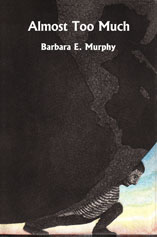 Almost Too Much by Barbara E. Murphy
Almost Too Much by Barbara E. Murphy
Červená Barva Press, 2015-
Barbara Murphy’s work has appeared in several literary journals including New England Review, Green Mountains Review, The Threepenny Review, and Michigan Quarterly Review. She was nominated for a Pushcart Prize and is the recipient of a Vermont Council on the Arts fellowship. Murphy has worked as president of Johnson State College in Vermont since 2001 and has been recognized for her leadership roles in higher education. She lives and works in northern Vermont with her husband Tom Garrett.
Almost Too Much both tactfully and relentlessly interrogates our human experience in these dehumanizing times. There’s not a sliver of false hope in these pages, but reading them, we catch glimpses of the paradox of our lives, that "The sound of geese /overhead, their thin cries clear /as night through the ceilings and roof / of the house, is either the saddest /sound [we] will ever know / or one of great lifting joy." Barbara Murphy’s quietly brilliant poems move us readers toward usable truth.
—David Huddle Author of Glory River and Blacksnake at the Family ReunionMurphy’s lyrical narratives, lively and exact, speak of braveries and hesitations, fugitive beauties and stations of calm. A lifetime of truths take the reader through first games of hide and seek, the boys so far away/lost in their secret places/there was no way/they’d ever get home in time; first loves and second marriages where desire is more of a casual friend./It will not/always be there breathless and flushed; loving children and step-children with different needs in different time zones. These poems should be read aloud for their honesty and musicality. They do the heart good. Almost Too Much is a stunning debut.
—Dzvinia Orlowsky Author of Silvertone and A Handful of BeesDeeply intimate, each line a breath. In flashes of brilliance against a landscape of existential dread, these poems flare up and stare down this given world until it surrenders its grace.
—Nancy Mitchell Author of The Near Surround and Grief Hut
Reviews:
$17.00 | ISBN: 978-0-9861111-3-6 | 70 Pages | In Stock
http://www.basementmedicine.org/arts-entertainment/2015/05/07/5553/
New Release February 18, 2015:
some words suicidal by Stella Vinitchi Radulescu
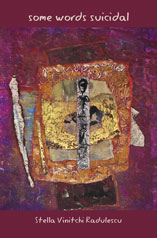 some words suicidal by Stella Vinitchi Radulescu
some words suicidal by Stella Vinitchi Radulescu
Červená Barva Press, 2015-
Stella Vinitchi Radulescu, Ph.D. in French Language & Literature, is the author of numerous collections of poetry published in the United States, Romania and France. She writes poetry in English, French and Romanian and her poems have appeared in Laurel Review, Asheville Poetry Review, Wallace Stevens Journal, Seneca Review, Pleiades, Rhino, Louisville Review among others, as well as in a variety of literary magazines in France, Belgium, Luxembourg, Québec and Romania. She is the winner of several International Poetry Prizes awarded for her French books, including the Prix Amélie Murat (2013) and the Grand Prix de la Francophonie (2014). A collection of her New & Selected Poems is forthcoming from Orison Books Press. At the present she lives in Chicago.
Cover Art: Icône en confidence by Michel Bénard
Poetry is the record of hidden things in commerce with one another, and only that mystery allows us to live. Stella Vinitchi Radulescu's poetry is an alchemy, a magic of restraint and exposure, revealing the machinations of our invisible feelings, motives, appetites and fears. That she is a master of her condensary goes without saying, for this is a consummate language shaped with remarkable skill, and the voyages that these poems take are brilliant excursions into our inner lives, secret things pushed into the subconscious, broken promises and whispered asides. I have long admired Radulescu's bilingual ability to bend sentences to her will and those constructions are filled with a cross-cultural understanding that is consistently transcendent, that builds bridges into the landscapes of our shared interior lives.
—Keith Flynn, author of Colony Collapse DisorderSome Words Suicidal, Stella Radulescu's newest poetry collection, is all at once experientially effusive and parsimonious, and is bravely so, both on and off the page. The meditative remittance of these works reminds us just how language means. Radulescu is not afraid to insist her readers subsist on the unnamable, in the spaces between ideas. The poems here thread rather purposefully through dimensions, all the while rending artifice's will without the prudence of architecture, where "words are bees stars ants roaming / on the page / beyond understanding" into truth. Radulescu takes nothing and everything for granted, and at her behest, every word, every line, every stanza and poem reminds us we should too. And, yes, every time, with absolute devotion.
$17.00 | ISBN: 978-0-9861111-1-2 | 100 Pages | In Stock
—Ralph Pennel
New Release December 10, 2014:
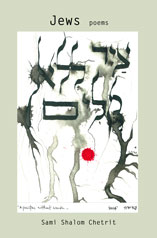 Jews by Sami Shalom Chetrit
Jews by Sami Shalom Chetrit
Červená Barva Press, 2014-
Teacher, poet, writer, filmmaker, and scholar Sami Shalom Chetrit was born in Morocco, raised in Israel, and lives in New York City. He has been writing and publishing poetry for thirty years, with five books in Hebrew: a new book, Broken Times, is due out from Bimat Kedem (2014); this was preceded by Yehudim (Jews), from Nahar Books (2008). Chetrit’s Shirim BeAshdodit (Poems in Ashdodian) became a bestseller in Israel where a popular musical, based on the poems, was produced. He has published countless poems in literary magazines, periodicals, newspapers, and anthologies, as well as several performing shows with leading Israeli musicians. There is a growing body of critical work on his poetry in both Hebrew and English and a generation of younger poets and artists have been inspired by his work. He was recently included in a list of the top 40 Modern Hebrew poets. Though a selection of his work appeared in Ammiel Alcalay’s Keys to the Garden, this is Chetrit's first full-length book of poetry in English.
Chetrit’s novel Doll's Eye came out from Hargol Am Oved in 2007, and in English from Xlibiris in 2013. His groundbreaking study, Intra-Jewish Conflict in Israel: White Jews, Black Jews, was published by Routledge in 2011.
Producer and director of three documentary films, Chetrit’s latest film, Shattered Rhymes: The Life and Poetry of Erez Bitton, depicts the renowned Moroccan born poet, an inspiration to Chetrit's generation. The film came out in January, 2014, appearing in festivals as well as broadcast on Israeli television, and is available in English.
Chetrit is Associate Professor of Hebrew and Middle Eastern Studies at Queens College, CUNY, and is on the faculty of Middle East/Middle East in America Studies at The Graduate Center, CUNY.
Cover Art: "A painter without words" water on canvas, 2014
by Igal Fedida
With unflinching courage, clarity, and wit, Sami Shalom Chetrit has gone places no contemporary Israeli Hebrew poet has dared venture. These are places in which the brutality of separatist ideology, enforced identity, militarism, and military occupation, have attempted to blot out the ethics of memory and human relations. It is in these ruins that Chetrit's rage, irony, and compassion create new ways of imagining realities we thought had reached a point of utter saturation. This collection finally allows English readers a chance to hear Chetrit's vital and inspiring voice.
$17.00 | ISBN: 978-0-692-33628-1 | 100 Pages | In Stock
—Ammiel Alcalay, professor of comparative literature Queens College and CUNY Graduate Center
New Release September 3, 2014:
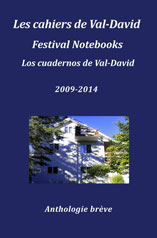 Les cahiers de Val-David Festival Notebooks Los cuadernos de Val-David 2009-2014 Anthologie brève
Les cahiers de Val-David Festival Notebooks Los cuadernos de Val-David 2009-2014 Anthologie brève
by Flavia Cosma (Editor)
Červená Barva Press, 2014-
The Trilingual Anthology "Les cahiers de Val-David, Festival Notebooks, Los cuadernos de Val-David, 2009-2014" reunites, thanks to a generous grant from CLD Laurentides, some of the most talented international writers who participated so far in the Festivals at Val-David. (The International Writers' and Artists' Residence at Val-David, Quebec, Canada) The anthology is in English, French, and Spanish with many translators bringing the language of the International writers available for us to read. The International Festival of Writers and Artists is held twice a year at the International residence and is directed by Flavia Cosma, a well-known writer whose poetry, prose and children literature is published in English, French and Spanish, as well as her native Romanian. She welcomes at her residency, year after year, new talents from all corners of the world. They have the opportunity to share their poetical-artistic experience with other fellows through festivals where poetry and prose readings, book launches, conferences, round tables, improvisations, music and exhibitions are giving poets and artists of all ages and styles an opportunity to perform their work in the language of participants, most frequently English, French, Spanish, Romanian and even Ancient Greek. (www.flaviacosma.com) This anthology will take you on a journey reading the work of international writers from so many different countries and cultures.
Contributors: David Brême, Alan Britt, Christopher Bowen, Gordon Bradley, Philip Brunst, Julie Burtinshaw, Claudia Cáceres Franco, Luis Raúl Calvo, Rodica Gabriela Chira, Flavia Cosma, Carmen Doreal, Hélène Dorion, Sharl Dubé, Louise Dupré, Denis Emorine, Adrian Erbiceanu, Anna Louise E. Fontaine, Jacobo Fijman, Antoine Gravel-Bilodeau, Talleen Hacikyan, Eva Halus, Diana Haïk Hambardzumyan, Hugh Hazelton Louis-Philippe Hébert, Clelia Ifrim, Jeanne Jutras, Anna Levine, Ana López, Frédérique Marleau, Gilles Matte,Felicia Mihali, Ljubica Milicevic Gertrude Millaire, Gloria Mindock, Michael Mirolla, Pierre Mondou, Ofelia de Santos, Mel Sarnese, N. A’Yara Stein, Czandra Mostly Luminita Suse, JÜRI TALVET, Patricia Gonçalves Tenorio, Jeremiah Wall, Cheryl Antao-Xavier
$17.00 | ISBN: 978-0-692-28317-2 | 122 Pages | In Stock
September 21, 2014: What Wakes Us Poems by E.K. Mortenson
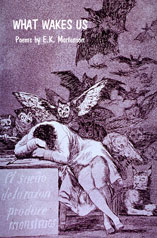 What Wakes Us Poems by E.K. Mortenson
What Wakes Us Poems by E.K. Mortenson
Červená Barva Press, 2014-
E. K. Mortenson is the author of the chapbooks, The Fifteenth Station (Accents Publishing, 2012) and Dreamer or the Dream (Last Automat Press, 2010. His work also appears in both print and online journals as well as anthologies. He was the 2008 recipient of the Leslie Leeds Poetry Prize, the 2012 Accents Publishing Chapbook Award, and is an instructor in the MFA in Creative and Professional Writing program at Western Connecticut State University. He writes and teaches in Pennsylvania where he lives with his wife and two children.
Answer: Attention, which is a kind of compassion.
[Somewhere between Charles Wright's obsession with the shadows where the physical and the spiritual worlds meet and David Kirby’s laughably brilliant ability to find the gut-rooted humor in both worlds, we find E. K. Mortenson's poems of celebration and grief, of laughter and agony, of people in dreams and people in our arms, all recycling: the hands of a lost grandfather come again in the hands of a toddler fascinated with water; the world refashions itself as another day, every day; what's out there is born again in the brain, and that loop makes a mind and something at least like a soul.]
Q: What is the central energy in the universe?
—Brian Clements, author of And How To End It and Jargon
E. K. Mortenson's What Wakes Us is a delightful exploration of the world at hand. The poems experiment with lineation – seeing what's possible both with the fractured line of Ferlinghetti's early poems, and with a more sustained line reminiscent of C.K. Williams. The final section of the book abandons the device of lineation altogether in a sequence of prose poems. But throughout the book, there are pleasures to be found. There is the startling comparison of eyes "the blue / of the continental shelf / on a pull-out map / from one of his National Geographics / with which I would wallpaper my room." There is the worry of a father holding a sick child, who is "terrified to wake you, / to spill the overfull cup of your sleep." And there is the accuracy of moments like this: "Small boats creak in the harbor, with only a token strain at their mooring lines, dangling kelp and dulse and carrageen." The reader of Mortenson's work will find many such pleasures.
$17.00 | ISBN: 978-0-9910091-3-8 | 72 Pages | In Stock
—Charles Rafferty, author of Appetites and A Less Fabulous Infinity
July 29, 2014: Fugitive Hope by Bruce Lader
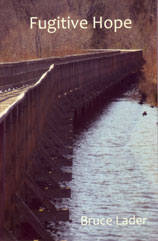 Fugitive Hope by Bruce Lader
Fugitive Hope by Bruce Lader
Červená Barva Press, 2014-
Bruce Lader is the author of four other volumes of poetry, most recently, Embrace (Big Table Publishing, 2010) and Landscapes of Longing (Main Street Rag Publishing, 2009). Discovering Mortality (March Street Press, 2005) was a finalist for the 2006 Brockman-Campbell Book Award. Winner of the 2010 Left Coast Eisteddfod Poetry Competition, his poems have appeared in Poetry, New York Quarterly, Confrontation, The Humanist, New Millennium Writings, Fulcrum, Harpur Palate, Against Agamemnon: War Poems anthology, and over 100 other magazines and anthologies. He has received a writer-in-residence fellowship from The Wurlitzer Foundation and an honorarium from the College of Creative Studies at UC-Santa Barbara. Formerly a Special Education teacher, he is the Director of Bridges Tutoring, an organization in Raleigh, North Carolina, educating multicultural students. His author Website is www.BruceLader.com.
Bruce Lader’s new collection, Fugitive Hope, begins with attractive, jazzy pizzazz and over four sections deepens, broadens, and sweetens, as a pastoral symphony might, into gratitude for life, nature, and his wife, who bears the mysteries of faith and hope. In the lovely “Hide & Seek,” the speaker is only “certain of this abracadabra / moment ludicrous with / giddy freedom.” Witty and cutting, “Memo from Another Planet” imagines Earth’s quick, quiet capitulation to conquest. Near book’s end, we are listening to “covert concerts in these woods,” and in “Vision of Uncertainty,” the poet dreams of seeing spring’s advent in his wife’s eyes after his death. It is an astonishing journey, beautiful and hopeful.
—Kelly Cherry, The Retreats of Thought: PoemsIn Fugitive Hope, Bruce Lader is an adept guide covering the vast territory of this fresh, lively collection. He offers compelling, sympathetic portraits of a wide range of individuals, from soldiers to judges, from Diogenes to Orpheus. A skilled craftsman, he knows just when to pull up at the end of his poems, put on the brakes, and send us flying.
—Jim Daniels, Having a Little Talk with Capital P PoetryThese are tightly structured, tightly controlled poems profuse with passion and a sometimes hidden but always savage lust for life, formed of "the legacy of gargoyle and...of cherubs hovered in balance."
—Jared Smith, The Collected Poems of Jared Smith: 1971-2011Review by CL Bledsoe: http://www.thepedestalmagazine.com/gallery.php?item=23664
$17.00 | ISBN: 978-0-9910091-8-3 | 81 Pages | In Stock
March 31, 2014: Let's Go Back To The Mainland by Grzegorz Wróblewski
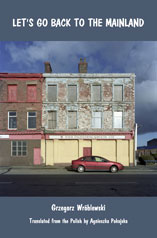 Let's Go Back To The Mainland
Let's Go Back To The Mainland
by Grzegorz Wróblewski
Červená Barva Press, 2014-
Grzegorz Wróblewski, born in 1962 in Gdansk and raised in Warsaw, has been living in Copenhagen since 1985. He has published ten volumes of poetry and three collections of short prose pieces in Poland; three books of poetry, a book of poetic prose and an experimental novel (translations) in Denmark; and a book of selected poems in Bosnia-Herzegovina, as well as a selection of plays. His work has been translated into fifteen languages. His recent book of prose poems, Kopenhaga, was published by Zephyr Press, 2013.
Between classical lyricism and central European surrealism, between the punk aesthetic of Mark E Smith and the existentialism of Camus, between the miniatures of Joseph Cornell and the stalker of Tarkovsky, between painting, plays, poetry, performance art, and the memoir, between Poland and Denmark and the milky way, Grzegorz Wróblewski is on the mainland. His work is the most distinct and diverse coming out out of the so-called "bruLion generation" always moving into the major leagues of this universe and perhaps others. If we don't become extinct as a species in the near future, Wroblewski will go down as one of our greatest writers, artists, and thinkers.
-Marcus Slease, author of Mu (so) Dream (window)Cover photo: Wojciech Wilczyk
Review by Ann Wehrman: http://www.thepedestalmagazine.com/gallery.php?item=23672
$17.00 | ISBN: 978-0-9910091-7-6 | 96 pages | In Stock
March 18, 2014: Diet of Nails by Charles S. Kraszewski
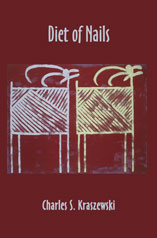 Diet of Nails by Charles S. Kraszewski
Diet of Nails by Charles S. Kraszewski
Červená Barva Press, 2014-
Charles S. Kraszewski. Poet and translator. Recipient of the 2013 Award for the Promulgation of Polish Literature and Culture by the Union of Polish Writers Abroad (London). Recent publications include Beast (poems), Rossetti's Armadillo (verse translations and essays), Irresolute Heresiarch: Catholicism, Gnosticism and Paganism in the Poetry of Czeslaw Milosz. Creative in both English and Polish, he is a frequent contributor to Odra (translations of T.S. Eliot and Robinson Jeffers).
Cover art: Navajo Antelopes by Stefan Tejk
$17.00 | ISBN: 978-0-9910091-5-2 | 87 Pages | In Stock
March, 2014: Inclusions by Joanna Kurowska
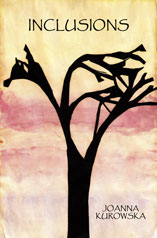 Inclusions by Joanna Kurowska
Inclusions by Joanna Kurowska
Červená Barva Press, 2014-
Cover Art: Untitled (1991) by Paweł Młynarczyk
Joanna Kurowska immigrated to the U.S. in 1988. After publishing two books of poetry in Poland-Ściana (The Wall), 1997 and Obok (Near), 1999-she gradually switched to English as her poetic medium. Many of her poems have appeared in American and European journals. In 2013, eLectio Publishing released The Wall & Beyond, a volume of her Polish poems translated into English. Another collection of Joanna's poetry, The Butterfly's Choice, is forthcoming in 2015, from Broadstone Books.
Inclusions is Joanna Kurowska's first book of originally English-language poems.
These mostly short, lapidary lyrics present to the reader not only a fallen world of detritus, missed emotional connections, thoughtless consumption, empty gratification, but also a world of fragile and fleeting beauty, raptures that last "but a fraction of a second," and art-making that redeems us. A town's soul leaks away as globalization grinds everyone and everything to sameness; a bishop's suit in a window is "a skin missing a body;" and a price is put on everything: "The trees have turned into business letters." This is simply the "now," as Kurowska sees it. But these are spiritual poems, though the god evoked-invoked-is not the property of any single group or mission. In the title poem, the speaker longs "to make sure/that i, too, am included/in the world deposited/on God's tongue." And always, the human possibilities, and the beauty of the world, are what we transcend to. In the final poem, to her son who asks what the meaning of life is, the poet replies, "Next to me, a feather swirls/In the air. A draft carries it/When the window is open" … To me, this is a lovely, non-Western image of the inclusion the poet prays for.
—James Cummins, Author of Still Some CakeInclusions is a book of surprising, reflective encounters with things as small as ants and as big as God. The ants, however, are big enough to make us think about the meaning of life and death. God, on the other hand, is small and light enough to fit into a snowflake. The poems listen to silence, loved ones now gone, cupboards and birds. Joanna Kurowska's slender verses pray by playing and masterfully lead the reader to the realization that "knowing is letting go."
$17.00 | ISBN: 978-09910091-6-9 | 53 Pages | In Stock
—Katia Mitova, Author of Dream Diary
March 7, 2014: A Sharp Double-Edged Luxury Object by Rodica Draghincescu
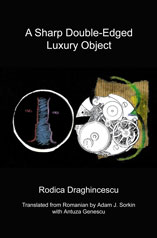 A Sharp Double-Edged Luxury Object
A Sharp Double-Edged Luxury Object
by Rodica Draghincescu
Translated from Romanian by Adam J. Sorkin with Antuza Genescu
Červená Barva Press, 2014-
Cover Art: Devis Grebu
Rodica Draghincescu, born in 1962 in Buziaş, a town in the province of Timiş in the west of Romania, and now living in the region of Metz in France, was called by World Literature Today "one of the most spectacular figures in the new Romanian literature of the 1990s." She has published prize-winning books of original poetry and prose fiction in Romanian and in French (both in France and Canada), as well as translations, interviews, and essays. Her work has also appeared in translation in England, Belgium, Italy, Spain, Sweden, Switzerland, and the United States. In 2006 Draghincescu was awarded the "Le Lien" Prize for Poetry in Nancy-Metz, France, and in 2013 the "Virgil" Prize for European poetry in Paris. Since 2007 she has served as Artistic Director of the International Poetry Festival of Metz and consultant for arts education to the institutions of culture of Lorraine, and she is editor-in-chief of the multilingual web-magazine Levure littéraire and on the editorial board of the German review Matrix.
About the Translators:
Adam J. Sorkin is a translator of contemporary Romanian literature, whose work has won the Poetry Society (U.K.) Corneliu M. Popescu Prize for European Poetry Translation for 2005, as well as the Kenneth Rexroth Memorial Translation Prize and the Ioan Flora Prize for Poetry Translation. In 2011, he published A Path to the Sea by Liliana Ursu, translated with Ursu and Tess Gallagher (Pleasure Boat Studios—Silver Award winner in poetry as a ForeWord Reviews Book of the Year), Ioan Flora’s Medea and Her War Machines, translated with Alina Cârâc (University of New Orleans Press—third-round selection for the National Translation Award), Ion Mureşan’s The Book of Winter and Other Poems, translated with Lidia Vianu (University of Plymouth Press), and The Vanishing Point That Whistles: An Anthology of Contemporary Romanian Poetry (Talisman House). In 2012, Mouths Dry with Hatred by Dan Sociu, translated with the author (Longleaf Press), and The Flying Head by Ioan Flora, translated with Elena Bortă (Toad Press), both appeared. Sorkin is Distinguished Professor of English at Penn State Brandywine.Antuza Genescu is a free-lance translator who lives and works in Timişoara in the west of Romania. Her translations of Rodica Draghincescu with Adam J. Sorkin have appeared in literary publications in the United States, the Netherlands, and Slovenia, both in print and on the web.
Reviews:
Boston Area Small Press and Poetry Scene:
$17.00 | ISBN: 978-0-9910091-2-1 | 41 Pages | In Stock
http://dougholder.blogspot.com/2014/05/a-sharp-double-edged-luxury-object.html
March 7, 2014: Partner, Orchard, Day Moon by Michael Todd Steffen
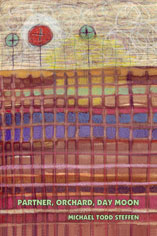 Partner, Orchard, Day Moon by Michael Todd Steffen
Partner, Orchard, Day Moon by Michael Todd Steffen
Červená Barva Press, 2014-
Cover Art: Irene Koronas
Michael Todd Steffen’s poems and articles have appeared in Connecticut Review, Poem (HLA), ACM (Another Chicago Magazine), Ibbetson Street, Wilderness House Literary Review, Muddy River Poetry Review and in the window of the Grolier Poetry Bookshop. A graduate of Belmont in Nashville, on a Rotary International Fellowship he studied and taught in England and France. He was awarded the 2007 Somerville Newswriters Festival poetry prize, and currently lives in Cambridge where he writes and works for non-profits.
I've just come back from reading the poems in Partner, Orchard, Day Moon, full of admiration. Steffen is so alive in his writing, keen with observation, both of what things actually look like, what the wind feels like, how things grow and rot, and also of character, his own, his uncles', anybody's he sees. The book gives us many wonderfully memorable lines using his chosen meter for all its worth. This is very good work.
—David Ferry"A very moving collection of poems. I’m enjoying reading — and re-reading—the poems."
—Kathleen Spivack, author of With Robert Lowell and His Circle: Sylvia Plath, Anne Sexton, Elizabeth Bishop, Stanley Kunitz and Others
Reviews:
Poet to Poet: Michael Todd Steffen, author of Partner, Orchard, Day Moon (Cervena Barva Press, 2014) interviewed by Doug Holder on SCAT TV.
http://vp.telvue.com/preview?id=T02351&video=195415March, 17, 2014; Boston Area Small Press & Poetry Scene:
$17.00 | ISBN: 978-0-9883713-2-3 | 61 Pages | In Stock
http://dougholder.blogspot.com/2014/03/partner-orchard-day-moon-by-michael.html
January 15, 2014: How to be Another by Susan Lewis
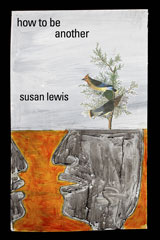 How to be Another by Susan Lewis
How to be Another by Susan Lewis
Červená Barva Press, 2014-
Painting by Melissa Stern
Susan Lewis lives in New York City and edits Posit (www.positjournal.com). Her other books and chapbooks are This Visit(BlazeVOX [books], 2014), State of the Union (Spuyten Duyvil Press), The Following Message (White Knuckle Press), At Times Your Lines (Argotist e-books), Some Assembly Required (Dancing Girl Press), Commodity Fetishism, winner of the 2009 Cervena Barva Press Chapbook Award, and Animal Husbandry (Finishing Line Press). Her work has been nominated for the Pushcart Prize and published in a great number of journals and anthologies, including Berkeley Poetry Review, BlazeVOX, Cimarron Review, The Journal, The New Orleans Review, Phoebe, Raritan, Seneca Review, Verse (online), and Verse Daily.
Susan Lewis poses questions that are sine waves amid the urban ruckus of unsweetened yet unnatural nouns. She nuzzles the vibrato context that her poems would recast. Poetic prophecy thrives amid a balance between selected, anchored logic and prevailing, accurate illogic in the midst. There is a delicious sense of understatement in these poems that drive toward the surprise end of the spectrum that diverts from expectation. Along this welcome string of mysteries, we are perpetually challenged to invent new steps.
—Sheila E. MurphyClipped, cut, cajoling, the prose bits of Susan Lewis are pure poetry. When and whether she unravels the endless to and fro with an/other who never quite makes true contact, or provides procedural instructions on how to be some self, she never spins anything less than "the courage to tell us something new, no matter how frightening or untrue." Her capsuled narratives cohere and dissolve with the piquant absurdity of the voices they refract, then send back out into the ether. This is the kind of entropy "we might as well learn to ride like the wind" to whatever full-stop it takes us, with fun and thanks punctuating our language-voyage.
—Amy KingWaking headlong transcriptions of what poetry's dream can do that no other form of writing can: sing condensed quicksilver improvisations that are any smart feeling reader's sought after letters to the Other you too can learn to become from out a "most entertaining cave." Read these poems and be right back in the new present unfurling moment of language's immediacy—each poem is a successful risk-taking trip flying in and out of Susan Lewis' brilliancy. Rx: read this book.
—Lee Ann BrownSusan Lewis' poems in How to Be Another offer often ironic, always eloquent testament to the agonies of relationships in general and couples in particular. Wielding incisive metaphors like a scalpel, she cuts through social poses and masks to the messy failures and disappointments that lurk underneath the surface of our all too human interactions. Her poetry is compassionate enough to capture our desire to connect with each other and wise enough to recognize our repeated and heartbreaking failure to do so.
—Howard Good
Reviews:
http://galatearesurrection26.blogspot.com/2016/07/how-to-be-another-by-susan-lewis.html
Interview with Susan Lewis by Rob Mclennan on Rob Mclennan's Blog:
$17.00 | ISBN: 978-0-9910091-0-7 | 81 Pages | In Stock
http://www.robmclennan.blogspot.ca/2014/02/12-or-20-second-series-questions-with_15.html
December 3, 2013: The Telling by Denise Bergman
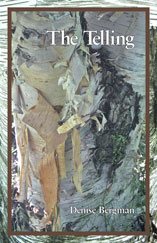 The Telling by Denise Bergman
The Telling by Denise Bergman
Červená Barva Press, 2013-
DENISE BERGMAN is the author of Seeing Annie Sullivan, poems based on the early life of Helen Keller's teacher. She conceived and edited City River of Voices, an anthology of urban poetry. Her poems have been widely published. An excerpt of her poem about a neighborhood slaughterhouse is installed as public art in Cambridge, Massachusetts.
Denise Bergman's second collection of poems is astonishingly original: I can't think of another work that uses something so small to such large effect. The Telling is ultimately about time and memory, art and truth, women and birth and death, and it all comes from "A sepia memory/mildeweed, perhaps, or not"-a tiny center around which Bergman's lyrical intelligence moves with haunting power and grace.
—Martha CollinsAs scribe to the recounting of a few harrowing childhood hours that would shape her grandmother's life, Denise Bergman examines trauma, suppression and how the honest mind must sometimes alter truth. This, then, is no simple compassion; as the narrator bears witness to the recounting of a monumental and guilt-laden secret, Bergman searches underneath the told story. In her spare, halting lines and the wide silences between them, one senses a tender and horrified listening, and in this listening an implied counterpoint, a murmur of truths unspeakable. Every object in The Telling has a vulnerable, culpable animus. All are witnesses. Bergman's testimony acknowledges the heartbreaking necessity of amnesia.
$17.00 | ISBN: 978-0-9910091-4-5 | 84 Pages | In Stock
—Frannie Lindsay
New release: On Paths Known to No One Poems by Flavia Cosma
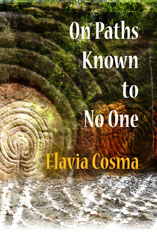 On Paths Known to No One
On Paths Known to No One
Poems by Flavia Cosma
Červená Barva Press, 2012-
Flavia Cosma is an award winning Romanian-born Canadian poet, author and translator. She has a Masters degree in Electrical Engineering from the Polytechnic Institute of Bucharest. Later she studied Drama at the Community School of Arts—Bucharest, Romania. She is also an award winning independent television documentary producer, director, and writer, and has published seventeen books of poetry, a novel, a travel memoir and five books for children. Her work has been represented in numerous anthologies in various countries and languages, and her book, 47 Poems, (Texas Tech University Press) received the ALTA Richard Wilbur Poetry in Translation Prize.
Cosma was nominated three times for The Pushcart Prize with poems from Leaves of a Diary (2006), The Season of Love (2008) and Thus Spoke the Sea (2008).
Flavia Cosma was awarded Third Prize in the John Dryden Translation Competition- 2007, for co-translating In The Arms of The Father, poems by Flavia Cosma, (British Comparative Literature Association & British Literary Translation Centre)
Cosma’s Songs at the Aegean Sea made the Short List in the Canadian Aid Literary Awards Contest, Dec. 2007. Her translation into Romanian of Burning Poems by George Elliott Clarke was published in Romania in 2006. Her translation from Spanish into Romanian of work by the Argentinean poet Luis Raul Calvo was published in 2009 under the title Nimic Pentru Aici, Nimic Pentru Dincolo. Her translation of work by the USA poet Gloria Mindock was published in 2010 under the title La Portile Raiului. Her translation into English of Profane Uncertainties by the Argentinean poet Luis Raul Calvo was published by Červená Barva Press in 2010.
Flavia Cosma was appointed International Affairs Chair for The League of Canadian Poets in 2008.
Cosma’s poetry book Leaves of a Diary was studied at the University of Toronto E. J. Pratt Canadian Literature during the school year 2007-2008. Flavia was decorated with the Golden Medal and was appointed Honorary Member by the Casa del Poeta Peruano, Lima, Peru, 2010, for her poetry and her work as an international cultural promoter.
Flavia Cosma is the director of the International Writers’ and Artists’ Residency, Val-David, Quebec, Canada
Flavia Cosma: http://www.flaviacosma.com
As in Flavia Cosma's whole literary production, nature isn't reduced here to the role of a neutral backdrop to the poet's life; it influences her imagination and consciousness in innumerable ways becoming a source of inspiration for a thorough studying of existing ideas and for awakening new ones. Flavia is an expert in using nature as an adequate space for metaphors, comparisons, symbols. She humanizes nature, granting it an interior life, with the highest intensity, at the supreme level.
$15.00 | ISBN: 978-0-9844732-6-7 | 128 Pages | In Stock
—Dr. Irena Harasimowicz-Zazecka PhD Philology, University of Bucharest, Romania
New release: Hyperlinks of Anxiety by Daniel Y. Harris
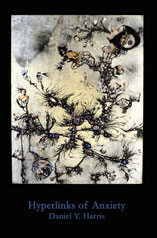 Hyperlinks of Anxiety by Daniel Y. Harris
Hyperlinks of Anxiety by Daniel Y. Harris
Červená Barva Press, 2013-
Daniel Y. Harris holds a Master of Arts in Divinity from The University of Chicago, where he specialized in the history and hermeneutics of religion and wrote his dissertation on The Zohar. He is the author of The New Arcana (with John Amen, New York Quarterly Books, 2012), Paul Celan and the Messiah’s Broken Levered Tongue: An Exponential Dyad (with Adam Shechter, Červená Barva Press, 2010; picked by The Jewish Forward as one of the 5 most important Jewish poetry books of 2010) and Unio Mystica (Cross-Cultural Communications, 2009). He is a three-time Pushcart Prize nominee. His poetry, experimental writing, art and essays have been published in The Denver Quarterly, European Judaism, Exquisite Corpse, The New York Quarterly, Poetry Salzburg Review, among others.
His website is www.danielyharris.com.
Daniel Y. Harris’s new volume of poetry brings together a range of texts – older and newer – evocative of the qualms and uncertainties of our new millennium. A subtle and highly affective read.
—Sander L. Gilman, Distinguished Professor of the Liberal Arts and Sciences; Professor of Psychiatry, Emory UniversityIs cyberspace the most recent iteration of the diaspora? Will the next Zohar be composed in computer code? Can notarikon generate lyric poems out of the discourses of pharmacology, neurology, biophysics…? Welcome to the Hotel Url, Daniel Y. Harris, sole owner and proprietor, where these questions—and others that the reader has yet to dream—will be answered. No need to be anxious: in less than a nanosecond, the hyperlinks elaborated in Harris’s poems will whisk you from catastrophe creation to apocalypse and beyond. Beam me up, Ezekiel!
—Norman Finkelstein, Professor of English, Xavier University and author of On Mount Vision: Forms of the Sacred in Contemporary American PoetryDaniel Y. Harris combines impressive erudition with a profound awe for continuity—that the eternal energies underlying Life itself constantly (re)iterate and (re)incarnate in myriad waxing and waning forms. Ideas birth Art; Art births Ideas. In such fashion, to employ classic terms, the heart and mind forge a dynamic union resulting in both clarity of perception and depth of feeling. These are poems to be read and reread, concepts and descriptive phrases operating like portals into other worlds. In Hyperlinks of Anxiety, Harris functions as a twenty-first century, digital alchemist, adeptly yoking the abstract and concrete, offering us singular and transformative experiences, all the while reminding us that Poetry is trans-authorial, Mystery our only true teacher.
—John Amen, author of At the Threshold of Alchemy; editor of The Pedestal Magazine
Reviews
Review by John Amen:
http://www.albany.edu/offcourse/issue54/john_amen_review_d_y_harris.htmlStride Magazine (Out of England):
$17.00 | ISBN: 978-0-9883713-4-7 | 156 Pages | Out of Print
http://www.stridemagazine.co.uk/Stride%20mag%202013/July%202013/Fear%20The%20Moral%20Nebulae.htm
May 12, 2013: The Bonsai Curator by Pamela L. Laskin
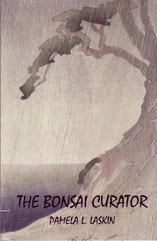 The Bonsai Curator by Pamela L. Laskin
The Bonsai Curator by Pamela L. Laskin
Červená Barva Press, 2013-
Pamela L. Laskin is a lecturer in the English Department, where she directs the Poetry Outreach Center. Poetry collections include: Remembering Fireflies and Secrets of Sheets (Plain View Press), Van Gogh’s Ear (Červená Barva Press), Daring Daughters/Defiant Dreams (A Gathering of Tribes), and The Plagiarist (Dos Madres Press). Several children’s books have been published.
In The Bonsai Curator, through metaphor, myth, and fairy tale, Pam Laskin chronicles a life, from the figurative museum, into the woods, then out of that museum, into the world. But my favorite moments live in her language and imagery, like: “The pines, bamboo, and plum trees... from the same father, / a recluse / who made his children lovely, / but lonely.” / and “I am good at stunting growth; / I’ve kept myself / five forever.” As always, Laskin doesn’t blink, and she doesn’t flinch, either.
—Estha WeinerIn this subtly complex collection of poems, Pam Laskin takes the image of bonsai—stunted and scarred into beauty through deliberate human artifice—and makes it a metaphor of being mothered, smothered and “wretchedly loved.” Then with great deftness, she uproots the image and offers us a fresh and expansive vision of a tree, one that summons us to the sprawling beauty of parenting—and of poetry—that is nurtured in respect and love.
—David Groff, Author of CLAY
Bonsai Beauty
I have been birthed/unearthed
from air,a mutation
my odd, atrophied limbs
are startling.Like a fixture I stand
paralyzed
by motherless memories.Yes, there is a tree here
$17.00 | ISBN: 978-0-9883713-5-4 | 72 Pages | 7 in Stock
but at fifty
I still can't grow.
November 7, 2012: Červená Barva Press proudly announces the publication of our 100th book!
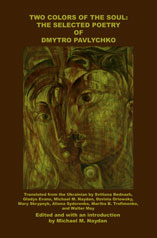 Two Colors of the Soul: The Selected Poetry of Dmytro Pavlychko
Two Colors of the Soul: The Selected Poetry of Dmytro Pavlychko
Edited and with an introduction by Michael M. Naydan
Červená Barva Press, 2012-
Cover Art: “Two” by Olha Fedoruk
Translated from the Ukrainian by Svitlana Bednazh, Gladys Evans, Michael M. Naydan, Dzvinia Orlowsky, Mary Skrypnyk, Aliona Sydorenko, Martha B. Trofimenko, and Walter May.
Dmytro Pavlychko has been an editor, translator, literary critic, film scriptwriter, ambassador, and pro-democracy political figure. He was born in 1929 in a rural village close to the Carpathian Mountains. In 1944-5 he was imprisoned at the age of 15 by the Soviets on fabricated charges for alleged activities on behalf of the Ukrainian Insurgent Army. He has published twenty collections of poetry, as well as several books of poetry translations and literary criticism. Many of his poems have been set to music and turned into songs, with ones such as “Two Colors” becoming national classics known by Ukrainians virtually everywhere. In 1977 Pavlychko received the Shevchenko Prize, the most prestigious literary award in Ukraine. Pavlychko served as ambassador to Slovakia from 1995-1998 and later to Poland from 1999-2002. He was elected a member of the Ukrainian parliament in 2005. He has received the designation of Hero of Ukraine from the Ukrainian government as well as honorary doctorates from Lviv National University and Warsaw University.
He continues to reside in the capital city of Kyiv and remains active in public life. Two Colors of the Soul: The Selected Poetry of Dmytro Pavlychko is his first book of poetry translated and published into English. From the Introduction: DMYTRO PAVLYCHKO: POET AND STATESMAN by Michael M. Naydan
In the tradition of poet-statesmen Neruda and Seferis, Pavlychko writes about his twin passions, love and history. Courageous, direct, and plain-spoken, he has long deserved a place on the international literary stage and Michael Naydan’s skillfully edited selections should confirm it.
—Askold Melnyczuk, award-winning novelist, author and editorOut of Stock, Please Order it from SPD Books:
$17.00 | ISBN: 978-0-9883713-0-9 | 90 Pages | Temporarily out of stock
http://www.spdbooks.org/Producte/9780988371309/two-colors-of-the-soul-the-selected-poetry-of-dmytro-pavlychko.aspx
July 13, 2012: A new Poetry book from Roger W. Hecht
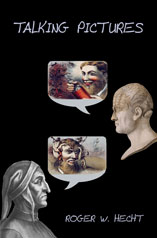 Talking Pictures by Roger W. Hecht
Talking Pictures by Roger W. Hecht
Červená Barva Press, 2012-
Roger W. Hecht grew up in Wheaton, Maryland, in the suburbs of Washington, D.C. His work has been published in Denver Quarterly, Columbia Poetry Review, Mudlark, Diagram, Prick of the Spindle, and other on-line and off-line journals. He was the winner of Syracuse University’s Delmore Schwartz Poetry Award. He is the author of a poetry chapbook, Lunch at the Table of Opposites (Red Dancefloor Press), and editor of The Erie Canal Reader: 1790-1950 (Syracuse University Press). Roger earned an M.F.A. from the University of Arizona and a Ph.D. from Syracuse University. He is currently an Assistant Professor of English at SUNY, College at Oneonta. Roger lives with his wife, Joan Marcus, and two daughters near Ithaca, New York.
Roger W. Hecht’s Talking Pictures is a vivid book of poems which draws us to “....this underworld.” He invites us to have a glance, a look, and then we as readers are deftly taken elsewhere. The taking (and the “talking!”) provides a keen sense of tempo and tone. The poetry is also often comic: in the strangely heroic poem “The Rumsfeld Sestina” (imagine!) the question is raised “What will they do once they catch you?” “You ask me what I knew and when I knew it” (from the same poem) hints at the kind of personal and impersonal worlds and factors which impinge, at least, on all of us. I return to Talking Pictures with pleasure. The variations Hecht employs in the poems’ shapes and cadences intrigue.
—Michael Burkard, Author of Entire Dilemma and UnsleepingRoger W. Hecht’s vocal and evocative collection, Talking Pictures, collects all right, is stuffed with stuff. The things (not poems exactly and not so much prose either but some hybrid unbranded entity) collected here have a thing for thing-ness. It is as if Hecht has constructed an elaborate yet elegant filter that slows the speed of light, turning it into a rich syrup, a saturated plasma, and gorgeous chunks of heretofore unknown matter materialize out of the either or ether. Picture that!
$15.00 | ISBN: 978-0-9831041-5-5 | 50 Pages | In Stock
—Michael Martone, Author of Four for a Quarter
October 17, 2011: New from Červená Barva Press
Now I See It Shaped Poems by Diana Der-Hovanessian
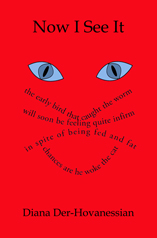 Now I See It Shaped Poems
Now I See It Shaped Poems
by Diana Der-Hovanessian
Červená Barva Press, 2011-
DIANA DER-HOVANESSIAN, author of 15 books of translations and ten volumes of her own poems, has been a Fulbright professor of American poetry twice and led workshops in poetry and the literature of human rights at many universities including Clark, Harvard, MIT, Southern Connecticut. Her awards include prizes from American Scholar, Prairie Schooner, the Paterson Prize, the Columbia U. Armand-Erpf Translation prize, N.E.A. and P.E.N. awards.
From the Forward
Poets have been playing with forms since the beginning of printed poetry. In the Middle Ages, many poems appeared in the shapes of altars and crosses, And in the fifties European poets began a combination of poster art and poetry, using flung words on the page and/or shaped verse.Diana Der-Hovanessian in her twenty years as a visiting poet in the Massachusetts schools found her students, especially younger ones, not only were fascinated by the forms, but enjoyed shaping their own.
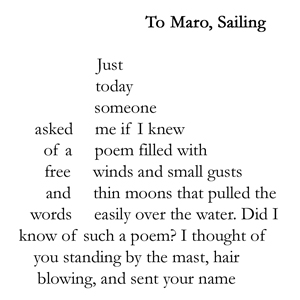
"Among our most readable and enjoyable American poets, Diana Der-Hovanessian stands high... if you think you don't like poetry, (her work) will quickly change your mind; if you're already a hopeless poetry addict, you'll be lavishly rewarded."
—X.J.Kennedy"The range and variety, (of her poems) from the witty and wry to the sad and poignant create a unique portrait of our time, as only superb poetry can"
—F.D. Reeve"Profoundly touching."
—Adrienne Rich"A brilliant poet who has opened up the book of her people to the English speaking world"
—D.M. Thomas, London Times Literary Supplement"Compelling , funny, sad, moving, doing all the things poems are supposed to do and usually don't"
—Joel OppenheimerCover Art: Maro Dalley
$13.00 | ISBN: 978-0-9831041-6-2 | 33 Pages | In Stock
September 14, 2011: New from Červená Barva Press
After Shakespeare: Selected Sonnets by George Held
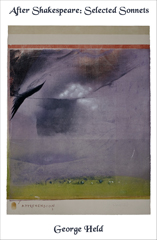 After Shakespeare: Selected Sonnets
After Shakespeare: Selected Sonnets
by George Held
Červená Barva Press, 2011-
George Held is a teacher, translator, writer, and poet whose work has appeared in such places as The Philadelphia Inquirer, Confrontation, Notre Dame Review, New York Quarterly, and Rattle, as well as on NPR and in two dozen anthologies. A five-time Pushcart Prize nominee, he has published a book, ten chapbooks, and two e-books of poetry and edited Touched by Eros, an anthology of erotic verse. He holds a B.A. from Brown, an M.A. from University of Hawaii, and a Ph.D. from Rutgers, taught at Queens College for 37 years, was a Fulbright lecturer in Czechoslovakia (1973-76), and serves on the executive board of The South Fork Natural History Museum, Bridgehampton, NY. He lives in Greenwich Village, with his wife, Cheryl.
George Held's new collection of sonnets, After Shakespeare, is, at every turn, funny, surprising, and sharply observed. In poem after poem, Held follows Ezra Pound's injunction and "makes it new." Whether they are about Edmund Spenser on the E-train, painter Alice Neel or the Kennedy family, Held's poems delight with their music, and at the same time offer a deep wisdom. I love the way Held reinvents poetic tradition here and the way these poems, as he writes in "Discord," bring "joy beyond harmonic motion."
—Nicole CooleyBeginning with his cheeky title (a chronological placement rather than a stylistic description) there is much to enjoy and admire in this new collection of sonnets from George Held. It is as though the awareness of his own belatedness is liberating to the poet, allowing him to explore all manner of interesting topics in a variety of sonnet forms and styles. Anyone interested in the vitality and accomplishment of the contemporary sonnet will want George Held's After Shakespeare.
—Charles MartinTo Hope
You're the thing with feathers, flying skyward
To inspire us when we lack the divine
Afflatus, lifting our spirits, like prime
Vintage or even swill like Thunderbird.You're what springs eternal in the human
Breast, though eternity remains unproved,
Just hyperbole to cheer an unloved
One or fodder for some preacher's sermon.But skeptical as we may be, inured
To loss of jobs and sinking stock prices,
Unfaithful friends and false mistresses,
Past the point where pride can still be injured,
Ears still prick up to your springtime twitter,
Unhibernating souls long in winter.
First Literary Review-East
After Shakespeare: Selected Sonnets by George Held
Cervená Barva Press, Somerville, MA (2011)
ISBN #978-0-9831041-9-3Reviewer: Arthur McMaster
Click here: Book Review - George Held's "After Shakespeare: Selected Sonnets"
$15.00 | ISBN: 978-0-9831041-9-3 | 71 Pages | In Stock
August 26, 2011: New from Červená Barva Press
The Book of Arrows by Mike Amado
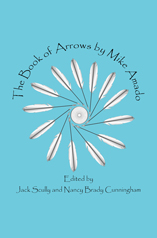 The Book of Arrows by Mike Amado
The Book of Arrows by Mike Amado
Edited by Jack Scully and Nancy Brady Cunningham
Červená Barva Press, 2011-

Accept life
In all its beginnings
Accept life
In all its blooming
Accept life
In all its endings-Mike Amado, December 2008
This was penned by Mike less than a month from when he left us. In this book we try to show you a picture of Mike's early life in Plymouth and his family (Beginnings). How his poetry evolved from the dark to tell us about things which he believed were wrong and should be changed, especially the wrongs done against "Native Americans" and the warehousing of kidney patients into dialysis units (Blooming). In October of 2008 Mike knew that his time was coming to an end and this book includes seven poems written during the last months before his death (Endings). Mike had almost 500 unpublished poems. In his final months he put some of them in collections on his computer in what he called books. Most of the poems in this volume were under the heading of The Book of Arrows; thus, our title. This collection is fondly dedicated to Michael "Mike" "Spokenwarrior" Amado (April 23, 1975-January 2, 2009).
Jack and Nancy
And if I were to cut the thread,/it’ll be my best act of rebellion./I was brought up to be a fighter. Mike Amado was the bravest of poets. Not only for his writing, but also for the way he lived. He took on his doomed life with poetry of honesty and hope. The few times I was fortunate to meet him he was, outwardly, a happy man, not mutually exclusive from his suffering. Moreover he was a deep thinker and writer of great poetry. He truly was a fighter for those who needed a champion and against the illness to which he finally succumbed. His legacy is that bravery, his poetic career and this book of poems.
—Zvi A. Sesling, author King of the Jungle & Editor, Muddy River Poetry ReviewThe Book of Arrows. No kidding. Mike Amado filled his quiver, took aim, and let these poems fly like his life depended on it. It did. An arrow for a childhood of poverty where he slept in the living room so he dreamed on the pillow/just underneath a picture of cats on a fence. An arrow for school which he loathed, often sick, embarrassed in pants from the irregular store, so he learned to learn on my own. An arrow for the dad who left him with only his name so he took his Native name Spider Song because Native custom says that name/passes from mother to child. Arrows for an awkward adolescence of denim jackets, tight jeans, mohawks, and heavy metal all beaten on his teenage passion, the drums! An arrow for European invaders, protesting, dressing and dancing in used regalia at the pow wow. Arrow after arrow for the disease that chased him down from the age of seventeen, challenging death, Who says the story ends? Who says indeed and Mike Amado wasn’t giving in without having his say. I never understood when someone called a poet or poem brave. These poems are not acts of bravery, the living of the life of these poems is what’s brave, a life of dreaming, loving, protesting, drumming, writing, standing on stage as the Spoken Word Warrior.
—David R. Surette, poet, author of The Immaculate Conception Mothers’ ClubMike Amado has left us an astounding body of work that is both insightful and unsettling. Each poem reads like a memoir tinged with an a keen awareness of the unspoken. Michael, from the Hebrew,/Who is like God,/an Archangel with a sword. To call his work compelling is an understatement. Mike’s poems live. Mike’s poems sing.
$15.00 | ISBN: 978-0-9831041-4-8 | 62 Pages | In Stock
—January Gill O’Neil, author of Underlife
August 12, 2011: New from Červená Barva Press
Letters to Saïda Poems by Denis Emorine
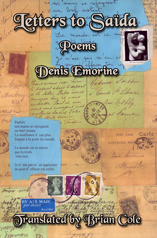 Letters to Saïda Poems by Denis Emorine
Letters to Saïda Poems by Denis Emorine
Translated by Brian Cole
Červená Barva Press, 2011-
Denis Emorine is the author of short stories, essays, poetry, and theater. He was born in 1956 in Paris and studied literature at the Sorbonne (University of Paris). His theatrical output has been staged in France and Russia. He has a great interest for Eastern Europe. In 2004, he won first prize (French) for his poetry at the Féile Filiochta International competition. His poetry has been published in Pphoo (India), Blue Beat Jacket (Japan), Snow Monkey, Cokefishing, Be Which Magazine, Poesia, (USA). His texts also appear on ezines such as: Cipher Journal, Mad Hatter’s Review, Milk, The Salt River Review, Istanbul Literary Review, Wilderness House Literary Review. http://denis.emorine.free.fr
“A language with a mysterious syntax” invades us, covers us with sensual charm, a nostalgic music: this is the new collection of Denis Emorine Letters to Saïda which invites us to decipher it, invites us to participate in its birth: “co-(n)naissance.” Participative birth of the world, of life and of death through love. “I understand my life better/through you” (18) writes the poet and “I know that dying exists.” And the words, taking their cue from his assertions “fall over themselves in (his) mouth,” indomitably, and proceed to the dreamed syntax “to keep a small measure of eternity.”
$16.00 | ISBN: 978-0-9844732-5-0 | 60 Pages | In Stock
—Stella Vinitchi Radulescu, Professor of French at Northwestern University
June 7, 2011: New from Červená Barva Press
The White Cypress by Judith Skillman
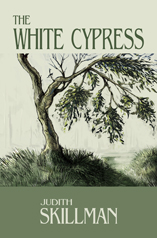 The White Cypress by Judith Skillman
The White Cypress by Judith Skillman
Červená Barva Press, 2011-
Judith Skillman is the author of thirteen full-length books of poetry. Her collection, Heat Lightning: New and Selected Poems 1986 – 2006 was published by Silverfish Review Press. She is the recipient of an award from the Academy of American Poets for Storm, Blue Begonia Press, 1998. She has also received grants from King County Arts Commission and Washington State Arts Commission.
Judith Skillman’s new collection, The White Cypress, is a finely textured weave that astutely examines the “seven deadly sins” from varying points-of-view. Certainty is erased as the reader is immersed in a mercurial blend of myth and personal history. Though we learn that “stunting” can be caused by denial, there is also a “violence in pleasure and leisure” as subtext. Each cherub embodies a nymph, the exotic the familiar. Using crafty fluctuation, these poems dislocate the reader so that firm ground is not an option. Skillman’s world is strangely fluid, yet layered with complexities that complement one moment and subtly contradict the next. The White Cypress asks us to ponder the residual problems of naming (our) “sins.”
—Katherine Soniat, author of The Swing GirlJudith Skillman’s poems are finely hewn, well-balanced, and compelling. Whatever her subject matter—ants, a lemon, September, a harbor, a plum tree—her pieces unfurl, progress, and culminate seamlessly; narratives, portraiture, and commentaries infused with palpable images, lines destined for epigraphy. This is poetry worth reading and rereading.
—John Amen, author of At the Threshold of Alchemy, editor of The Pedestal MagazineSkillman’s poem embrace matter rather than meaning, and all manner of matter—from the Hellenic to the Hebrew, from the heroic to the quotidian. All are pumped and stitched into the skillful skein of Skillman’s work.
—Meredith Davies Hathaway, Poetry InternationalAs one privileged to hold a front-row seat to the blossoming of Judith Skillman as an award-winning poet, I am always happy to treat myself to more of the apt language that she uses to illuminate the intricacies of human relationships. I saw the flowering of this talent, and am happy to add my voice as witness to its craft and its power.
—Jesse Glass, author of The Passion of Phineas Gage & Selected Poems, Professor, Meikei University, Tokyo, editor of Ahadada Press
Raven Chronicles:
http://ravenchronicles.org/Reviews/17-Daley-Skillman.htmlThe White Cypress is reviewed in The Boston Area Small Press and Poetry Scene
$15.00 | ISBN: 978-0-9831041-2-4 | 67 Pages | In Stock
Scroll down to: June 28, 2011
http://dougholder.blogspot.com/
June 2, 2011: New from Červená Barva Press
Counting Blessings by Morris Berman
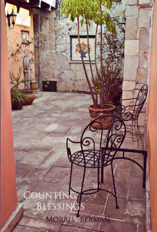 Counting Blessings by Morris Berman
Counting Blessings by Morris Berman
Červená Barva Press, 2011-
Morris Berman is an essayist, novelist, social critic, and cultural historian. He has written ten books and more than one hundred articles, and has taught at a number of universities in Europe, North America, and Mexico. He won the Governor’s Writers Award for Washington State in 1990, and was the first recipient of the annual Rollo May Center Grant for Humanistic Studies in 1992. In 2000, The Twilight of American Culture was named a “Notable Book” by the New York Times Book Review. During 2003-6 he was Visiting Professor of Sociology at the Catholic University of America in Washington, D.C., and Visiting Professor in Humanities at the Tecnológico de Monterrey, Mexico City, during 2008-9. Counting Blessings is his first volume of poetry.
Counting Blessings is an expression of gratitude for a life lived away from the madding crowd. This poetry collection was penned about a year after Berman moved to a small town in Mexico. With the frenzy of American life receding into the background, he was able to sink into the stillness of his new surroundings, allowing long-dormant creative energies to surface. In addition to Counting Blessings, he also wrote a novel and a collection of essays questioning the values of American society, roughly during the same time.
As it turns out, only a few of these poems are about life in Mexico per se. For the most part, Mexico provided the backdrop, the peaceful context in which the author’s unconscious processes were free to roam over the inner landscape, explore its contours and fine details. What emerged were vibrant memories of childhood and adolescence, of times lived abroad, of people who have come and gone. These lyrical poems capture the extraordinary essence of ordinary lived experience, and in doing so represent the true content of our lives, the simple core of what makes us human.
The poet Paul Christensen wrote of this work:
“The[se] poems are a kind of sketch pad for how one regains a life little by little from a culture that had wrapped its tentacles about you and squeezed out your breath. There is the slow process of putting oneself back together again, far from the screeching music of the television, the hard sell of the radio, the hysterical momentum of consumption as a stay against loneliness. All that abates as the exile sits in his [courtyard] with a good book, a quiet heart. The reader who pores over these memories aand observations will feel the ache to slip away to one’s own courtyard in a foreign country, to sit and let the mind idle over its thoughts, to float back to the quiet and calm and, as Berman says, to count one’s blessings.”
Reviews and Interviews
Dissident Voice, July 12, 2011:
Dissident Voice
Pointing A Way: A Review of Morris Berman’s Counting Blessings
By Gary Corseri
Published in Dandelion Salad and The Greanville Post
Dandelion Salad
The Greanville PostAlso in:
Hollywood Progressive
Smirking Chimp
Review of Counting Blessings
Boston Area Small Press and Poetry Scene
July 9th, 2011: http://dougholder.blogspot.com/
Morris Berman Interview on KPFA.org program "Against the Grain", hosted by C. S. Song:
$16.00 | ISBN: 978-0-578-08091-8 | 44 Pages | Restocking
website is http://www.juliollosa.com/; click on "Morris Berman" on the left hand side of the page; then on "Audio Interviews"; and then scroll down and click on "Poetry reading at Moe's Books."
January 30, 2011: White As Silver by Rane Arroyo
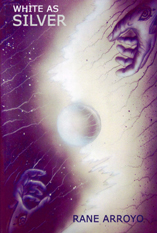 White As Silver by Rane Arroyo
White As Silver by Rane Arroyo
Červená Barva Press, 2010-
This is Rane Arroyo’s eleventh published book of poetry. Additionally, he published a book of fiction (How to Name a Hurricane) and selected plays (Dancing at Funerals). Arroyo has been translated and published internationally; he has also won many awards including the Carl Sandburg Prize in Poetry, the John Ciardi Prize and an Ohio Arts Council Excellence Award, among others. An openly gay, Puerto Rican and Midwestern author, Arroyo’s work has been well received by many constituencies, including the Affrilachian Poets. Arroyo was co-founder and co-publisher of New Sins Press. A creative writing professor at The University of Toledo, Arroyo was named Distinguished University Professor shortly prior to his untimely death on May 7, 2010. He leaves behind a plethora of unpublished works—poetry, plays, versions of memoirs and even a rumored novel.
White As Silver
December, how easily you
dissolve this sad shining day.
It's just dense snowflakes melting
on my expensive boots.Storm warning—a theater of
cold is on tour from Utah and
I loved there before I knew
the below-the-waist was mine.I'm my own home. Icy clouds are
eclipses, white as silver. Snowmen
refuse to believe humans are their
creators. Taxis don't know whereParadise is, should be. I know
that this opaque city will shine.
I was unknown when with you.
Soon, there's tinsel and eggnog.February 12, 2011
$15.00 | ISBN: 978-0-9844732-2-9 | 54 Pages | Out of Print
Review by Michael T. Steffen:
http://dougholder.blogspot.com/
October 5, 2010: A new book from Mary Bonina
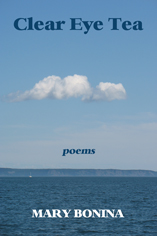 Clear Eye Tea by Mary Bonina
Clear Eye Tea by Mary Bonina
Červená Barva Press, 2010-
Mary Bonina has published poetry, memoir, and fiction in Salamander, Hanging Loose, Gulf Stream, many other journals, and in several anthologies, including Voices of the City from Rutgers University Center for Ethnicity, Culture, and Modern Experience. Winner of Boston Contemporary Authors, a public art project, her poem “Drift” was selected to be inscribed in a granite monolith now permanently installed outside a busy Boston subway station in Jamaica Plain. Bonina is a fellow of the Virginia Center for the Creative Arts and is a member serving on the Board of Directors of the Writers’ Room of Boston, Inc. She holds an M.F.A. from the Program for Writers at Warren Wilson College.
“Mary Bonina’s Clear Eye Tea celebrates the everyday events in our lives: a father returning from work; family members grown frail; a girl weeping on the train. And yet in her hands, the daily has a miraculous tinge. The sharp vision she was praised for as a child, when she was called “the one with good eyes” who could spot the “tiny spider floating/in the cup of wine” has developed into a kind of x-ray that illuminates the secrets, the motivations, the bare bones inside our common gestures. I closed this book with a feeling of more than happiness, something very close to joy, and I can think of no greater praise.”
—John Skoyles, Poetry Editor, Ploughshares, author of The Situation“Here is poetry that does what the title of this book suggests: it gives us a careful steeping in the real, and shows us also how hard it is to stay in emotional touch with it. Here is childhood, for example, seen as if one has finally found a way to open a door on what it was really like. Here also is mortal dread and loss, each embraced without flinching, and here too is praise for gentleness and love, neither any less real than the suffering they are interwoven with. Here then is the “clear eye tea” of Mary Bonina’s poetry.”
—Fred Marchant, Author of The Looking House“Mary Bonina’s poems, written with a strong, authentic voice and a compass-eyed gaze, balance between presence and absence: dirty plastic pretend ivory thing (“Shop of Small Pleasures”); You will hear, too, the dove/its awful sad cry, because/in the rainforest even the sadness/of a dove has more muscle. (“Sorcery”), and between whole and fractured lives: What on earth were they doing with the gun?/They were friends and it was an accident (“Shrine in Cambridge”). Line by line these poems breathe, and it is in this breath the reader’s imagination shares the gifts of revelation, reconciliation, and ultimately, grace.”
—Dzvinia Orlowsky, author of Convertible Night/Flurry of Stones
November 8th, 2010: Interview with Mary Bonina by Lex Schroeder
October, 24, 2010: Review by Rene Schwiesow
$15.00 | ISBN: 978-0-9844732-9-8 | 69 PagesTemporarily out of stock
October 5, 2010: A new book from Roberta Swann
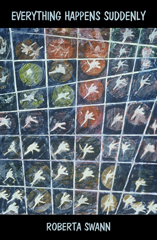 Everything Happens Suddenly by Roberta Swann
Everything Happens Suddenly by Roberta Swann
Červená Barva Press, 2010-
Roberta Swann was program director of the Great Hall at Cooper Union and co-founder of the American Jazz Orchestra. Her poetry and fiction appear in many literary journals. She has taught at the Cooper Union, Indiana University, The New School, Baruch College and the Bennington Writing Workshops.
“Roberta Swann’s poems have a welcome vivacity; they are deft and full of charm and humor. But not entirely. Many of the poems record appealing moments of the natural world and yet sometimes, as she writes, ‘Abandonment is Nature’s way.’ In a poem that begins with recognition of the failing state of her mother, the last stanza begins ‘A bear is at the bird-feeder.’ It is this mixture of light and dark–the embrace of all of it–that is her special gift. Much pleasure lies within the pages of her book.”
—MARY OLIVER“What’s the secret to Roberta Swann’s funny, inventive and moving poems about the natural world? I think it’s her voice, full of humorous aplomb and unflinching honesty. She knows how to balance sadness with happiness. Just as she moves back and forth from city to country, she can also gracefully cross the dangerous bridge between despair–at a beloved mother’s decline–and joy–at the antics of a big brown bear or a grizzled old squirrel. She’s able to see herself inside of nature, not outside. ‘You'll be stardust. I will too’.”
$15.00 | ISBN: 978-0-9844732-4-3 | 72 Pages | In Stock
—MAURA STANTON
Sept. 21, 2010: New from Luis Raúl Calvo
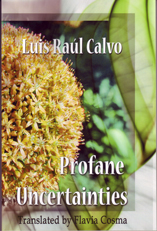 Profane Uncertainties by Luis Raúl Calvo
Profane Uncertainties by Luis Raúl Calvo
Translated from the Spanish by Flavia Cosma
Červená Barva Press, 2010-
Calvo surveys the world and finds Heaven and Hell located close to home — in our own lives — that is to say, in our relationships to others. This significant poet is here brought home for English readers, thanks to the dexterous and careful translations of Flavia Cosma, a distinguished poet herself — in Romanian and English.
—George Elliot Clarke, E. J. Pratt Professor of Canadian Literature, University of TorontoLuis Raúl Calvo is a profound poet, possessor of a grand lyrical power, preoccupied by the existential limits of the contemporaneous man and by the deepest, implacable layers of his consciousness. All of these are exposed in a concentrated and natural manner, in an original language, with a very personal style which distinguishes this poet from the traditional, run of the mill poetical discourses. Calvo's poetry will never receive the kiss of death, of resignation of enunciation or frivolity, but will soar with the eternal emotion of innocence and dedication.
—Geo Constantinescu, Professor Spanish Literature, University of Craiova, RomaniaThis book was funded by the SUR Translation Program in Buenos Aires, Argentina who awarded the translater, Flavia Cosma and Červená Barva Press funding for the publication of this book.
October 25, 2010
$15.00 | ISBN: 978-0-9844732-7-4 | 45 Pages | In Stock
Review by Zvi A. Sesling http://dougholder.blogspot.com/2010/10/profane-uncertaintiesby-luis-raul-calvo.html
Sept. 18, 2010: New from Tam Lin Neville
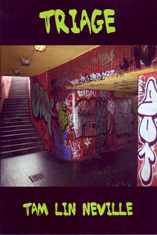 Triage by Tam Lin Neville
Triage by Tam Lin Neville
Červená Barva Press, 2010-
Tam Lin Neville lives and writes in Somerville, MA. Journey Cake, her previous poetry collection, was published by BkMk Press (University of Missouri, Kansas City). She has received a Somerville Arts Council grant. Her poems have appeared in Harvard Review, Mademoiselle, American Poetry Review, Ironwood and Sulfur, among others. With her husband, Bert Stern, she co-edits Off The Grid Press, a press for poets over sixty. She also works for Changing Lives Through Literature, an alternative sentencing program.
Tam Lin Neville’s new book, Triage, reminds us that our cherished notions of freedom, happiness and plenty actually conceal large communities of entrapment, misery and poverty where many are simply left to die – triaged, if you will – in front of our eyes. An observant neighbor, a journalist, and above all, a poet of great skill and heart, Neville speaks for those who cannot speak for themselves. Few poets writing today have the patience and talent to guide us toward such a civilizing compassion.
—Roger MitchellBehind this remarkable book is a mind that has long contemplated the humanity of those she meets every day – neighbor, stranger, friend. Yet she speaks from a respectful distance and this enables her to write poems with no self-interest, only clear sight and generosity. Her language is spare, stripped of all aesthetic preening, creating a poetry that is both accurate and visionary.
—Betsy ShollTriage is a tough, uncompromising book, but one that’s also big-hearted, despite the sorrow so evident in the title and in many of the individual poems. Written with great economy and precision, the lyric here is not merely a display of skill, but a form of wisdom literature, a site map to help us navigate these difficult times. I hear the voices of Dickinson and Niedecker – stern mentors, indeed. In Neville’s poems their legacies are gracefully and fearlessly served.
—David WojahnJust wanted to tell you how much I like your book, Triage. I read it through twice, both times with deep appreciation for the attention your poems demanded, for all their seeming simplicity, and with deep interest in their subject matter. I'm full of admiration and even soul expansion from the achievement of the poems. How spare you are in descriptions of human beings and their plights, how delicately you give us scenes, characters, trajectories of lives that I, for one, have always wanted to turn away from to avoid the deep disturbance I've felt. I love how you order the poems. The book reads like a story. I love your internal rhymes, a soothing, lullaby quality in some of them. I am thrilled at how you ended the book, which lifts it high toward hopefulness in a thin gruel world. Good for you, Tam. Good for us. I hope your publisher enters your book in various contests for 2020 books. Integrity — that's the word I want. Trustworthiness. Not always apparent in poetry. I am nourished by it.
$15.00 | ISBN: 978-0-9844732-3-6 | 51 Pages | In Stock
—Sondra Zeidenstein Editor, Chicory Blue Press
New from Andrey Grisman
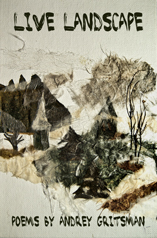 Live Landscape by Andrey Gritsman
Live Landscape by Andrey Gritsman
Červená Barva Press, 2010-
Andrey Gritsman is a poet and essayist, born and raised in Russia. He lives in New York City and works as a physician. He has been widely published in Russia, including five collections of poetry. Poems, essays and translations in English have appeared in Manhattan Review, New Orleans Review, Denver Quarterly, Notre Dame Review, Poet Lore, South Carolina Review and many others and were anthologized in Modern Poetry in Translation (UK), in Crossing Centuries (New Generation in Russian Poetry), The Breath of Parted Lips: Voices from the Robert Frost Place and in Stranger at Home: American Poetry with an Accent. Collections of poetry and essays Long Fall was published by Spuyten Duyvil in 2004 and recent poetry collection PISCES by Numina Press. Andrey’s work was nominated for the Pushcart Prize in 2005, 2006 and 2007 and was on the short list for the Joyce Osterweil/PEN American Center Prize in Poetry in 2005. He runs the Intercultural Poetry Series in a popular literary club Cornelia Street Café and edits international poetry magazine INTERPOEZIA.
Cover Art: Natasha Gasteva
Andrey Gritsman is quite literally a groundbreaking poet. From Moscow to New York is a steep distance but Gritsman makes us aware of the threads that link seemingly disparate occasions. Fresh perceptions create new styles and Gritsman’s is more than a synthesis of two cultures: it is an art that probes delusions and pleasures by a poet who has been around some daunting blocks.
—Baron Wormser, author of Good Trembling and many other collections of poetry.Andrey Gritsman’s poems are unwavering in their honesty, relentless in their assessment of contemporary life, and clear-eyed in their approach to human love and mortality. We instantly recognize the terrain he is negotiating. Perhaps only Gritsman, with his unprejudiced immigrant’s eye, can describe the empty, arid landscape of the American West. These are poems that peer into the abyss behind the official public happiness of American life, the compulsion to be always hopeful, positive and bubbling over with good spirits. That is to say: they are real poems, and make no accommodation with fanciful dreams. Read ‘em, and weep.
—Kurt Brown, poet, editor of several anthologies, founder, Aspen Writers’ SeminarGritsman’s poems are tenderness in transit. They fully inhabit their evoked circumstances so that their significance keeps expanding and resonating before the quality of attention given over to them. He so quickly is able to penetrate to the depths in the poems, it is as though working with a large, oiled, sharp shovel while the rest of us are working with miniature dull and rusty spoons. The use of brevity in some of these poems remind me of my beloved Denise Levertov. His poems are “time-flooded” and remind me that whether we look backward or forward in time always the beloved figures are diminishing, disappearing, and the shadow growing from our own foot soles moves among the company of many other shadows. “Constant departure,” as he says it, is our state, and all we can do is stand for our count, make our song, and salute each other.
$15.00 | ISBN: 978-0-9844732-1-2 | 73 Pages | In Stock
—Jeanne Marie Beaumont, author of Curious Conduct (BOA Editions)
Just released March 30th, 2010
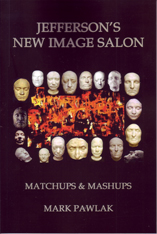 Jefferson’s New Image Salon
Jefferson’s New Image Salon
Matchups & Mashups by Mark Pawlak
Červená Barva Press, 2010-
Mark Pawlak is the author of five previous poetry collections of which Official Versions is the most recent. He is also the editor of numerous anthologies, including When We Were Countries, fourth in a series of the “best” poetry and prose by high school-age writers, and Present/Tense: Poets in the World, an anthology of contemporary American political poetry. His work has been translated into German, Polish, and Spanish, and has appeared widely in English in anthologies such as The Best American Poetry, Blood to Remember: American Poets on the Holocaust, and For the Time Being: The Bootstrap Anthology of Poetic Journals and in such literary magazines as New American Writing, Mother Jones, Poetry South, The Saint Ann’s Review, and The World, among many others. He supports his poetry habit by teaching mathematics at UMass Boston, where he is director of Academic Support Programs. He lives in Cambridge.
When will we pass Raphael’s Silver Cloud Lounge and Goya Cosmetics? Do we have time for a quick stop at Unicorn Hair & Nails? Do you ever wonder what’s on the menu at the Café Magritte? Have you put in your holiday order with the butcher at Bosch’s Meat Market? Do you secretly want to sneak into Grendel’s Den or buy the latest discount item from Golem Sales? This is America, and, as Mark Pawlak makes amply evident, it just keeps getting stranger and stranger. If you are trying to get to Vampire Manor or need the phone number of Sasquatch Taxidermy, this is the only accurate guidebook available today.
—John YauIn Jefferson’s New Image Salon, Mark Pawlak transforms a one-trick pony into a circus of surprising yokings, which on further inspection turn out to be not only surreal—Shylock’s Hair Designs, Onan Gasoline Engines—but poetic and real. The preposterous, often hilarious names of American businesses Pawlak found in doing his mixing and matching make Edsel seem a great name for an automobile.
—Charles North, author of Complete LineupsCover Art: “Coda,” Digital Collage by Daniel Y. Harris, www.danielyharris.com
$15.00 | ISBN: 978-0-9844732-0-5 | 32 Pages | In Stock
March 17th: Gloria Mindock's new book from U Šoku Štampa Press
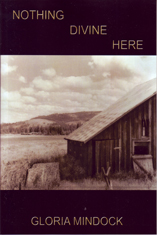 Nothing Divine Here by Gloria Mindock
Nothing Divine Here by Gloria Mindock
U ŠOKU ŠTAMPA PRESS, 2010-
Gloria Mindock is the author of the forthcoming book, La Porile Raiului (Ars Longa Press, 2010, Romania) and Blood Soaked Dresses (Ibbetson Street Press, 2007). She is editor of Cervena Barva Press and the Istanbul Literature Review, an online journal based in Istanbul, Turkey. She has had numerous publications including Poet Lore, River Styx, Phoebe, Blackbox, Poesia, Bogg, Ibbetson, WHLR, UNU: Revista de Cultura, Citadela, Aurora, and Arabesques. She has been nominated for a Pushcart Prize, St. Botolph Award, and was awarded a fellowship from the Massachusetts Cultural Council distributed by the Somerville Arts Council.
From the Preface
Passionate and rebellious, Gloria Mindock’s poetry jumps forcefully from the page, grabs the reader by the collar of his coat and holds and hangs on to his/her attention.
In unison with the poet’s heart, the nature of things is in big turmoil here, forever searching for the elusive Divine Harmony, the only force capable of rearranging the world into one of love and understanding.
In a perpetual state of sadness and grief, these poems descend to the very core of the raw discourse of the soul, devoid of artifice and pose. The stark simplicity of their statement disarms us and leaves us vulnerable in front of the bitter reality of life.
—Flavia Cosma, author of seventeen books of poetry, a novel, a travel memoir, and four books for childrenThe stunning thing about Mindock’s work is its overwhelming sense of the real world in real time. It’s “poetic” in its own way, well-crafted, agile, nicely balanced, but in terms of content, you move into Mindock’s world and you’re suddenly in a basic, essential reality that hardly anyone in the poetry world touches: “I see your skull veiled by a cloud/Eyelids sunk/Hands pressed on knees/Heart gone/A sight of secrets//I think living is brave/Death is a release/The dog knows -- heaven is nothing but a frill.” (“Dog Dance,” p.41). An interesting mixture of existential toughness crowned by an ultimate sense of final nothingness.
It’s interesting how Mindock’s world-view combines a dispairing sense of expanding out into the horrific Now with a vision of everything eventually dissolving into nothingness: “Living on this earth is/one big nightmare.,/This landscape frightens me./Too much death./Think about it.//I refuse to fall short of detail so/ here it is: Death of emotion/Death of love/Death of skin...//I’m going away to where I really belong./To me, this is uplifting.” (“Aftermath,” p.63).
Very few style-games here. This is poetry as a minimalist Declaration of Finality. And the very fact that Mindock doesn’t play style-games makes her vision a thousand times more effective/powerful than the word-game players who turn poetry into a kind of syntactical basketball.
—Hugh FoxIn Nothing Divine Here, Mindock invokes a resurrection, the power of love to spring eternal from the hurt we all know. She looks at the personal and the political, that haunting polarity, and weaves a gentle but brave hopefulness between them.
—Afaa Michael Weaver, Simmons CollegeGloria Mindock is a fearless poet. She gets right in the face, in the very nostril of death. She confronts her past lovers, her dreams, dashed or otherwise, not with cool detachment, but with a visceral lyrical and emotional engagement. She has made her pain into high art, into the high holy. Mindock, is a force to be reckoned with, so watch your back!
—Doug Holder, Arts Editor The Somerville News, Founder Ibbetson Street Press
Review by Michael Parker at Unlikely Stories: http://www.unlikelystories.org/blog/
$15.00 | ISBN: 978-0-578-04760-7 | 87 Pages | In Stock
Just released December 15th, 2009
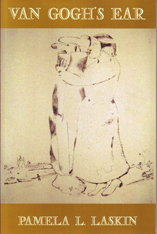 Van Gogh's Ear by Pamela L. Laskin
Van Gogh's Ear by Pamela L. Laskin
Červená Barva Press, 2009-
Pamela L. Laskin, a teacher, writer, cyclist, swimmer and avid reader, has had many poems, short stories and children's stories published in journals and magazines. She is a lecturer in the English Department at The City College, where she directs The Poetry Outreach Center. Central Station, her first book of poetry, was the winner of the Millennium Poetry Prize. Remembering Fireflies, her second collection, was published by Plain View Press, and Ghosts, Goblins, Gods and Geodes, her third collection, was published by World Audience Press. In 2009, Plain View Press published her fourth collection, Secrets of Sheets. Three poetry chapbooks, five picture books and two young adult novels have been published as well. She edited a collection of original fairy tales, The Heroic Young Woman, published by Clique Calm Books. She lives in Brooklyn, New York with her husband, Ira, while her children, Craig and Samantha, are away at school completing their degrees.
Pamela Laskin is equally able to grasp the big picture -- “born/ out of millions of years/ of old thumbs and cortexes” -- as well as the small, luminous detail. She writes with vivid immediacy about the people and places around her, so that each poem, “Each bead is like the cell of a body/ passing through a busy street/ on a quiet day.” It is a pleasure to spend time with and have one’s senses sharpened by this book.
-Elaine EquiPamela Laskin’s new poems move richly and swiftly through memory and presence, through family, romance, friendship, and art, through Brooklyn and the rest of the world. They are passionate, quiet, thoughtful, intelligent. I want to say there is something modest about them, but it’s the modesty of someone who knows she knows and will lift the screen for a second if only to see if you can figure it out. Van Gogh’s Ear is a fine and generous collection.
-Mark StatmanIn a Glass Ball
Clouds stuck in the sky
summer has evaporated
anorexic trees,
children gone from the streets.Soon I will be snowed under
as I am, perhaps, already
staring out the windowlike the woman trapped in a glass ball
which people turn over, indiscriminately
watching the tiny flakes
scatter haphazardlyobserving
$15.00 | ISBN: 978-0-578-04084-4 | 74 Pages | In Stock
the unsettling appearance
of a woman
going nowhere.
Released October 24th, 2009
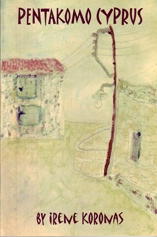 Pentakomo Cyprus by Irene Koronas
Pentakomo Cyprus by Irene Koronas
Červená Barva Press, 2009-
Irene Koronas is the poetry editor for the Wilderness House Literary Review and Ibbetson Street Press. She is the author of self portrait drawn from many (Ibbestson Street Press, 2007). She also has several chapbook publications, the latest being, Zero Boundaries (Cervena Barva Press, 2008). Irene’s work has been widely published in numerous literary journals including Lummox, Free Verse, Posey, Arcanam Café, Spearhead, Index poetry, Unblog, Haiku Hut, Lynx and the anthologies Bagels with the Bards and WHLR Anthology, 2006. Articles written about Irene have appeared in The Boston Globe, What’s Up With Your Words, Sedaca, The Alewife, Spare Change, The Somerville News, and the Cambridge Chronicle.
These poems of beauty and strength unfold one into another as Irene weaves an engaging, thoughtful cacophony of experiences lived out over six weeks in Cyprus. I was drawn into a visual arrangement of days by an extraordinarily gifted communicator. I couldn't put this book down until I lived through all the wonder and discovery on display.
-C K Johns, authorIrene Koronas writes with the confidence of a life-long poet. She knows the ground on which she stands. With tenderness and honesty she takes her readers to the churches, kitchen, and dusty paths of her ancestral village. Orange trumpet flowers, rusty rocks, pregnant dogs, figs, saints, kneaded dough, peacocks, icons, olive oil and old women pepper the pages of Irene’s poetry painting a generous, complex, vibrant picture of Irene’s recollections of six weeks in Cyprus. At its heart, this is a love story. It traces the passion, ambivalence, and longing of desires that cannot be resolved simply. In recounting her journey, Irene invites us to look for the remains of our own histories, our own relinquished passions.
-Jennifer Peace, Ph.D.In, Pentakomo Cyprus, Koronas finds her way through each day, image by image, sound by discrete sound, giving us the crystalline collection of things, our mixed media realities. The collection is a mobile of emotions made small and delicate or large and brusque. It is this honesty that lets the reader into a life that is wondrously and marvelously made, tiny step by tiny step, great leap by great leap.
$15.00 | ISBN 978-0-578-02262-8 | 50 Pages |
-Afaa Michael WeaverOut of Stock
Released June 12th, 2009
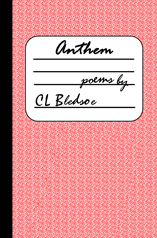 Anthem poems by CL Bledsoe
Anthem poems by CL Bledsoe
Červená Barva Press, 2009-
CL Bledsoe has published work in over 200 journals and anthologies, including The Cimarron Review, Nimrod and The Arkansas Review. Winner of the Blue Collar Review's Working People's Poetry Contest, he is also a 3-time Pushcart Prize nominee. He is an editor for Ghoti Magazine. http://www.ghotimag.com and the author of a chapbook entitled_______(Want/Need)
CL Bledsoe's Anthem is succinct, shrewd and contemporary. Bledsoe is a modern-age poet with the unique ability to bring the reader smack into the moment with him ... Anthem's poems are no exception. Often confessional, occasionally biting, Bledsoe proves once again that he is the poet for generation X, Y and whatever lies beyond.
-Patricia Gomes, editor of Adagio Verse Quarterly and poetry moderator of iVillage's Poet's WorkshopFresh, funny, hip, anarchic, jaded, secretly hopeful, angry, wry, laid-back: to read CL Bledsoe's Anthem is to enter a world that may make you twitch - but will surely help you keep on keeping on. These songs of punked-out innocence stage-strut across the page, even when they claim they're simply slacking on the couch. Join Frog and Death and the absinthe squirrels on a savvy, consciousness-jolting road-trip through the landscape of right now. I loved this smart and artful book. I bet you will to. Open it. Find out.
$15.00 | ISBN 978-0-615-25796-9 | 65 Pages | In Stock
-Jeanne Larsen, winner of the AWP poetry book award
Released June 12th, 2009
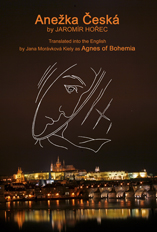 Anezka Ceska by Jaromir Horec
Anezka Ceska by Jaromir Horec
Translated into English by Jana Morávková Kiely as Agnes of Bohemia
Červená Barva Press, 2009-
Jaromir Horec was born on December 18, 1921 in Chust, in Sub-Carpathian Ruthenia, which in 1919, at the treaty of Versailles, had voted to become part of the newly formed Czechoslovak Republic with an enlightened, freely elected government led by the humanist philosopher, Tomas Garrigue Masaryk.
Throughout the Nazi occupation of Czechoslovakia, Jaromír Hoec was active in the underground anti-Nazi youth movement. After World War II, Sub-Carpathian Ruthenia was not returned to Czechoslovakia but was annexed by Stalin to the Soviet Union. Thus Horec, living in Prague, became an expatriate in his own country. He was a prolific poet, who was not allowed to publish for two periods of twenty years each: 1948-1966 and 1969-1989.
In 1977, he signed Charter 77 and two years later, he founded the Czech underground press Ceska Expedice for which he was imprisoned in 1981. His many works of poetry, include Anezka Ceska, and Chleb Na Stole, as well as many other publications, such as Why I Am Not a Communist and Sub-Carpathian Ruthenia-an Unknown land have been coming out only since 1989.
$15.00 | ISBN 978-0-578-02262-8 | 54 Pages |In Stock
Released April, 2009
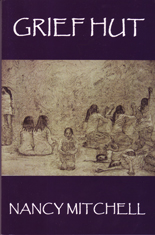 Grief Hut by Nancy Mitchell
Grief Hut by Nancy Mitchell
Červená Barva Press, 2009-
Nancy Mitchell is the author of The Near Surround (Four Way Books, 2002) and her poems have appeared in Agni, Poetry Daily, Salt Hill Journal, Great River Review, and are anthologized in Last Call by Sarabande Books. She has received an Artist in the Schools grant for Virginia, and residency fellowships from the Virginia Center for the Creative Arts in Amherst, Virginia and in Auvillar, France. Mitchell teaches in the English Department at Salisbury University, Maryland, and has taught in the Stonecoast MFA program in Maine. She resides in Salisbury, on the Eastern Shore of Maryland, with her husband John Ebert, a filmmaker.
The Grief Hut stands on an imaginary beach, where women help each other to give birth to their griefs: the birth of sorrows here is given words with a growing power, intensity, and wisdom, a wisdom still wired to its human love and memory.
-Jean ValentineMitchell is blessed with a vivid--and haunting--memory--of particulars, the things of our past, and of the more complex feelings the things generate. She refuses nothing, she is deadly accurate, yet she sings. We should read her.
-Gerald SternThe poems in Nancy Mitchell's book Grief Hut are so lucidly and deeply felt that they cut directly to the bone of the experiences they are recounting. This is a true and an incredibly beautiful book.
-Malena MörlingHer descriptions of people, the details and detritus of their lives are studied and stunning. May we hear more from this talented poet.
-Doug Holder/Ibbetson Street PressReview of Grief Hut:
$15.00 | ISBN: 978-0-615-25797-6 | 66 Pages | In Stock
http://coloradoreview.colostate.edu/cr/bookreviews/griefhut.html
Released March, 2009
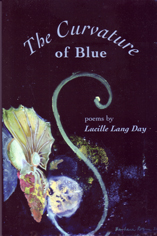 The Curvature of Blue by Lucille Lang Day
The Curvature of Blue by Lucille Lang Day
Červená Barva Press, 2009-
Description: The Curvature of Blue traverses an arc from the personal to the social and historical to the cosmic and philosophical. As a scientist and poet, Lucille Lang Day goes beyond celebration of the natural world to explore the intersections of science, nature, and human experience, and to meld scientific accuracy with intuition and emotional response. Whether writing about jellyfish, war, or her own experience, she draws attention to important questions and inspires us to think more deeply about what it means to be human and how our choices affect the planet Earth.
"In Lucille Lang Day's poems, stunning transformations of language cross the placenta barrier between the worlds of science and human emotion. She thinks and feels in color, enabling us to inhabit the complexity of the universe-as experienced at breakfast with a lover, in the wild with caribou, or in meditations on acts of historical horror-all made radiant by her lyric gifts and wisdom."
-Teresa Cader"Intelligence enjoying itself, awareness at play, attentiveness dancing through life's minefields: smiling at itself in its new black car ("Nor have I shunned onyx jewelry. That would be foolish"), Lucille Lang Day will at first glance make you smile and smile again. Then, with her scientist's mind, her woman's heart, her pain at injustice and evil, and her poet's eye and ear, she will carry you "through the mountains and canyons of space-time" to a fuller humanity. The Curvature of Blue is a wonderful book and I feel lucky to have read it"
-Alicia Ostriker"Is the sky blue? Day's poems paint it a hundred different ways, full of geometry and change, structure and feeling, as plangent as a sunset, as secret as an electromagnetic field. Divine love holds the physical parts together, even as human love and its marvelous stories are the substance of our lives. Here are witty, intelligent, affectionate poems making grand, skeptical comparisons and painting us and our shadows in brilliant colors--perfect poems for our time."
$15.00 | ISBN 978-0-692-00181-3 | 90 Pages | Out of stock
-F.D.Reeve
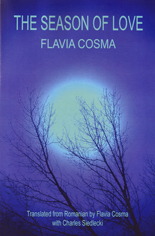 The Season of Love by Flavia Cosma
The Season of Love by Flavia Cosma
Červená Barva Press, 2008-
Once again in The Season of Love, Flavia Cosma offers us those momentary glimpses and sensations briefly felt and viewed which hide and yet reveal the testament of life. Through the transient sensations of reality, the poet lures her readership deep into the mystic world of her eternity. Each poem serves to lead the reader through the pain, suffering and loneliness of life while searching for truth's hidden mysteries which serve to make life meaningful and beautiful, yet remain to be discovered in that continual renewal and rebirth of life.
David Mills, poet and critic
Toronto, Canada
One of prevailing themes in Flavia Cosma's poetry is love, but not as a banal, run-of-the mill experience. Instead, it has the elemental intensity of natural phenomena, which best picture both the breakdown of feelings and the undying hope. And that's where the poet places her wise optimism.
Dr. Irena Harasimowicz-Zarzecka
PHD Philology, University of Bucharest, Romania
Toronto, CanadaExcerpt from the Introduction:
"...Cosma employs
No such wasteful rhetoric. Her poetry—
Analytical, elegant, eloquent—
Is as superb as poetry demands.
Her devotion delights; her lines instruct.
The Season of Love is a fresh gospel,
Skewering our pretensions forcefully.
Its lush richness of imagination,
Singing through Cosma’s and Siedlecki’s English,
Is compelling and a consummation,
Marrying music and morality."
George Elliott Clarke
E.J. Pratt Professor of Canadian Literature
University of Toronto
Laureate, 2001 Governor-General’s Award for PoetryFlavia Cosma is an award winning Romanian-born Canadian poet, author and translator. She has published thirteen books of poetry, a novel, a travel memoir and three books for children. Her book, 47 Poems, (Texas Tech Press) received the ALTA Richard Wilbur Poetry in Translation Prize. Červená Barva Press published her chapbook, Gothic Calligraphy and will be publishing her newest collection, Songs at the Aegean Sea.
$15.00 | ISBN: 978-0-615-20097-2 | 89 Pages | In Stock
 The Man in the Booth in the Midtown Tunnel by Doug Holder
The Man in the Booth in the Midtown Tunnel by Doug Holder
Červená Barva Press, 2008-
Order online at Lulu.com: http://www.lulu.com/content/2651312
For years that image of the man in a small plastic booth in the fume-filled Midtown Tunnel that connects Queens to Manhattan in NYC haunted me. As a kid traveling into the city from the sheltered, well-manicured lawns of Long Island to the enigmatic, cosmopolitan world of Manhattan, I couldn't help but wonder about that blue- uniformed lone figure pacing the perimeter of his plastic cage. I think he represented to some extent my fear of the world outside the comforts of my family, and the staid, small town I lived in, Rockville Centre.
I have always admired writers like the New Yorker's Joseph Mitchell, who wrote about the outsiders, the denizens of the old Bowery, the ner-do-wells, the poseurs, the dandies, and the stumblebums, who make the city a both fascinating and frightened place. I always wondered as a kid if I would wind up in the middle of a metaphorical tunnel, a man in a cage, looking for the light. And I guess to some extent we all do in one-way or the other, whether we like it or not.
So I thought this image would be a perfect focal point for my poetry collection, a sort of "Spoon River Anthology" that would consist of character studies of the many men and women I have met, watched and imagined in my time across this stage. I include myself in this collection, because I have always identified with that man and I see his ghost wherever I roam.
Doug Holder
"I am enjoying The Man in the Booth in the Midtown Tunnel -- perfect poems, particularly in that ambiance."
-Dan Tobin, Chairman, Writing and Publishing Program at Emerson College"Aside from being the founder, publisher, and co-editor of the prestigious and influential Ibbetson Street Press, Doug Holder writes poetry with a passion and insight that deserves prestige and influence all its own."
S. Craig Renfoe, Jr., Main Street Rag"Holder's work is rich with textual imagery… a master poet who sees the world clearly and shares that vision generously with readers.
Laurel Johnson, Midwest Book Review"A great poet and a Boston legend."
Joe Gouveia, host of "Poet's Corner," Provincetown radio"I don't think I send you kudos enough because I take your magical perceptions of the ordinary, your unique take on the everyday, as something you do time and time again always in surprising ways.... from toilet to pay phones, to the fluid connection to all things human is utterly Doug Holder and there isn't anyone out there remotely doing what you do so beautifully...so dryly and always with human regard."
Linda Larson, former editor-in-chief of Spare Change NewsNow available as a talking book for the blind:
http://webopac.klas.com/id1aopac/title/summary.jsf;jsessionid=feeaf4946520e01dff3aa80219f9?id=142445757.9032Order online at Lulu.com: http://www.lulu.com/content/2651312
$13.00 | ISBN: 9780979531361 | 72 Pages
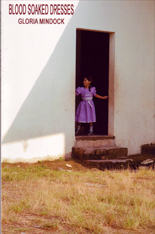 Blood Soaked Dresses by Gloria Mindock
Blood Soaked Dresses by Gloria Mindock
Ibbettson Street Press, 2007-
In her fascinating poem cycle, Gloria Mindock jolts back into memory the roots of El Salvador's present day violence. Mindock coaxes to the page the voices of the dead who lie, less in peace, than in restless obsession with the atrocities they suffered. She brings forth as well the voices of the living who seem startled to find that they died somewhere between the horrors they witnessed and the grave they have yet to lie down in. Blood Soaked Dresses is a beautiful, harrowing first book.
--Catherine SasanovWe are reminded of Cezar Vallejo's witnesses: bones, solitude, rain, and the roads -- that we are tied to each other in beauty and suffering, life and death. Gloria Mindock's poems grant us the voice of a soul caught on a limb between the promise of peace everlasting and impossible resurrections. Poem after poem we are asked to uncover those whose bitter ash weeps over the world, and no other country/wants to see it. This book is written from a compassionate heart that whispers and grieves, one that isn't afraid to holds its gaze.
--Dzvinia OrlowskyA poet must never shy from the necessary, no matter how hard it is. In poetry that is both elegant and brutal, Gloria Mindock exposes the horror of the Salvadorian conflict especially on women. Though Salvador has faded from the front pages, the war has reincarnated in other countries on other continents making "Blood Soaked Dresses" completely contemporaneous. This poetry possesses, as Yeats said, "a terrible beauty." And we need it now more than ever.
--John MinczeskiThe reader of Blood Soaked Dresses is enriched by Mindock's power and commitment. She has earned a place among our great protest poets, reminding us, with lyric tension, that social justice is our constant and necessary concern.
$13.50 | ISBN: 978-1-4303-1034-1 | 72 Pages
--Simon PerchikOrder at Lulu.com: http://www.lulu.com/content/1172519
"El Salvador, 1983" was translated into Serbian by Berislav Blagojevic:
http://hiperboreja.blogspot.com/2011/05/el-salvador-1983-glorija-mindok.htmlBerislav Blagojevic's Blog:
http://berislavblagojevic.wordpress.com/2011/05/17/el-salvador-1983/To read reviews go to:
Boston Globe review by Ellen Steinbaum:
http://www.boston.com/news/local/articles/2007/12/09/Boston Area Small Press and Poetry Scene Reviews:
http://dougholder.blogspot.com/search?q=lo+gallucio
http://dougholder.blogspot.com/search?q=irene+koronas
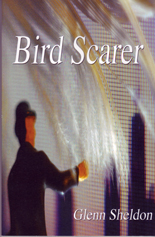 Bird Scarer by Glenn Sheldon
Bird Scarer by Glenn Sheldon
Červená Barva Press, 2008-
MARTHA COLLINS-Structurally and emotionally expansive, Bird Scarer covers more territory than most first books. Beginning as a displaced Bostonian who finds himself in Chicago, where a "terrible blankness fills my eye," Sheldon next moves into a more abstract landscape, where he finds a "permanent address" that is both actual and mental. Finally, he opens his emotional eye to the variety and vibrancy of Latin America, where his travels become the metaphorical basis for a "Geography of Desire." Though often playful, the book is carefully observant and edgily serious: "I'm alert," the poet says, "like a bus rider / with a drunk driver making up / the names of the streets." Metaphors like this, usually emerging from setting, as well as less easily defined conceits ("The anarchists' picnic is / a disaster: Where? Why? When?"), turn these well-grounded poems into delightfully non-linear narratives that keep the reader as alert as the poet.
SUSAN AZAR PORTERFIELD-I am impressed by Sheldon's form. Always the stanza, always very regular, tercets or quatrains, etc., which seems to suggest a kind of control as does his use of short lines as well as short sentences. It suggests a kind of control and even terseness, but what I like is his unexpected bloom or rush of thought and/or feeling that really comes through. In other words, he gets us to ride on this seemingly tidy little train, but then the journey takes us on a wilder ride than we anticipated. I like the surprise of that. I also like what I perceive to be his tone and voice. Quiet, a bit sardonic, but also heavily emotional, Bird Scarer is lovely.
JIM DANIELS-Bird Scarer is an impressive collection of poems. The voice is wise and mature. The structure of the book both clear and sophisticated. One of the things I look for in a book of poetry is an accumulation of momentum from beginning to end, and I found that here. The book creates interesting tensions in terms of place-the links between physical places and emotional landscapes are explored in all their complexities. Sheldon has a fresh voice-quirky and disarming, frank and witty. And always precise. I was struck by the consistent use of tight, packed language, and his careful use of the poetic line. I love the understated humor in many of the poems, and how he uses form to reinforce that humor. The depth and tonal richness of the comparisons seem effortless and natural, yet carry enormous weight in these poems. They roll through these poems, one after another, creating surprise, discovery, insight, throughout. And fun.
LUIS URREA-Glen Sheldon's earlier poetry is certainly filled with promise. We find a full voice in play. Perhaps the poems are shaded by his expertise in Thomas McGrath. Still, this influence does not in any way dull the poems' brio. It is as an American poet that Glenn Sheldon will ultimately be remembered (and revered). He will have a major career as a poet, as Bird Scarer reveals his full maturity and trajectory.
$14.00 | ISBN: 9780615171678 | 60 Pages | In Stock: 20
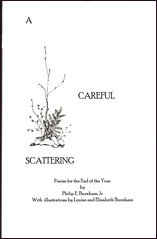 A Careful Scattering by Philip E. Burnham, Jr.
A Careful Scattering by Philip E. Burnham, Jr.
With illustrations by Louise and Elizabeth Burnham
Červená Barva Press, 2007-
Each year, for the forty-two Christmases of our married life, my wife, Louise Hassel Burnham, illustrated the poems I wrote to celebrate the festival season of the years’ ending and beginning, the Solstice, Christmas, and New Year. Her illustrations were in a variety of media: line drawings, block prints (both wood and vegetable), collage and paint. Many of the drawings represent views of our house in Newton, Massachusetts, including such details as the front door, a mirror in the hall, the fireplace. Others include the names and places of family and friends woven into trees. Louise’s final card, from 2001, is a gathering up of many earlier cards. While the original intent of these cards was to celebrate a single year, together they sum up our lives over four decades. We discussed their publication before her death, and it was she who chose the title, “A Careful Scattering.” In their publication I want to remember our partnership, and to dedicate this book to her memory with love.
$16.95 | ISBN 978-1-4357-0003-1 | 98 Pages | In Stock: 30
Home | Červená Barva Press Books | Poetry Chapbooks | Poetry Books | Anthologies | Fiction | Flash Fiction | Literary Journals | Non-fiction | Plays | Memoirs | Audio CD's
